The epic battle between Joe Frazier and Muhammad Ali

This story originally appeared in the Oct. 13, 1975 issue of Sports Illustrated. Subscribe to the magazine here.
It was only a moment, sliding past the eyes like the sudden shifting of light and shadow, but long years from now it will remain a pure and moving glimpse of hard reality, and if Muhammad Ali could have turned his eyes upon himself, what first and final truth would he have seen? He had been led up the winding, red-carpeted staircase by Imelda Marcos, the First Lady of the Philippines, as the guest of honor at the Malacañang Palace. Soft music drifted in from the terrace as the beautiful Imelda guided the massive and still heavyweight champion of the world to the long buffet ornamented by huge candelabra. The two whispered, and then she stopped and filled his plate, and as he waited the candles threw an eerie light across the face of a man who only a few hours before had survived the ultimate inquisition of himself and his art.
The maddest of existentialists, one of the great surrealists of our time, the king of all he sees, Ali had never before appeared so vulnerable and fragile, so pitiably unmajestic, so far from the universe he claims as his alone. He could barely hold his fork, and he lifted the food slowly up to his bottom lip, which had been scraped pink. The skin on his face was dull and blotched, his eyes drained of that familiar childlike wonder. His right eye was a deep purple, beginning to close, a dark blind being drawn against a harsh light. He chewed his food painfully, and then he suddenly moved away from the candles as if he had become aware of the mask he was wearing, as if an inner voice were laughing at him. He shrugged, and the moment was gone.
A couple of miles away in the bedroom of a villa, the man who has always demanded answers of Ali, has trailed the champion like a timber wolf, lay in semi-darkness. Only his heavy breathing disturbed the quiet as an old friend walked to within two feet of him. "Who is it?" asked Joe Frazier, lifting himself to look around. "Who is it? I can't see! I can't see! Turn the lights on!" Another light was turned on, but Frazier still could not see. The scene cannot be forgotten; this good and gallant man lying there, embodying the remains of a will never before seen in a ring, a will that had carried him so far—and now surely too far. His eyes were only slits, his face looked as if it had been painted by Goya. "Man, I hit him with punches that'd bring down the walls of a city," said Frazier. "Lawdy, Lawdy, he's a great champion." Then he put his head back down on the pillow, and soon there was only the heavy breathing of a deep sleep slapping like big waves against the silence.
Time may well erode that long morning of drama in Manila, but for anyone who was there those faces will return again and again to evoke what it was like when two of the greatest heavyweights of any era met for a third time, and left millions limp around the world. Muhammad Ali caught the way it was: "It was like death. Closest thing to dyin' that I know of."
Ali's version of death began about 10:45 a.m. on Oct. 1 in Manila. Up to then his attitude had been almost frivolous. He would simply not accept Joe Frazier as a man or as a fighter, despite the bitter lesson Frazier had given him in their first savage meeting. Esthetics govern all of Ali's actions and conclusions; the way a man looks, the way he moves is what interests Ali. By Ali's standards, Frazier was not pretty as a man and without semblance of style as a fighter. Frazier was an affront to beauty, to Ali's own beauty as well as to his precious concept of how a good fighter should move. Ali did not hate Frazier, but he viewed him with the contempt of a man who cannot bear anything short of physical and professional perfection.
From The Vault: Every Ali Cover Story
- Cassius invades Britain
- My $1,000,000 Getaway
- Cassius—His Fight And His Future
- The Big Fight: Can Clay Do It Again?
- Cassius Clay vs. Sonny Liston
- The Fight You Didn't See
- The Big Fight: Clay vs. Patterson
- Cassius Clay: The Man, the Muslim, the Mystery
- The Big Fight: Clay vs. Terrell
- Scramble for Ali's title
- Ali-Clay; the once and future king?
- The Slugger And The Boxer
- End of the Ali legend
- The future is a mist
- The Jaw is broken
- Ali Again
- Muhammad Ali: Sportsman of the Year
- Boxing's New Barnum
- The Epic Battle
- Ali's Road Show Rolls On
- Ali's Desperate Hour
- The Champ Again
- Look Who's Back!
- He's no Liston. He's no Frazier.
- The Last Hurrah
- The man and his entourage today
- 35th anniversary
- Once and Forever
- Battle of Champions: Ali vs. Frazier
- Who's that guy with Howard Bingham?
Right up until the bell rang for Round One, Ali was dead certain that Frazier was through, was convinced that he was no more than a shell, that too many punches to the head had left Frazier only one more solid shot removed from a tin cup and some pencils. "What kind of man can take all those punches to the head?" he asked himself over and over. He could never come up with an answer. Eventually he dismissed Frazier as the embodiment of animal stupidity. Before the bell Ali was subdued in his corner, often looking down to his manager, Herbert Muhammad, and conversing aimlessly. Once, seeing a bottle of mineral water in front of Herbert, he said, "Watcha got there, Herbert? Gin! You don't need any of that. Just another day's work. I'm gonna put a whuppin' on this nigger's head."
Across the ring Joe Frazier was wearing trunks that seemed to have been cut from a farmer's overalls. He was darkly tense, bobbing up and down as if trying to start a cold motor inside himself. Hatred had never been a part of him, but words like "gorilla," "ugly," "ignorant"—all the cruelty of Ali's endless vilifications—had finally bitten deeply into his soul. He was there not seeking victory alone; he wanted to take Ali's heart out and then crush it slowly in his hands. One thought of the moment days before, when Ali and Frazier with their handlers between them were walking out of the Malacañang Palace, and Frazier said to Ali, leaning over and measuring each word, "I'm gonna whup your half-breed ass."
By packed and malodorous Jeepneys, by small and tinny taxis, by limousine and by worn-out bikes, 28,000 had made their way into the Philippine Coliseum. The morning sun beat down, and the South China Sea brought not a whisper of wind. The streets of the city emptied as the bout came on public television. At ringside, even though the arena was air-conditioned, the heat wrapped around the body like a heavy wet rope. By now, President Ferdinand Marcos, a small brown derringer of a man, and Imelda, beautiful and cool as if she were relaxed on a palace balcony taking tea, had been seated.
True to his plan, arrogant and contemptuous of an opponent's worth as never before, Ali opened the fight flat-footed in the center of the ring, his hands whipping out and back like the pistons of an enormous and magnificent engine. Much broader than he has ever been, the look of swift destruction defined by his every move, Ali seemed indestructible. Once, so long ago, he had been a splendidly plumed bird who wrote on the wind a singular kind of poetry of the body, but now he was down to earth, brought down by the changing shape of his body, by a sense of his own vulnerability, and by the years of excess. Dancing was for a ballroom; the ugly hunt was on. Head up and unprotected, Frazier stayed in the mouth of the cannon, and the big gun roared again and again.
Frazier's legs buckled two or three times in that first round, and in the second he took more lashing as Ali loaded on him all the meanness that he could find in himself. "He won't call you Clay no more," Bundini Brown, the spirit man, cried hoarsely from the corner. To Bundini, the fight would be a question of where fear first registered, but there was no fear in Frazier. In the third round Frazier was shaken twice, and looked as if he might go at any second as his head jerked up toward the hot lights and the sweat flew off his face. Ali hit Frazier at will, and when he chose to do otherwise he stuck his long left arm in Frazier's face. Ali would not be holding in this bout as he had in the second. The referee, a brisk workman, was not going to tolerate clinching. If he needed to buy time, Ali would have to use his long left to disturb Frazier's balance.
A hint of shift came in the fourth. Frazier seemed to be picking up the beat, his threshing-blade punches started to come into range as he snorted and rolled closer. "Stay mean with him, champ!" Ali's corner screamed. Ali still had his man in his sights, and whipped at his head furiously. But at the end of the round, sensing a change and annoyed, he glared at Frazier and said, "You dumb chump, you!" Ali fought the whole fifth round in his own corner. Frazier worked his body, the whack of his gloves on Ali's kidneys sounding like heavy thunder. "Get out of the goddamn corner," shouted Angelo Dundee, Ali's trainer. "Stop playin'," squawked Herbert Muhammad, wringing his hands and wiping the mineral water nervously from his mouth. Did they know what was ahead?
Came the sixth, and here it was, that one special moment that you always look for when Joe Frazier is in a fight. Most of his fights have shown this: you can go so far into that desolate and dark place where the heart of Frazier pounds, you can waste his perimeters, you can see his head hanging in the public square, may even believe that you have him, but then suddenly you learn that you have not. Once more the pattern emerged as Frazier loosed all of the fury, all that has made him a brilliant heavyweight. He was in close now, fighting off Ali's chest, the place where he has to be. His old calling card—that sudden evil, his left hook—was working the head of Ali. Two hooks ripped with slaughterhouse finality at Ali's jaw, causing Imelda Marcos to look down at her feet, and the President to wince as if a knife had been stuck in his back. Ali's legs seemed to search for the floor. He was in serious trouble, and he knew that he was in no-man's-land.
Whatever else might one day be said about Muhammad Ali, it should never be said that he is without courage, that he cannot take a punch. He took those shots by Frazier, and then came out for the seventh, saying to him, "Old Joe Frazier, why I thought you were washed up." Joe replied, "Somebody told you all wrong, pretty boy."
Frazier's assault continued. By the end of the 10th round it was an even fight. Ali sat on his stool like a man ready to be staked out in the sun. His head was bowed, and when he raised it his eyes rolled from the agony of exhaustion. "Force yourself, champ!" his corner cried. "Go down to the well once more!" begged Bundini, tears streaming down his face. "The world needs ya, champ!" In the 11th, Ali got trapped in Frazier's corner, and blow after blow bit at his melting face, and flecks of spittle flew from his mouth. "Lawd have mercy!" Bundini shrieked.
The world held its breath. But then Ali dug deep down into whatever it is that he is about, and even his severest critics would have to admit that the man-boy had become finally a man. He began to catch Frazier with long right hands, and blood trickled from Frazier's mouth. Now, Frazier's face began to lose definition; like lost islands reemerging from the sea, massive bumps rose suddenly around each eye, especially the left. His punches seemed to be losing their strength. "My God," wailed Angelo Dundee. "Look at 'im. He ain't got no power, champ!" Ali threw the last ounces of resolve left in his body in the 13th and 14th. He sent Frazier's bloody mouthpiece flying into the press row in the 13th, and nearly floored him with a right in the center of the ring. Frazier was now no longer coiled. He was up high, his hands down, and as the bell for the 14th round sounded, Dundee pushed Ali out saying, "He's all yours!" And he was, as Ali raked him with nine straight right hands. Frazier was not picking up the punches, and as he returned to his corner at the round's end the Filipino referee guided his great hulk part of the way.
"Joe," said his manager, Eddie Futch, "I'm going to stop it."
"No, no, Eddie, ya can't do that to me," Frazier pleaded, his thick tongue barely getting the words out. He started to rise.
"You couldn't see in the last two rounds," said Futch. "What makes ya think ya gonna see in the 15th?"
"I want him, boss," said Frazier.
"Sit down, son," said Futch, pressing his hand on Frazier's shoulder. "It's all over. No one will ever forget what you did here today."
And so it will be, for once more had Frazier taken the child of the gods to hell and back. After the fight Futch said: "Ali fought a smart fight. He conserved his energy, turning it off when he had to. He can afford to do it because of his style. It was mainly a question of anatomy, that is all that separates these two men. Ali is now too big, and when you add those long arms, well...Joe has to use constant pressure, and that takes its toll on a man's body and soul." Dundee said: "My guy sucked it up and called on everything he had. We'll never see another one like him." Ali took a long time before coming down to be interviewed by the press, and then he could only say, "I'm tired of bein' the whole game. Let other guys do the fightin'. You might never see Ali in the ring again."
In his suite the next morning he talked quietly. "I heard somethin' once," he said. "When somebody asked a marathon runner what goes through his mind in the last mile or two, he said that you ask yourself why am I doin' this. You get so tired. It takes so much out of you mentally. It changes you. It makes you go a little insane. I was thinkin' that at the end. Why am I doin' this? What am I doin' here in against this beast of a man? It's so painful. I must be crazy. I always bring out the best in the men I fight, but Joe Frazier, I'll tell the world right now, brings out the best in me. I'm gonna tell ya, that's one helluva man, and God bless him."
SI's 100 Greatest Photos of Muhammad Ali
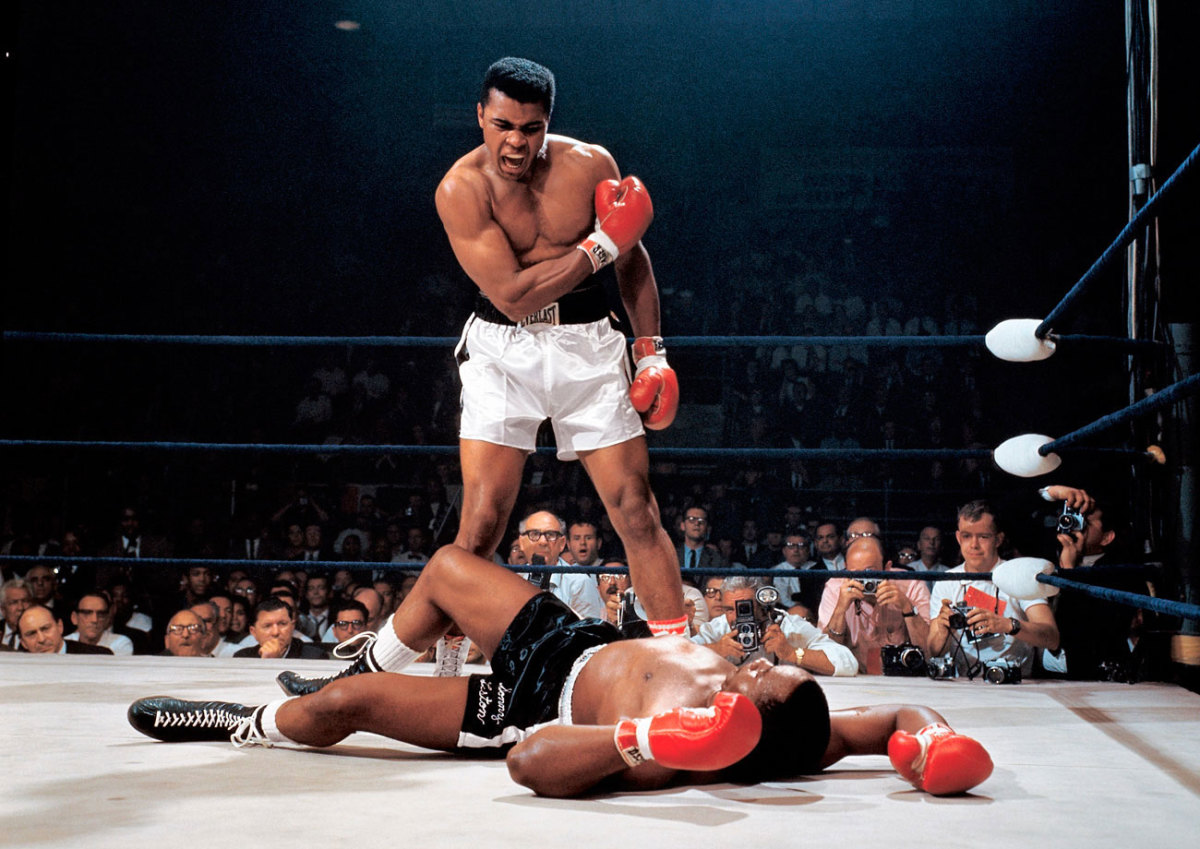
In one of the most iconic and controversial moments of his career, Ali stands over Sonny Liston and yells at him after knocking the former champ down in the first round of their 1965 rematch. Skeptics dubbed it "the Phantom Punch," but films show Ali's flashing right caught Liston flush, knocking him to the canvas. Refusing to go to a neutral corner, Ali stood over Liston and told him to "get up and fight, sucker."
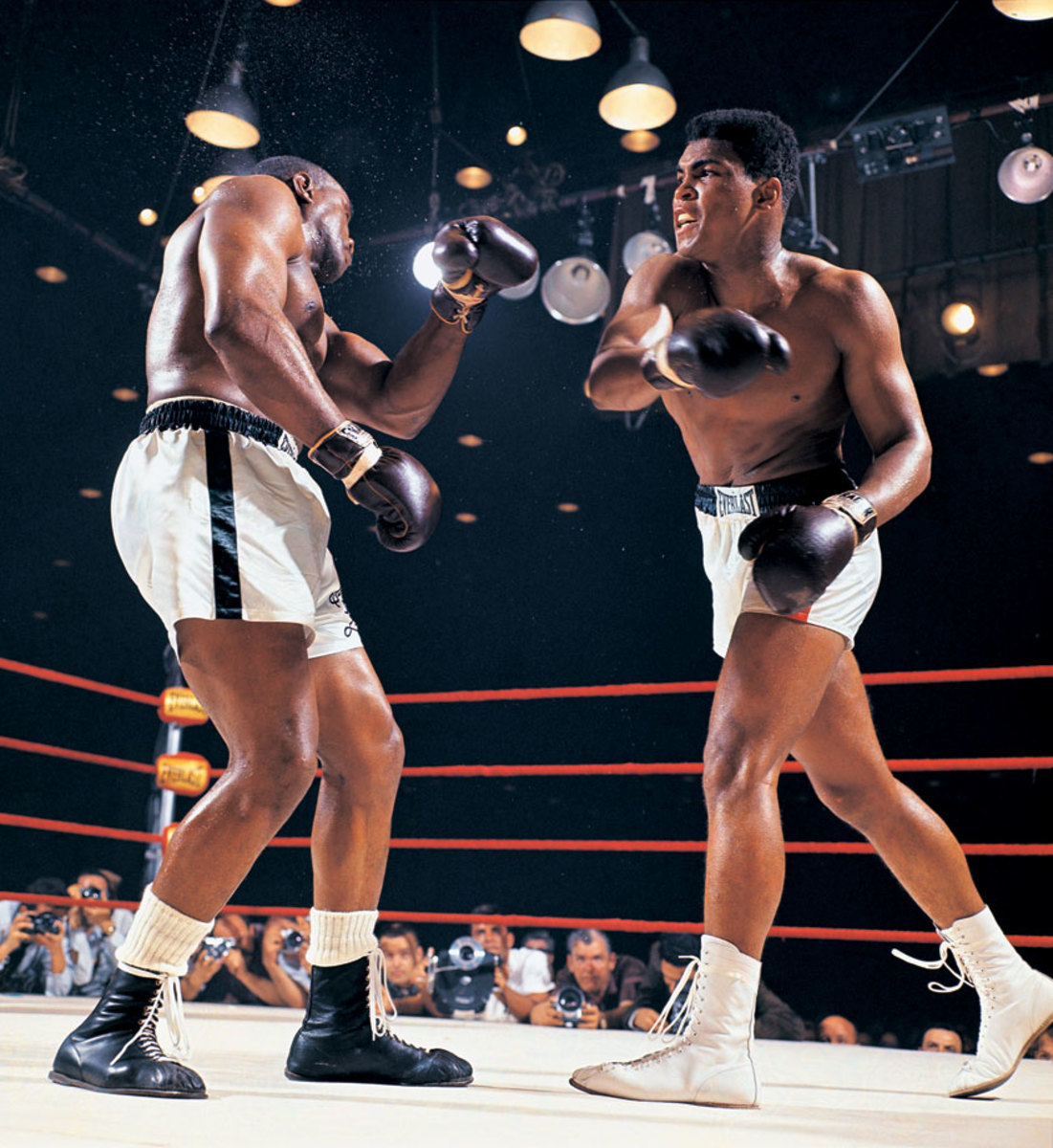
At 22-years-old, Cassius Clay (Muhammad Ali) battered the heavily favored Sonny Liston in a bout that shook the boxing world. The fight ignited the career of one of sports' most charismatic and controversial figures, whose bouts often became social and political events rather than simply sports contests. At the peak of his fame, Muhammad Ali was the best known athlete in the world. Liston, one of the most feared heavyweight champions in history, was a 1-8 favorite over the young challenger known as the Louisville Lip. But Clay, here stinging the champ with a right, used his dazzling speed and constant movement to dominate the action and pile up points.
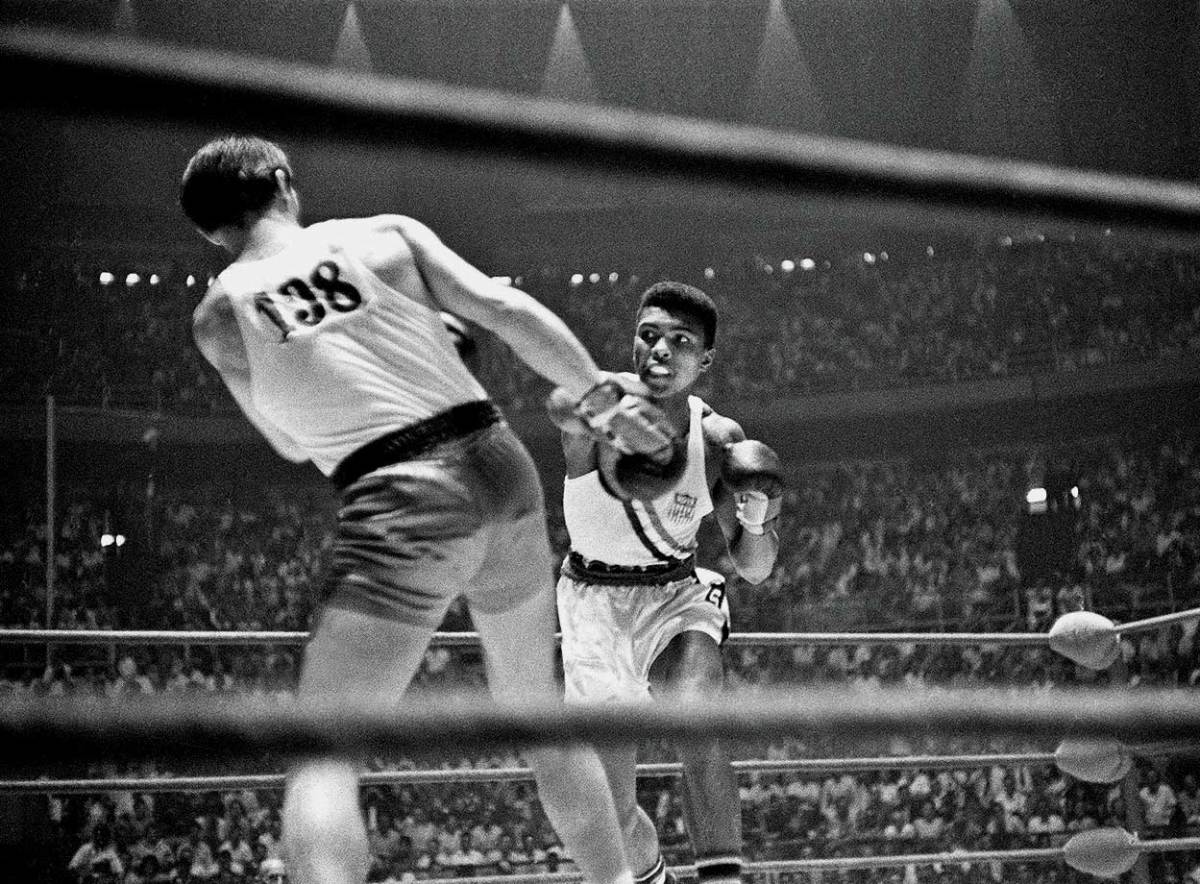
Cassius Clay punches Zbigniew Pietrzykowski of Poland during their gold medal bout at the 1960 Rome Olympics. Clay defeated Pietrzykowski 5-0 for the light heavyweight gold medal.
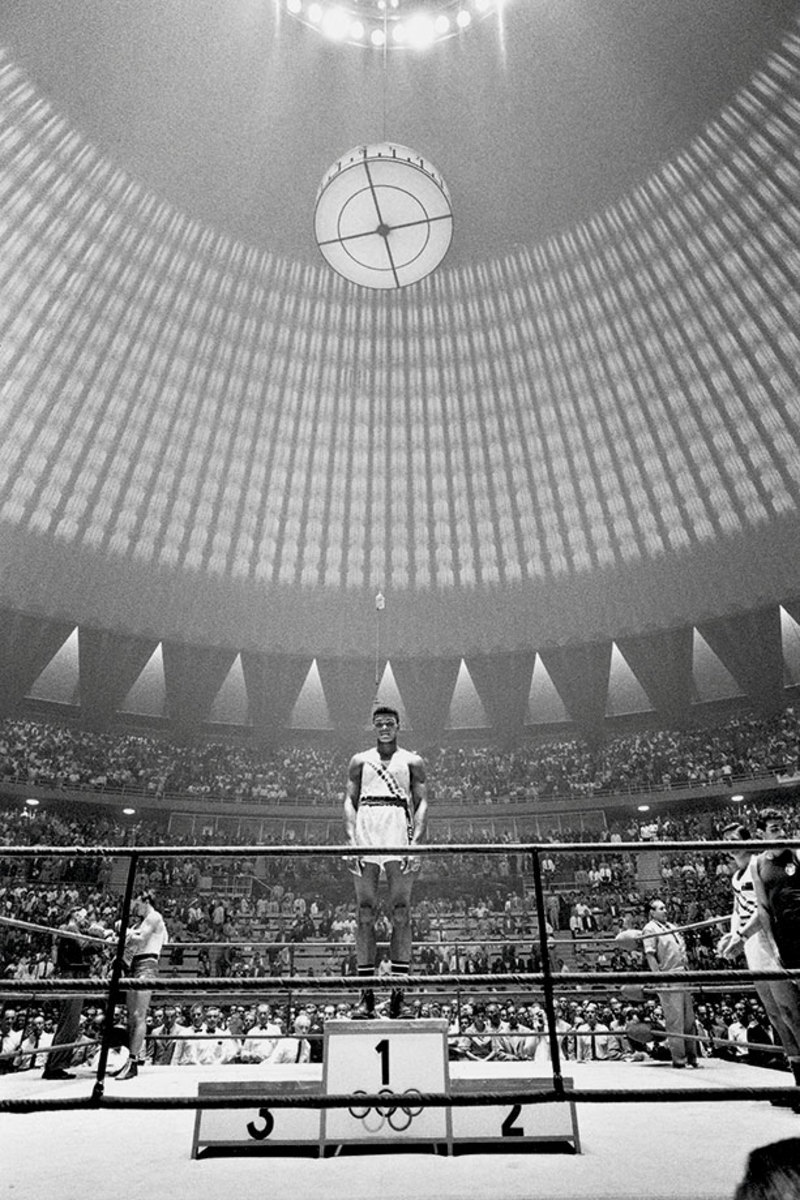
For the 18-year-old from Louisville, here atop the medal stand after his Olympic victory, all roads led from Rome. Clay finished his amateur career with a record of 100-5 and made his professional debut two months after the Games.
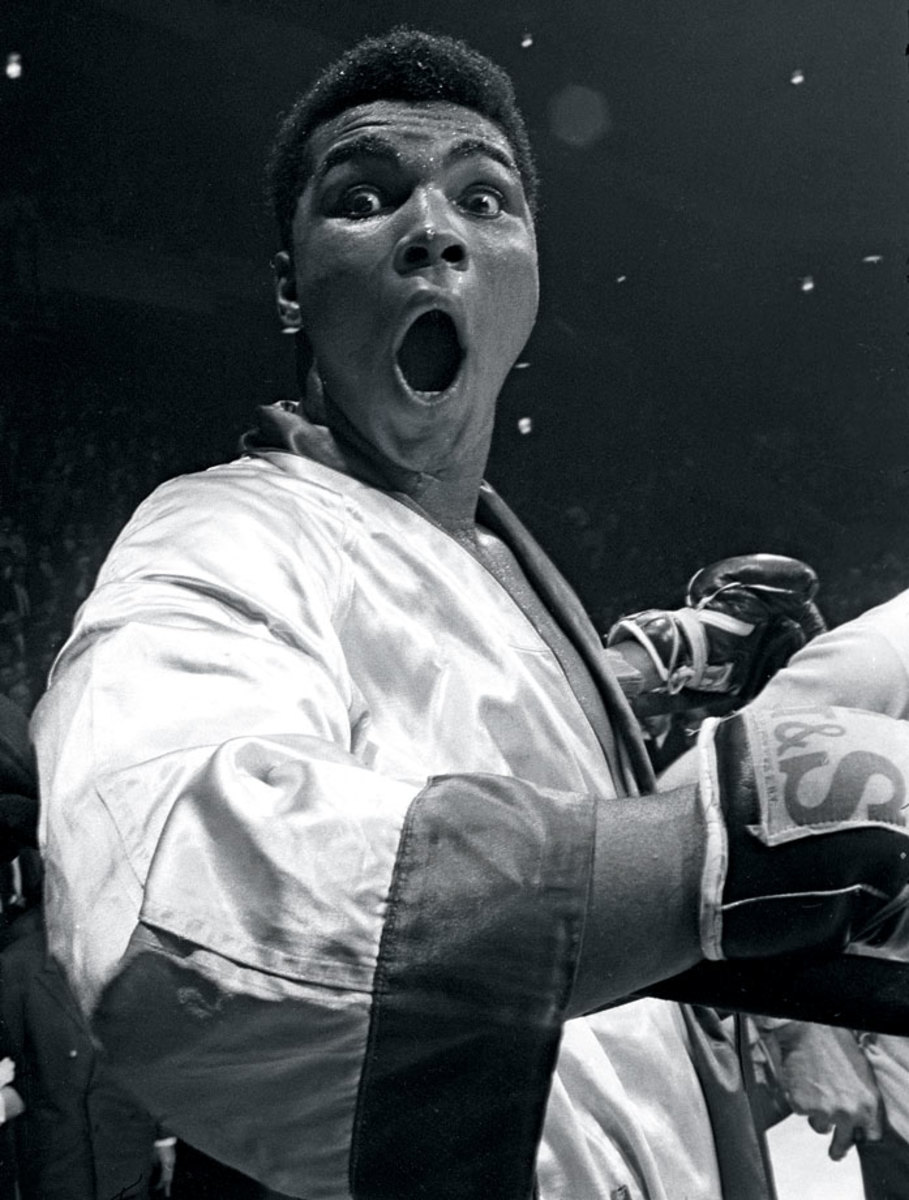
Undefeated in his first 17 pro fights, Clay mugged for the camera before the start of his 1963 bout against Doug Jones in Madison Square Garden.
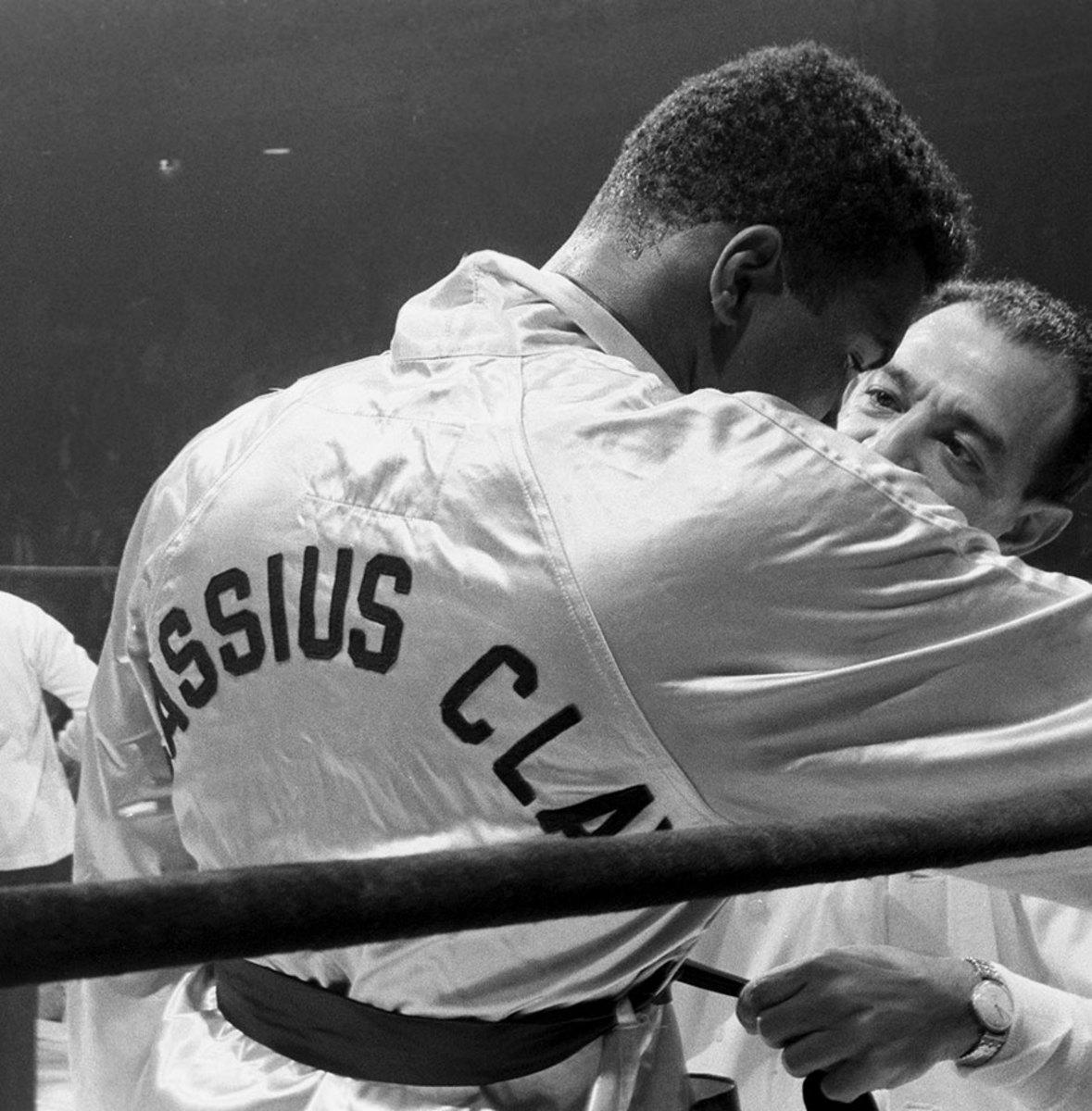
Trainer Angelo Dundee urged his young charge to get serious before the opening bell against Jones. Clay followed instructions and emerged from a tough fight with a unanimous decision victory. Three months later he would stop Henry Cooper and close out 1963 at 19-0.
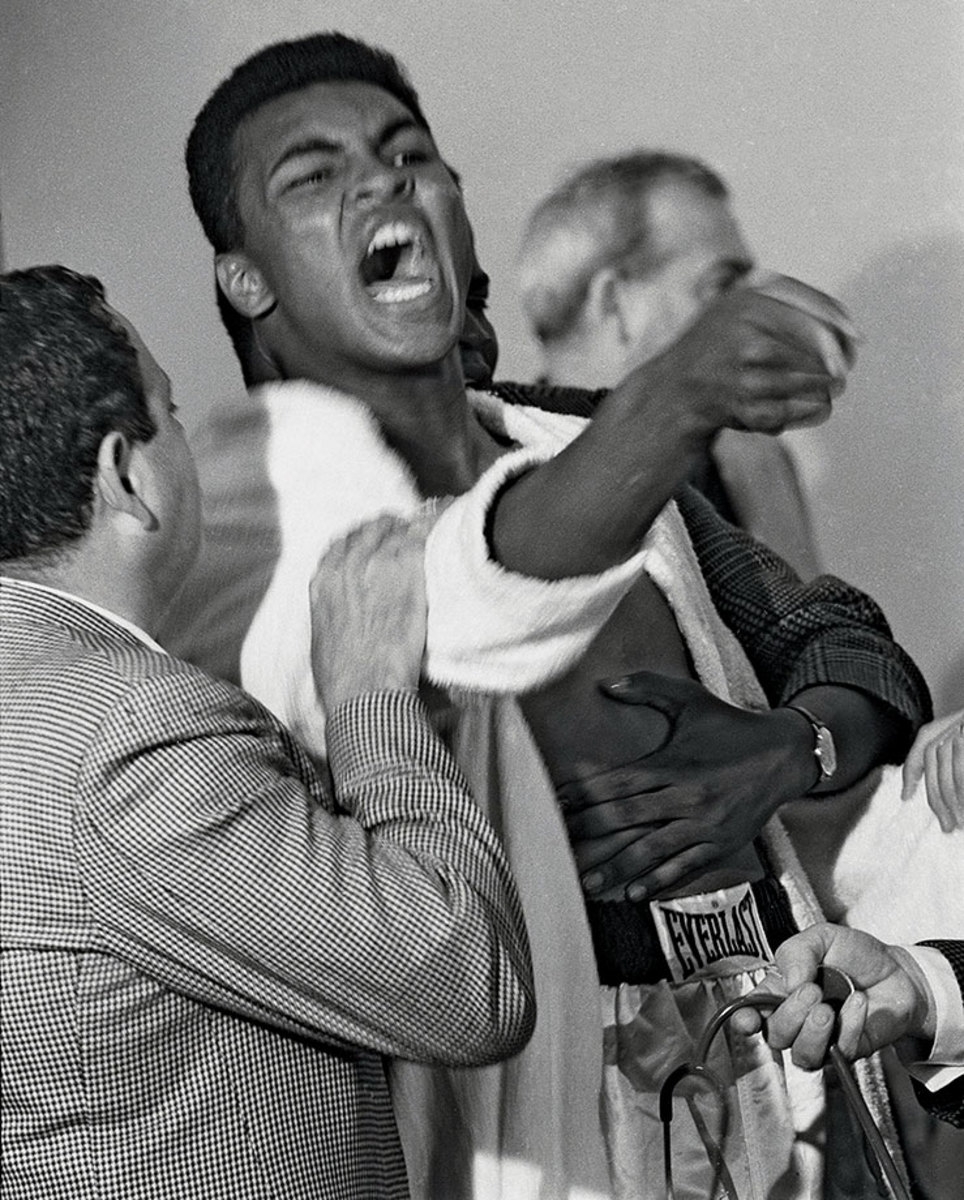
A seemingly hysterical Clay taunted Sonny Liston during the pre-fight physical for their 1964 bout. He had consistently baited the Big Bear during the lead-up to the fight, saying he was going to "use him as a bearskin rug ... after I whup him." The Miami Boxing Commission would fine Clay $2,500 for his outburst at the physical.
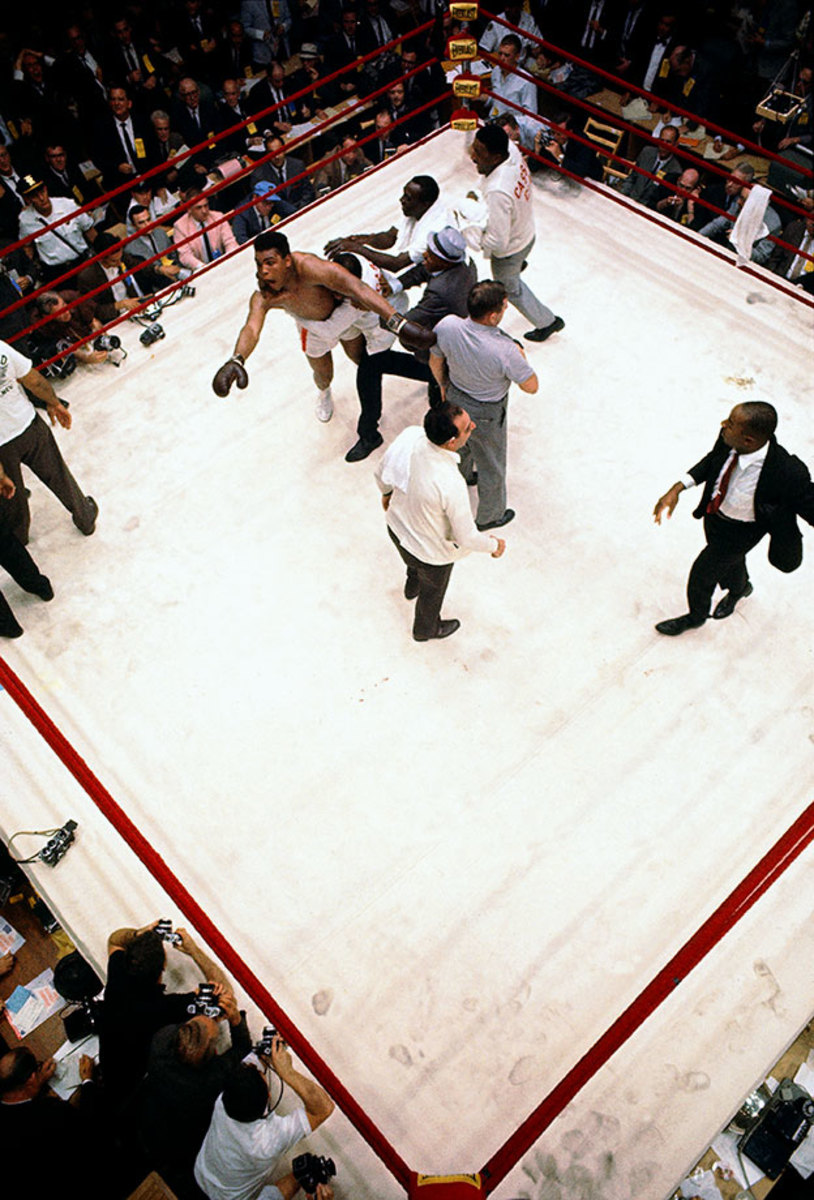
"I shook up the world!" an emotional Clay hollered to ringside reporters after his shocking defeat of Liston. And he did just that, claiming the heavyweight title at age 21 after a clearly beaten Liston, complaining of a shoulder injury, failed to answer the bell for the seventh round.
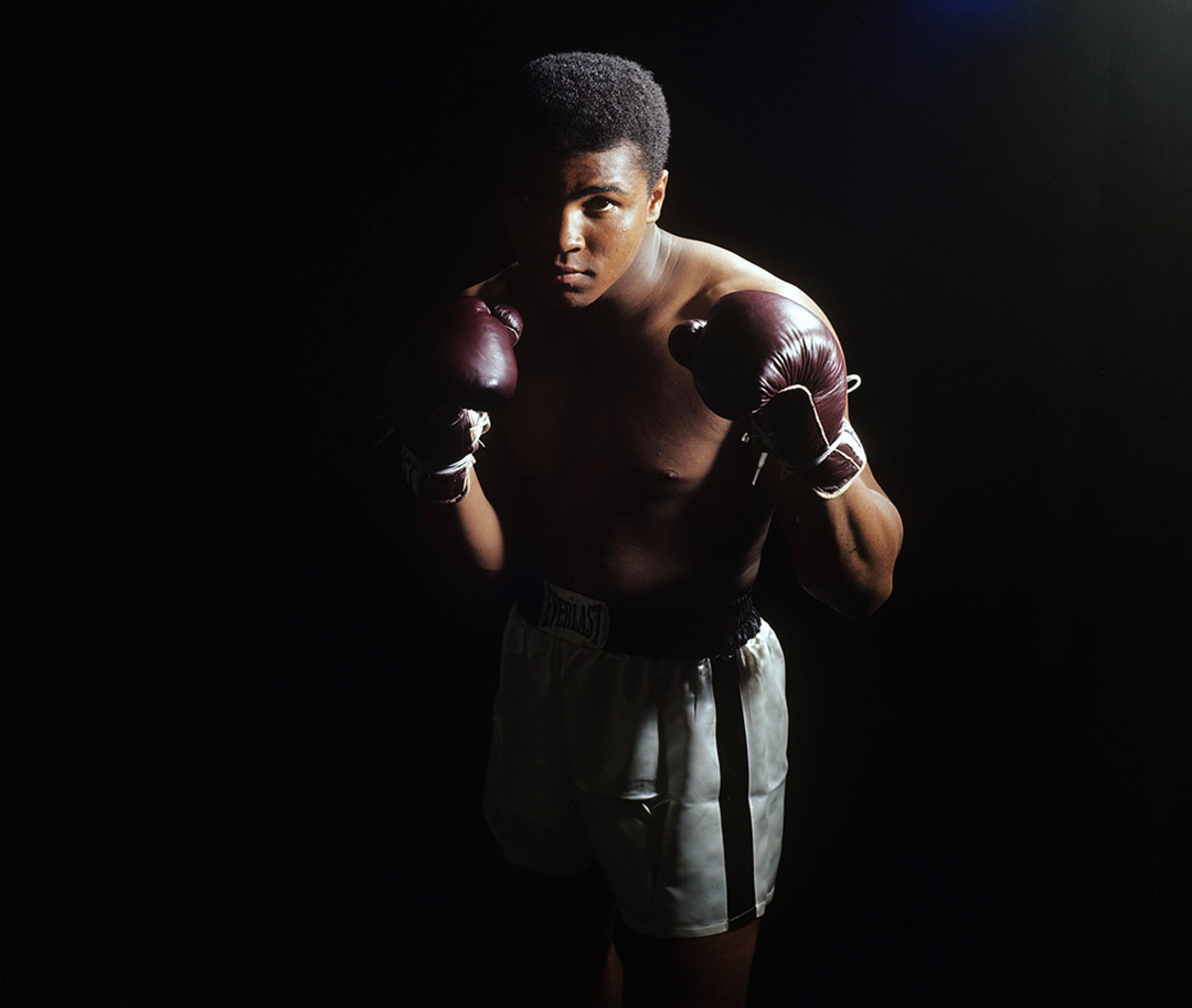
Draped in shadow, the young king — now known as Muhammad Ali — stared down the camera during a photo shoot in April 1965, one month before his rematch against Sonny Liston.
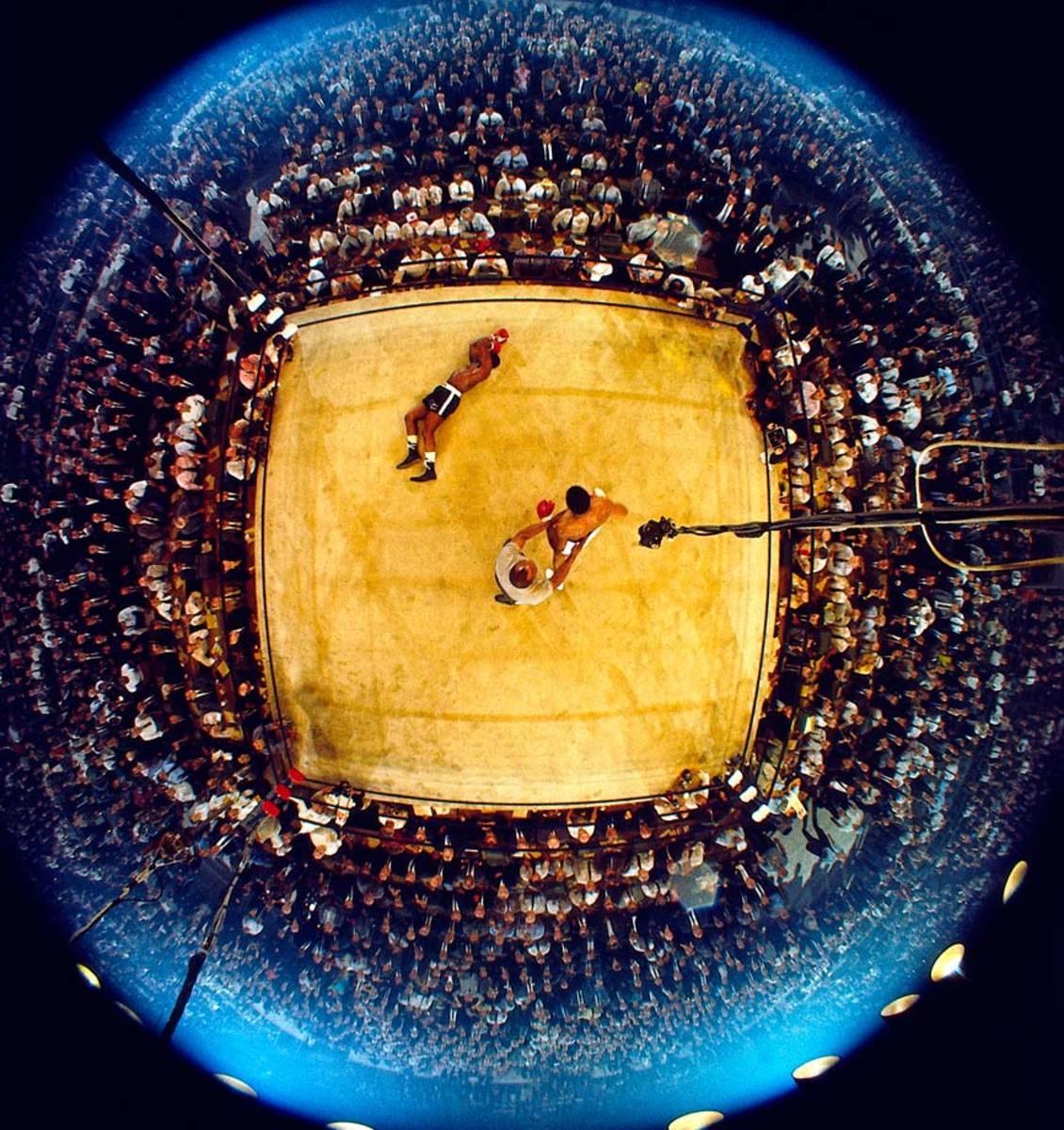
As Liston lingered on the canvas and the referee, former heavyweight champ Jersey Joe Walcott, tried to control Ali, the 2,434 spectators on hand in the Lewiston, Me., hockey arena — a record low for a heavyweight championship fight — tried to make sense of what all that had happened in less than two minutes after the opening bell.
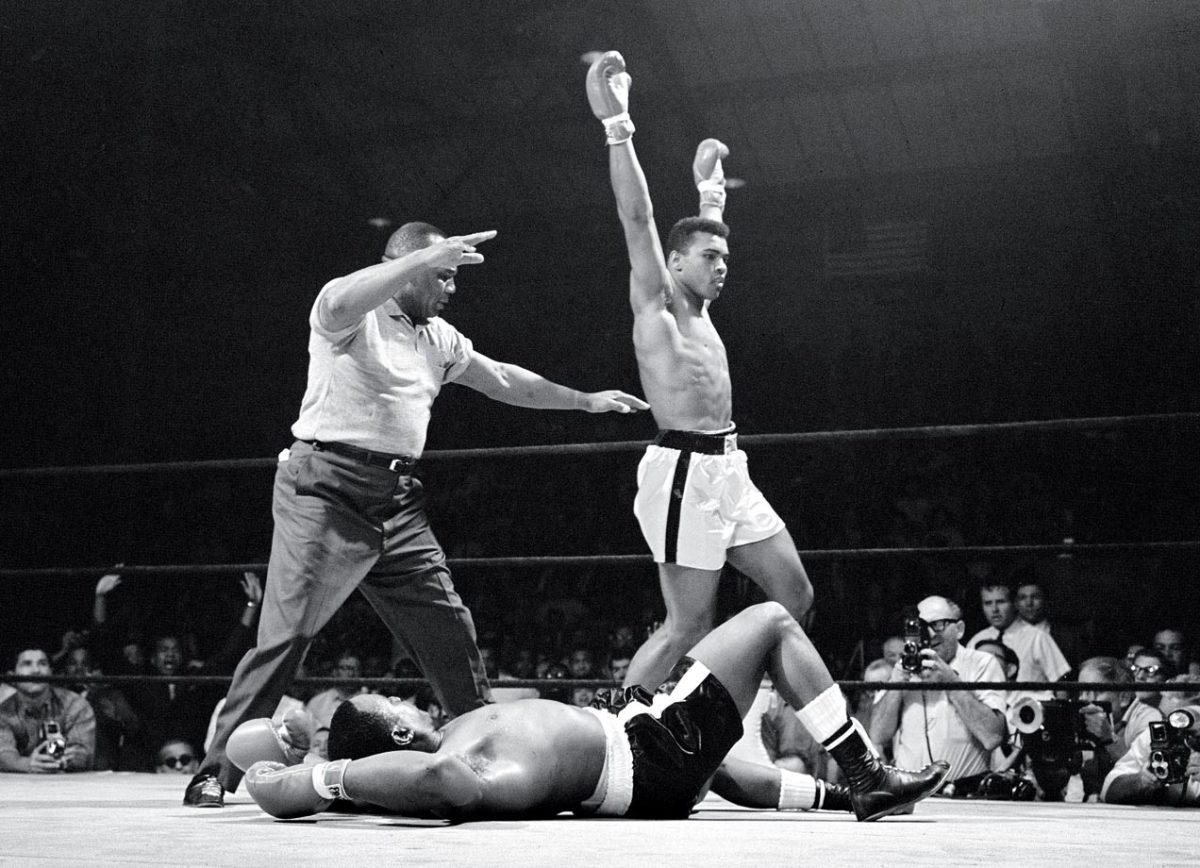
The celebration over Liston continued. In a chaotic ending, Ali was awarded a knockout when Nat Fleischer, publisher of The Ring, informed referee Jersey Joe Walcott from ringside that Liston had been on the canvas for longer than 10 seconds after Ali knocked him down. The bout remains one of the most controversial in boxing history, with many observers insisting that Liston took a dive.
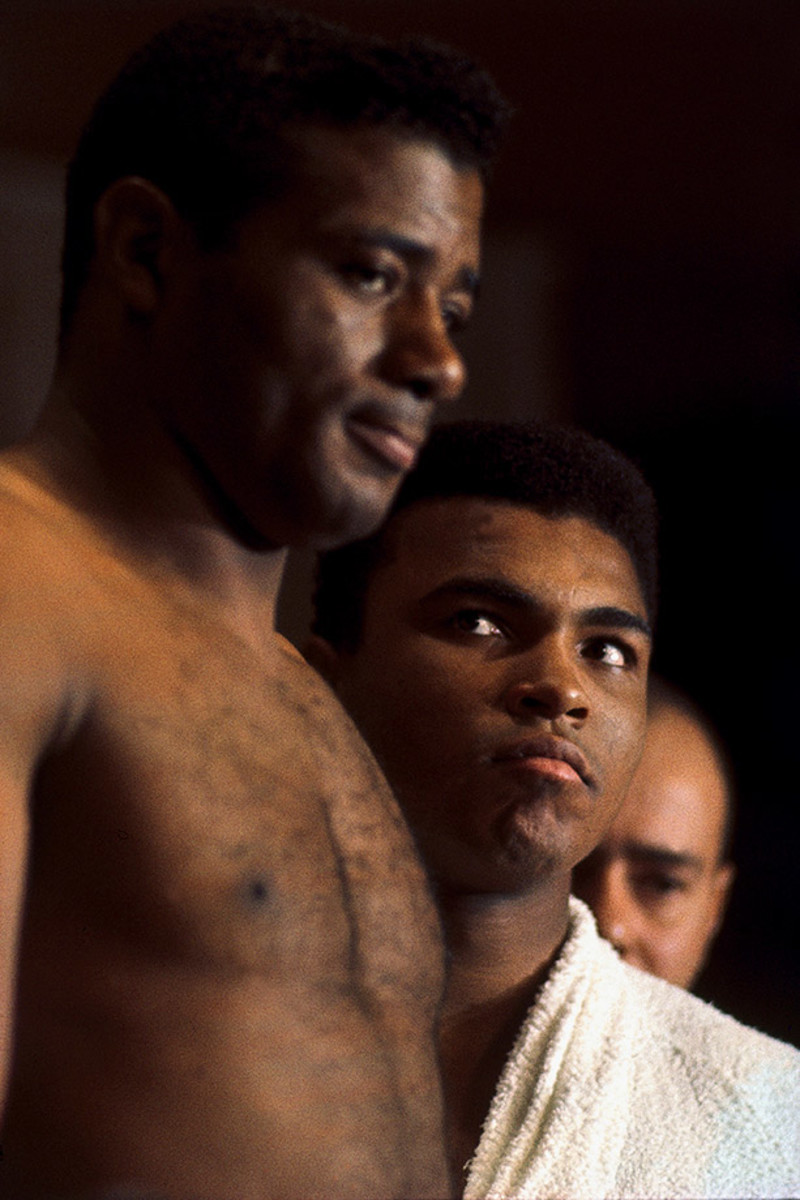
Ali's second title defense came in November 1965, against former two-time heavyweight champion Floyd Patterson. During the build-up to the bout, the normally soft-spoken Patterson earned the new champ's wrath by refusing to call Ali by his Muslim name. At the weigh-in, Ali's glare made it clear that he intended Patterson to pay for the disrespect.
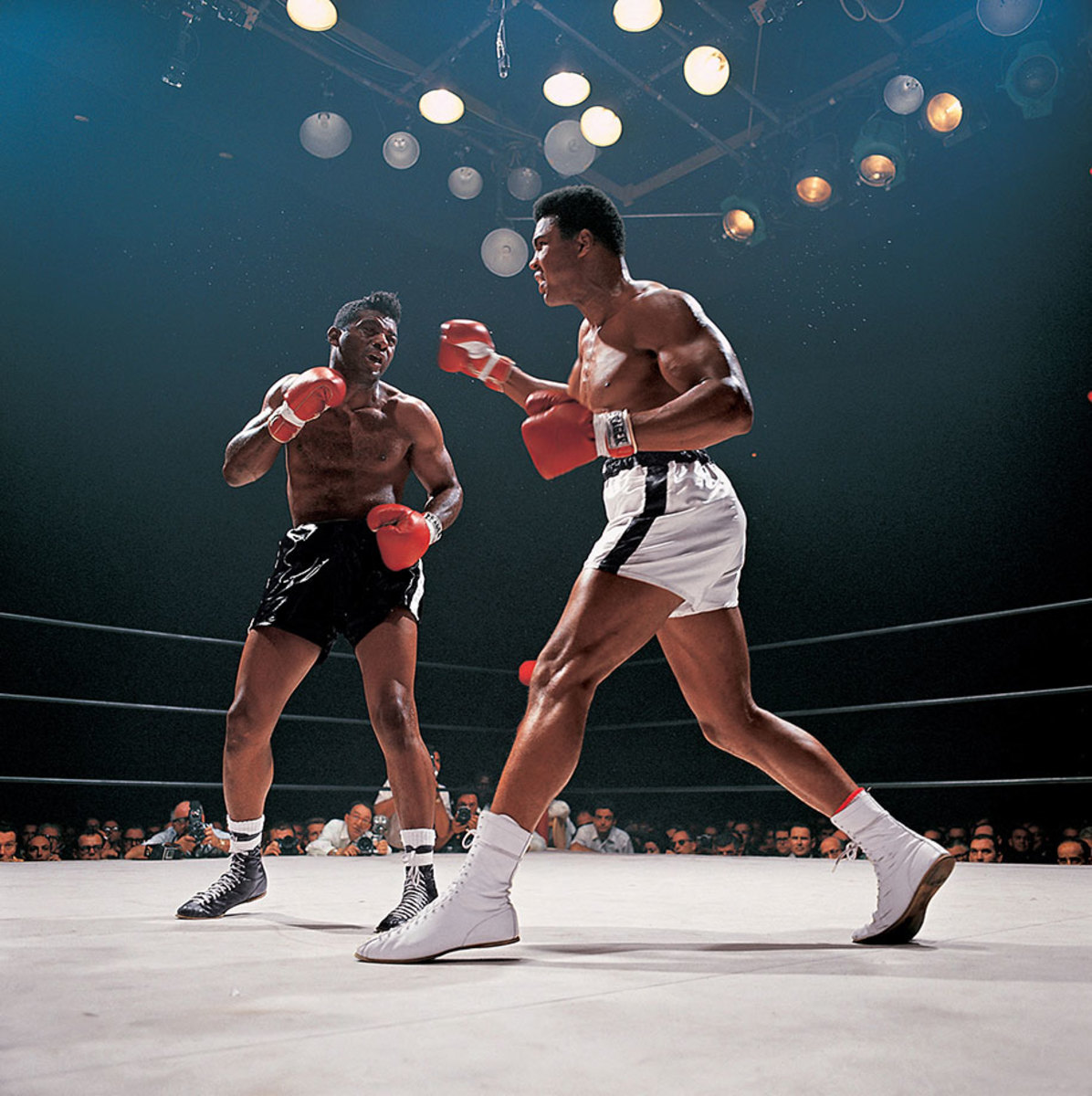
In cruelly efficient performance, Ali punished Patterson — who was hobbled by a painful back injury — seemingly toying with the former champ throughout the bout, hitting him at will and calling, "What's my name?" before finally winning on a 12th-round TKO.
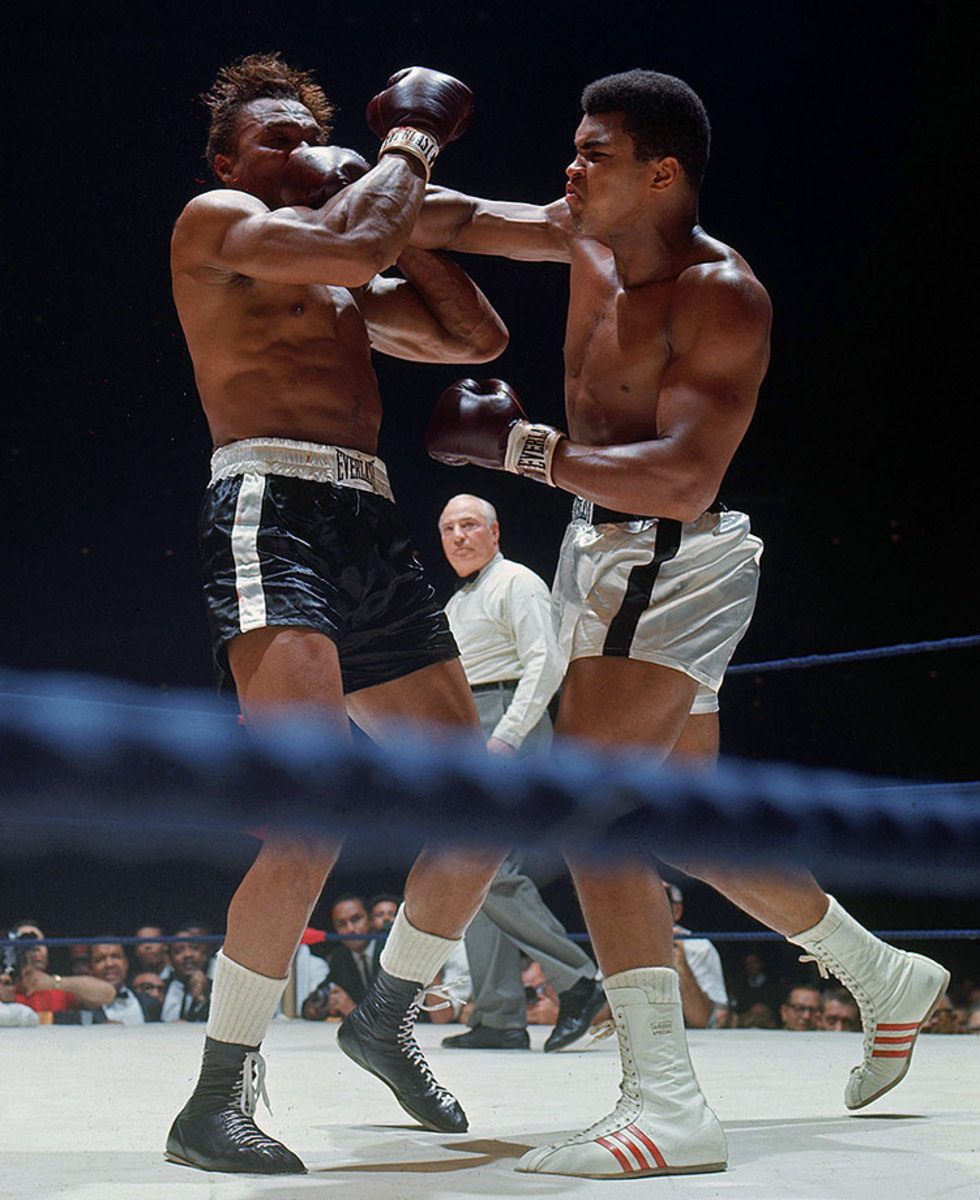
Capping off a five-fight campaign in 1966, Ali faced Cleveland Williams in the Houston Astrodome on Nov. 14. Known as the Big Cat, the heavily-muscled Williams was a power puncher who had racked up 51 knockouts in 71 fights. But he was also 33, barely recovered from a gunshot wound sustained the year before, and up against a young champion very much in his prime. Ali wasted little time in unleashing a withering attack.
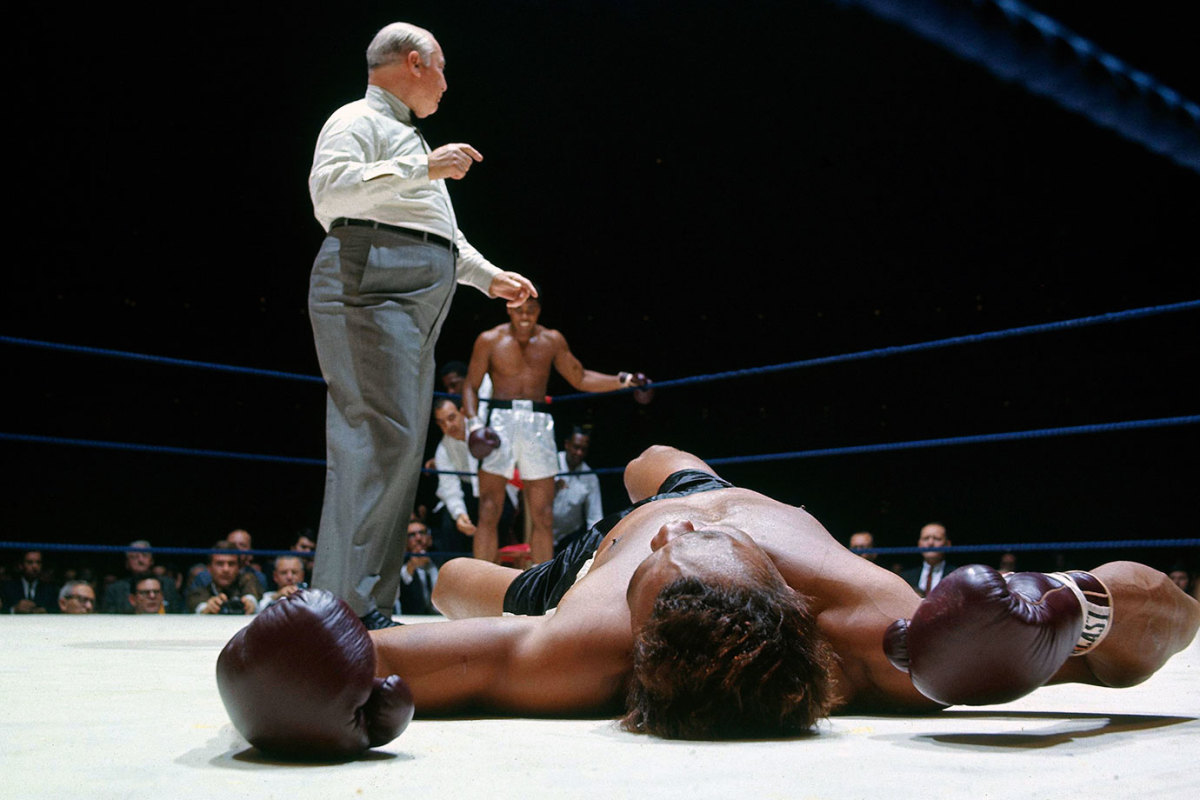
Float and sting: In a display of speed and combination punching unmatched in heavyweight history, Ali overwhelmed Williams from the start. The challenger, here down for the third time in round 2, would be saved by the bell before referee Harry Kessler could count him out, but it would only postpone the inevitable.
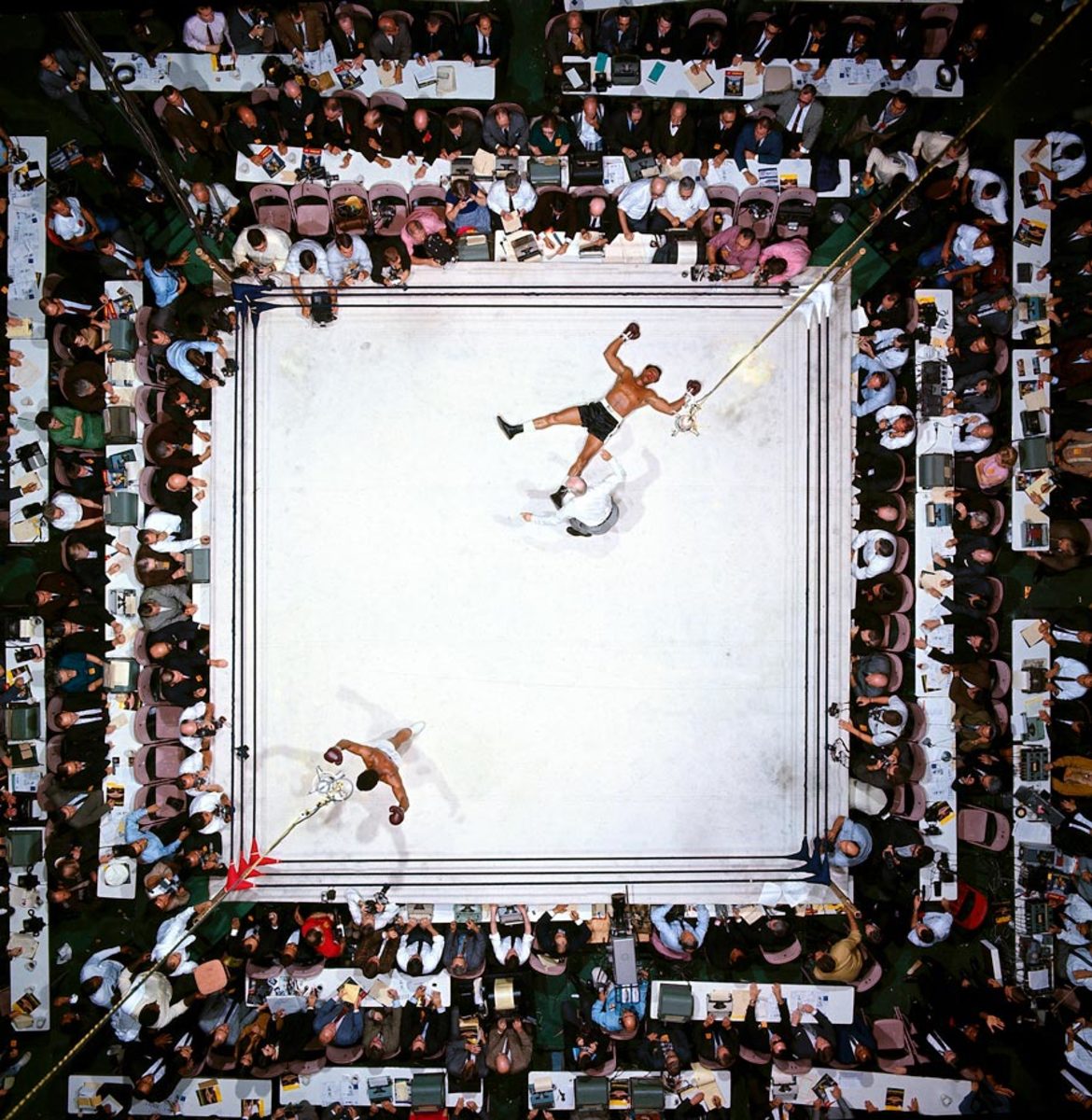
Ali dropped Williams again early in the third round, and Kessler waved the mismatch over at 1:08 of the third.
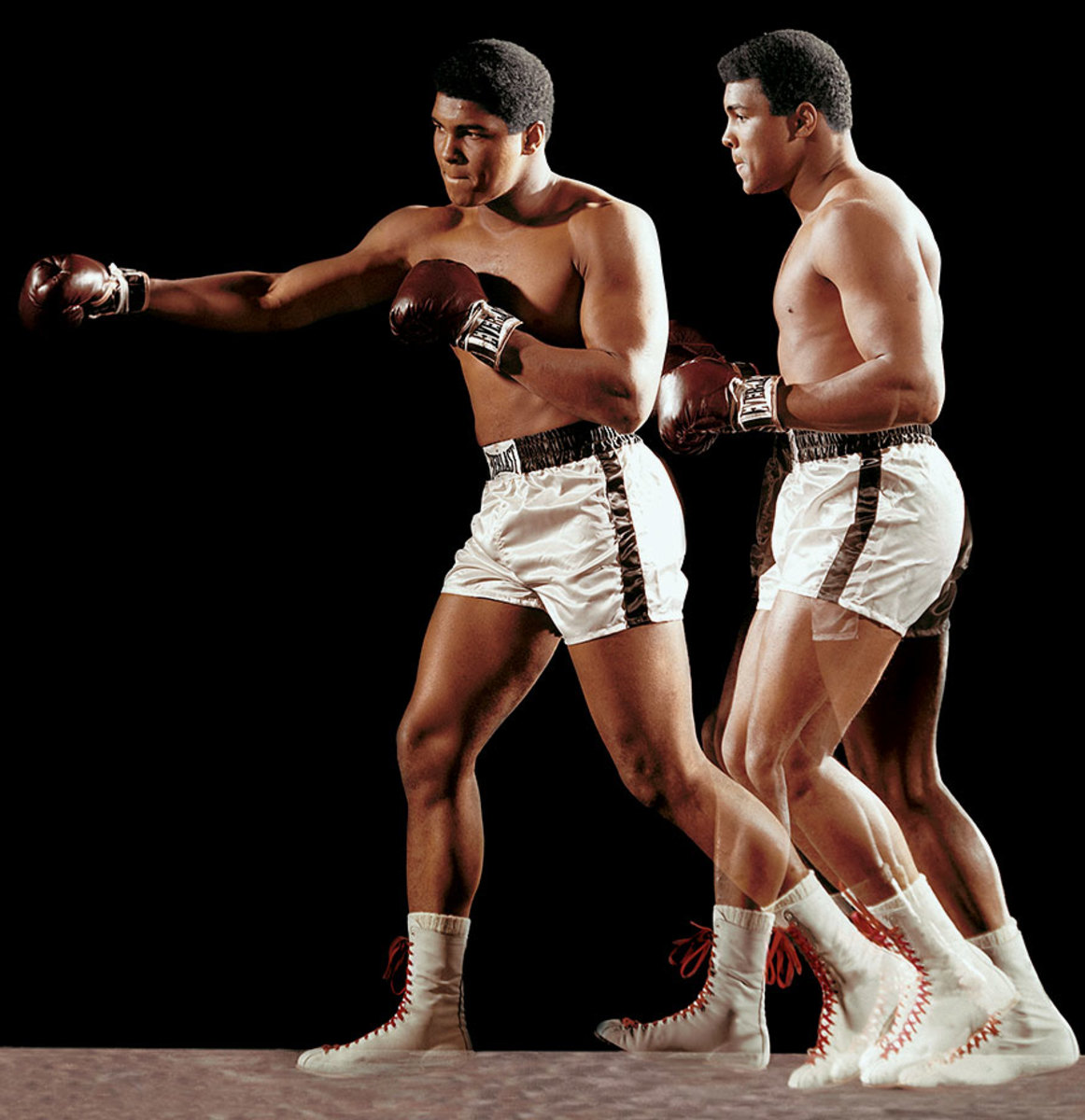
In a multiple-exposure portrait, Ali demonstrates his signature double-clutch shuffle during a photo shoot in December 1966.
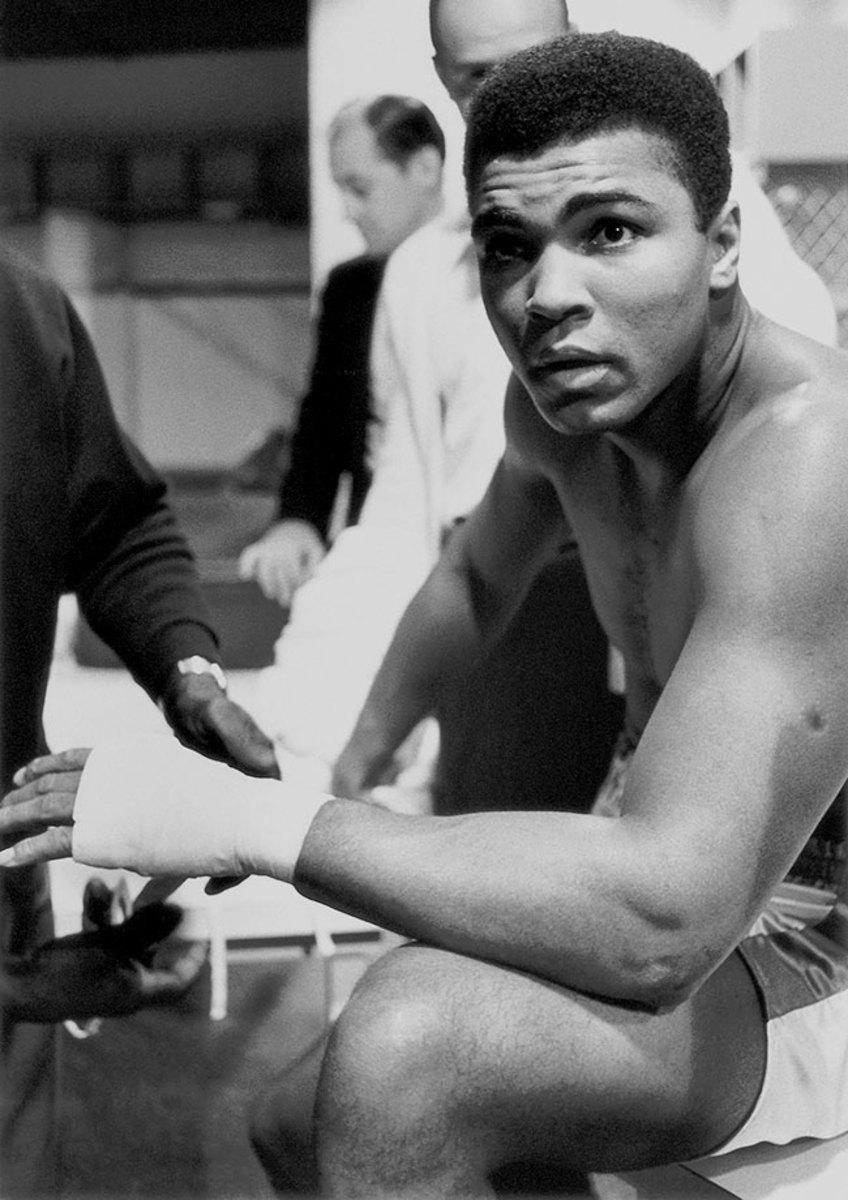
Ali sits in the locker room before his February 1967 fight against Ernie Terrell. Like Patterson before him, Terrell refused to call the champion by his Muslim name. Also like Patterson, he paid a stiff price, as Ali punished Terrell for 15 ugly rounds before winning by unanimous decision.
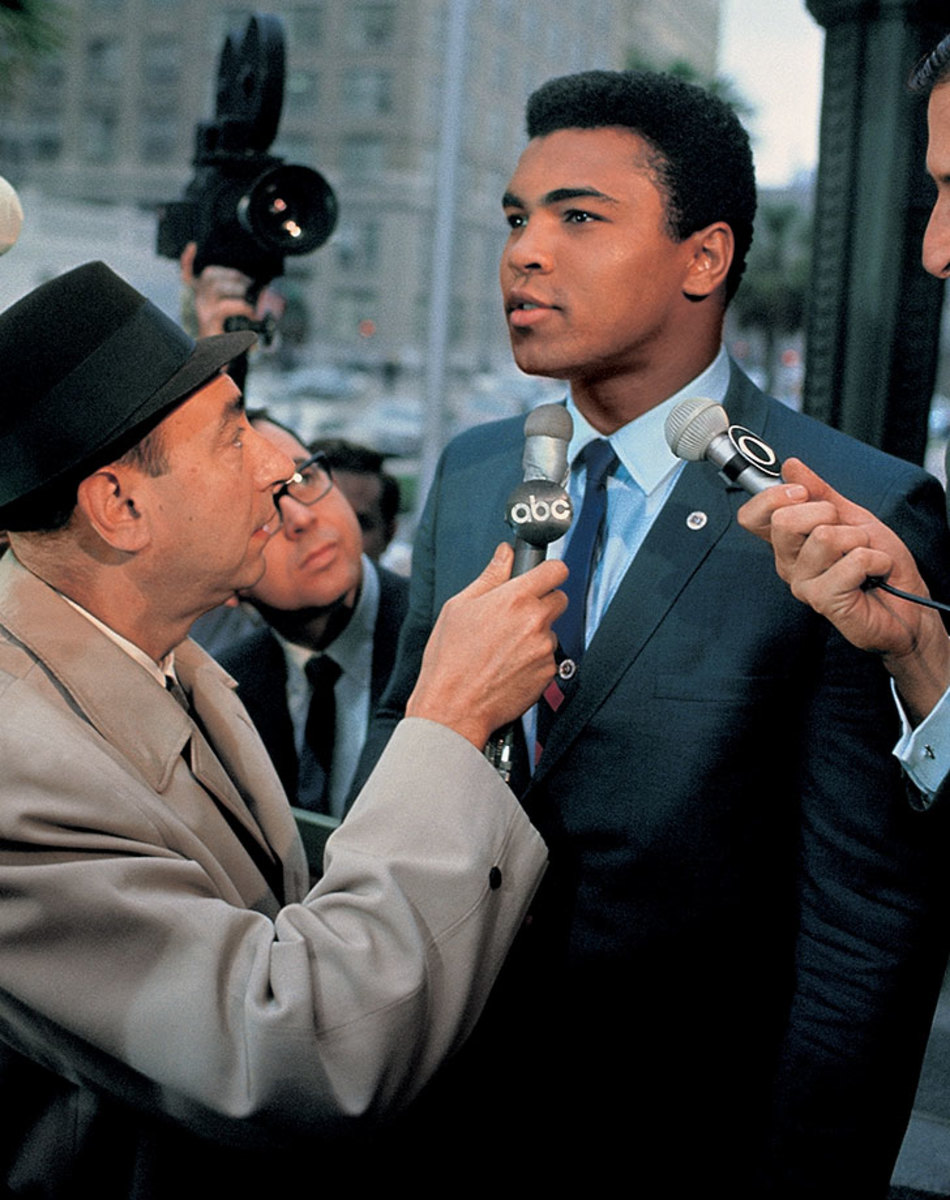
Outside the Armed Forces Examining and Entrance Station in Houston in April 1967, Ali spoke to the press about his refusal to be inducted into military service. Among those on hand was ABC's Howard Cosell, who would be a staunch supporter of the fighter's stance. The decision cost Ali his boxing license and his heavyweight title, and he was sentenced to five years in prison but remained free pending an appeal.
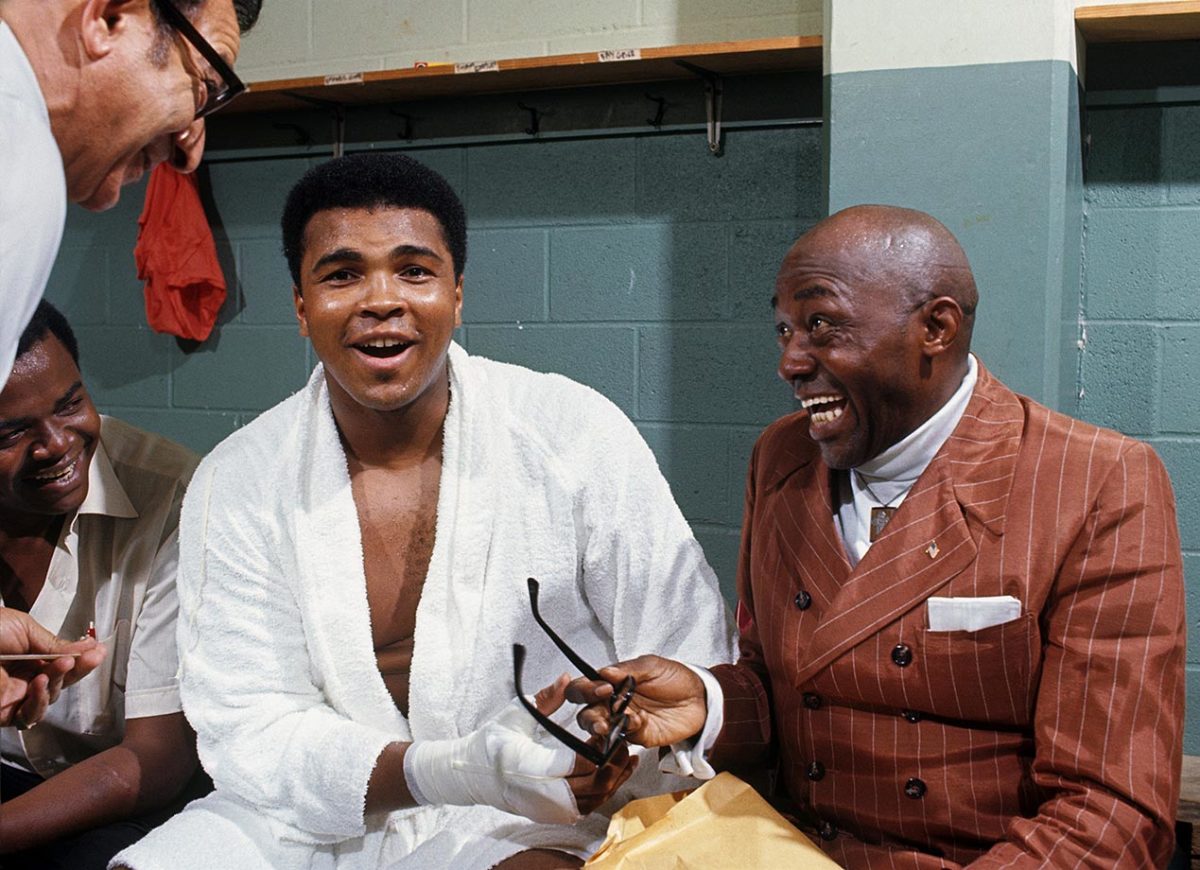
In professional exile for three and a half years because of his draft case, Ali sought to return to boxing in 1970. He began with a night of exhibition bouts at Morehouse College in Atlanta, where before going into the ring, he shared a locker room laugh with actor and comedian Lincoln Perry (right), better known by his stage name of Stepin Fetchit. The friendship between the two black icons would later be examined in an acclaimed play by Will Power, Fetch Clay, Make Man.
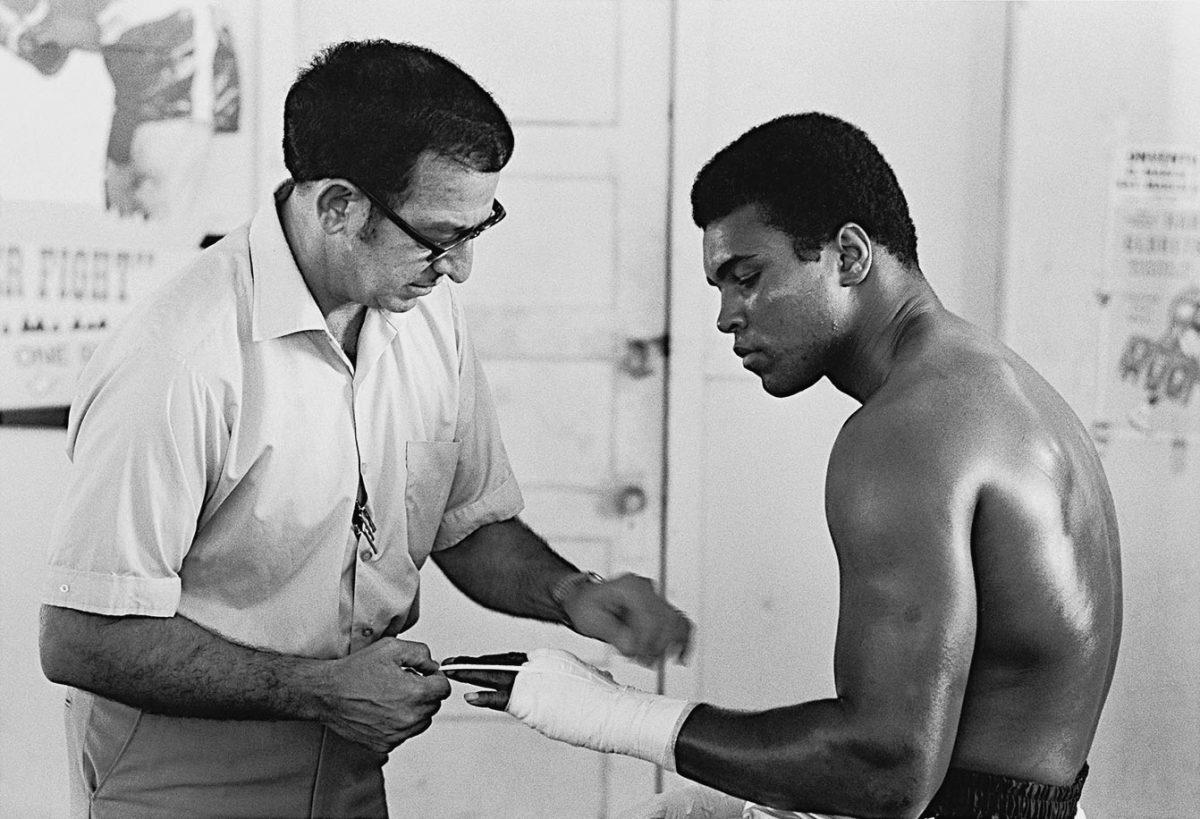
After the Atlanta Athletic Commission at last granted Ali a license, the deposed champion went back into serious training. He was, as ever, in the capable hands of trainer Angelo Dundee, here wrapping boxing's most famous fists at the 5th Street Gym in Miami in October 1970.
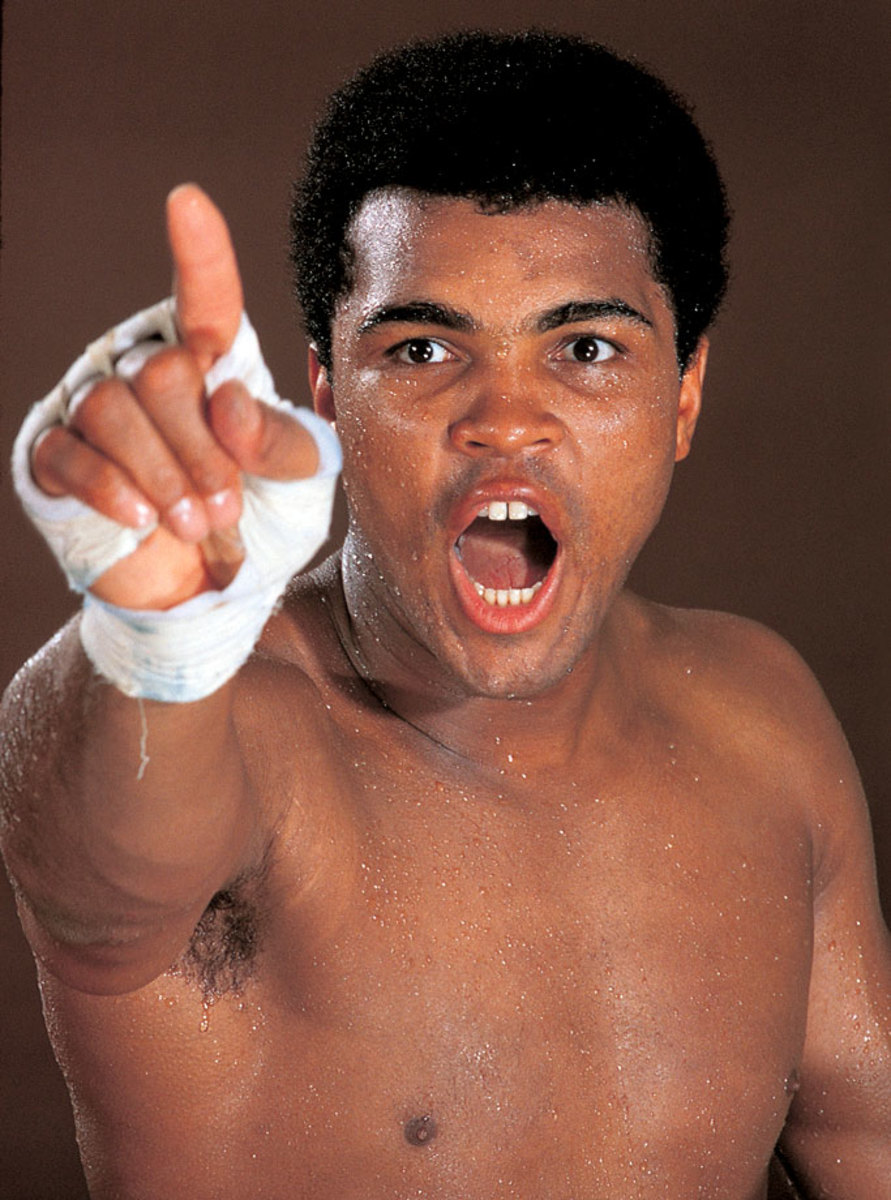
With his return to the ring scheduled for Oct. 26, 1970 in Atlanta, against dangerous contender Jerry Quarry, Ali made it clear to all who would listen that he was on a mission to reclaim the title that had been stripped of him.
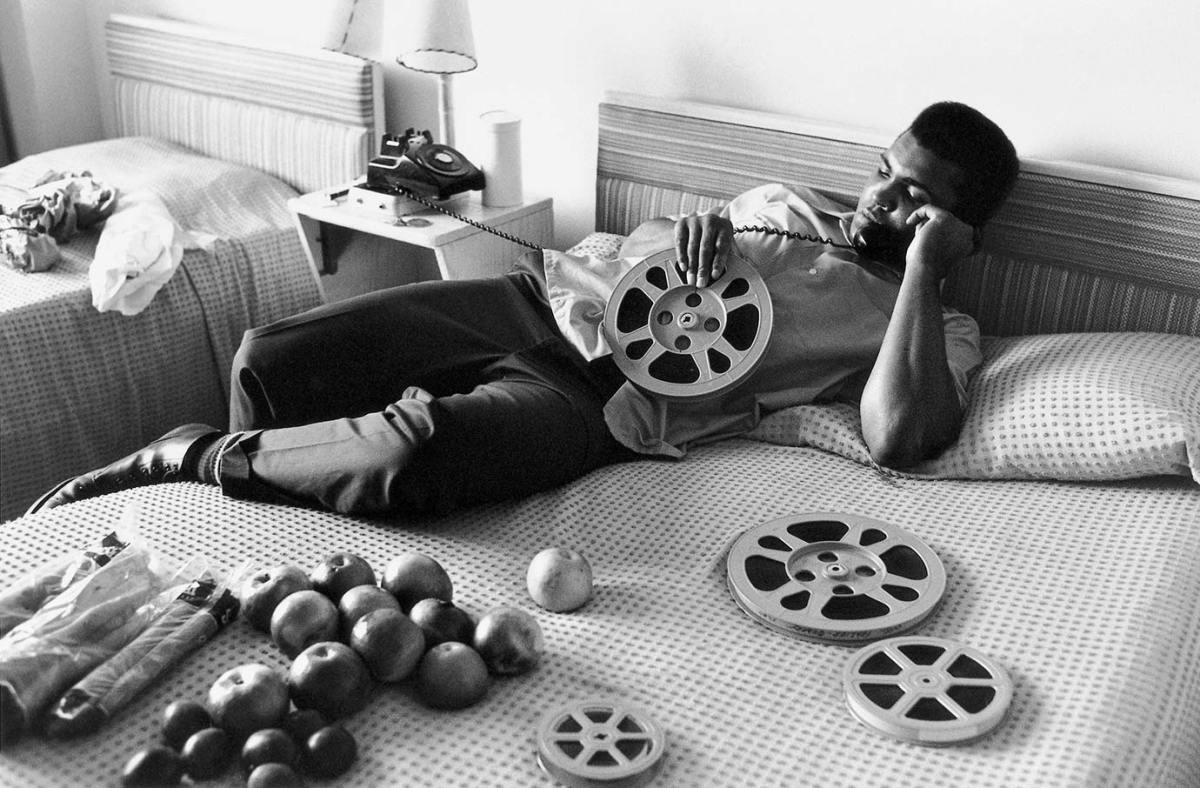
Reel to spiel: For the ever-loquacious Ali, even a rare moment of down time — like this afternoon in 1970 in a Miami hotel room — was a chance to do some talking.
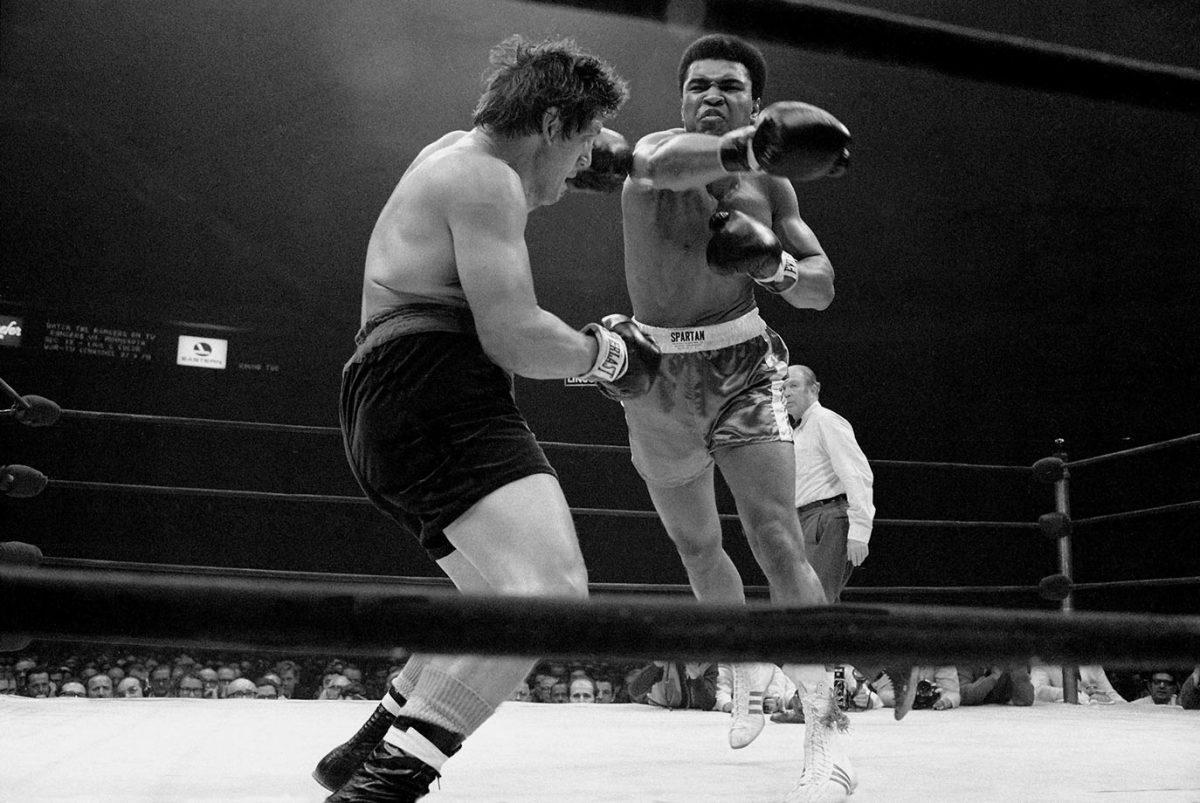
Despite Ali's long layoff, his comeback campaign would include no easy tune-up bouts. He stopped Quarry in three rounds on Oct. 26, 1970, then, just six weeks later — an unthinkably short interlude by today's standards — took on Argentine contender Oscar Bonavena in Madison Square Garden. Here, Ali fires a right at the rugged and awkward Bonavena, who took the fight to the former champion all night.
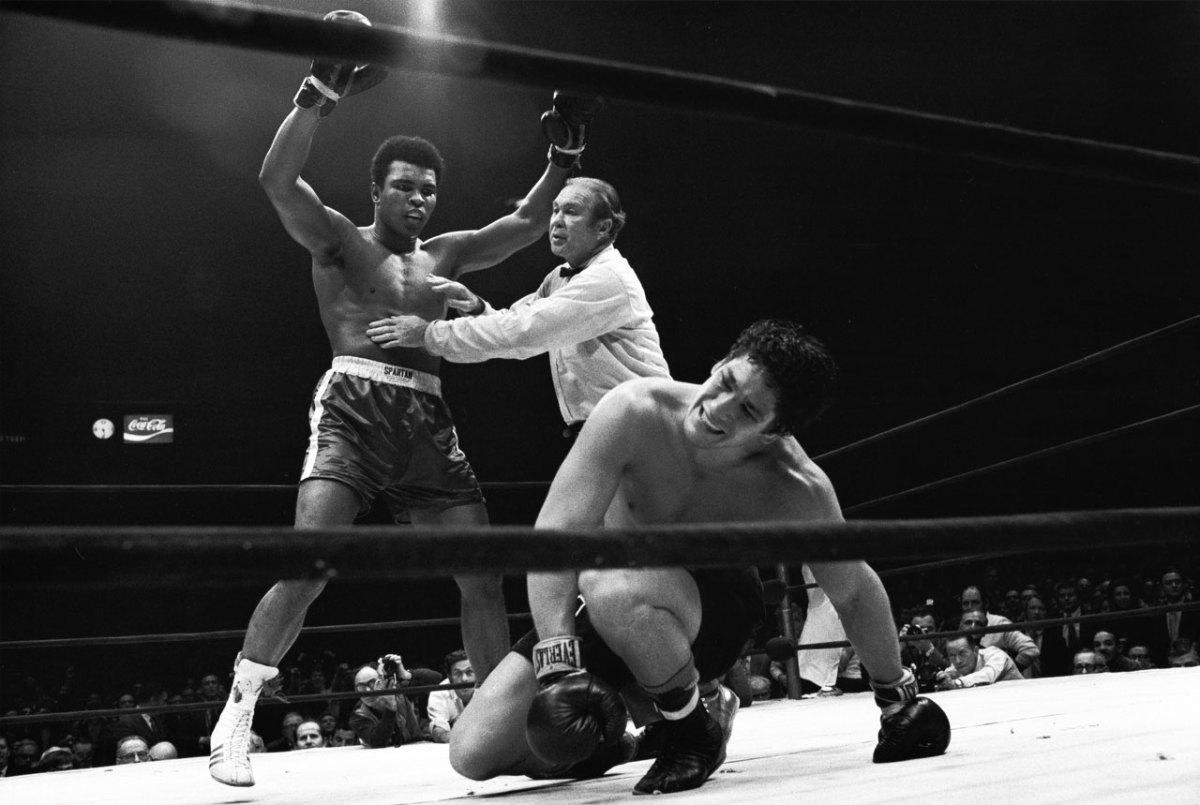
After a long, often sloppy bout, Ali — here being held back by referee Mark Conn — produced one of the most dramatic finishes of his career, dropping Bonavena three times in the 15th and final round to automatically end the fight. The win cleared the way for a showdown with Joe Frazier, the man who had taken the heavyweight title in Ali's absence.
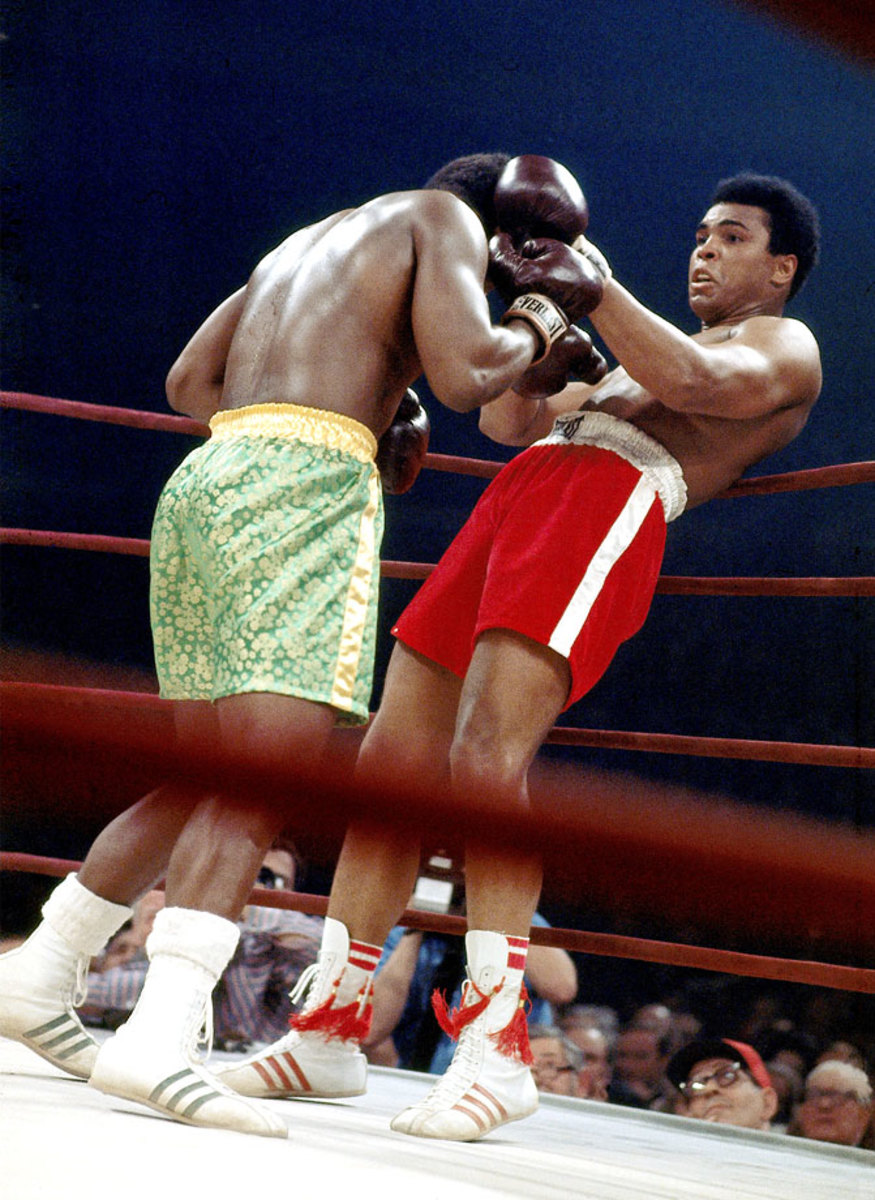
On the night of March 8, 1971, the eyes of the world were on a square patch of white canvas in the center of Madison Square Garden. There, Ali and Joe Frazier met in what was billed at the time simply as The Fight, but has come to be known, justifiably, as the Fight of the Century. For 15 rounds the two undefeated heavyweights battled at a furious pace, with each man sustaining tremendous punishment. In the end Frazier prevailed, dropping Ali in the final round with a tremendous left hook to seal a unanimous decision and hand The Greatest his first loss in 32 professional fights.
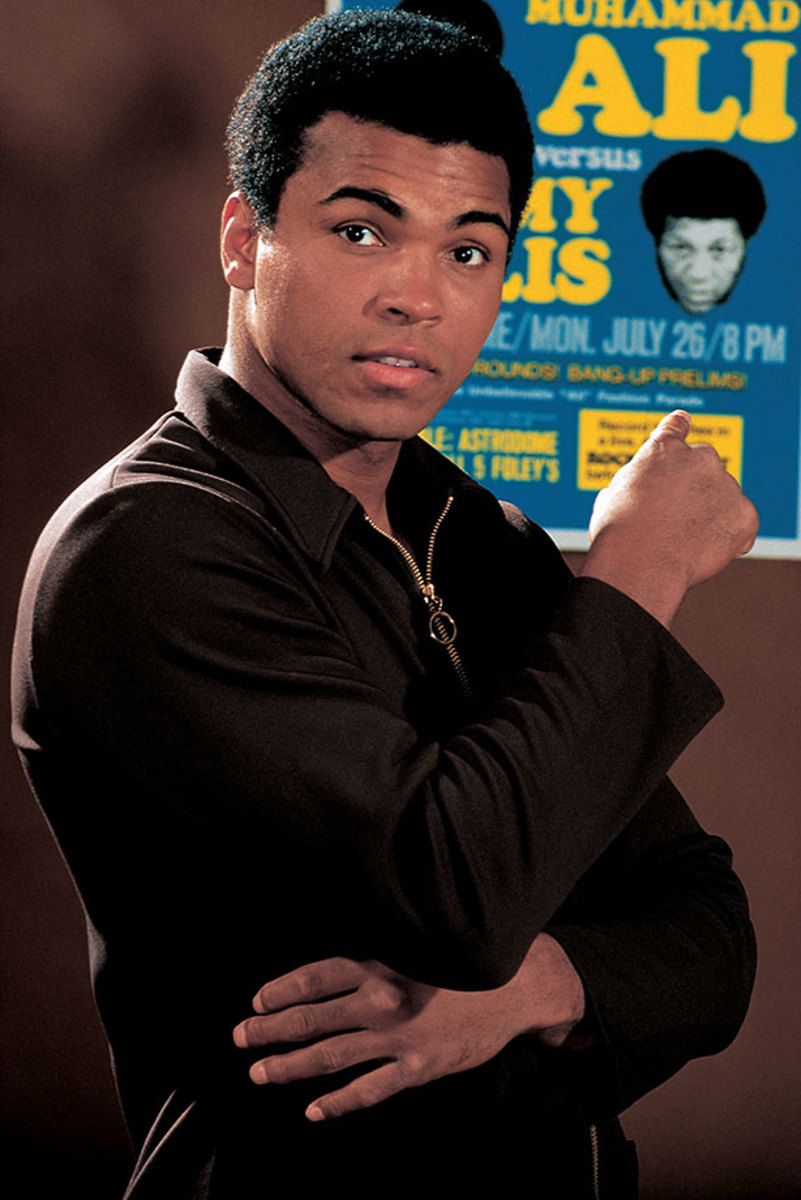
Ali poses with the fight poster for his upcoming fight against Jimmy Ellis during a photo shoot in July 1971. Ellis was an old friend of Ali's — both were trained by Angelo Dundee — and knew his fighting style well from many rounds of sparring.
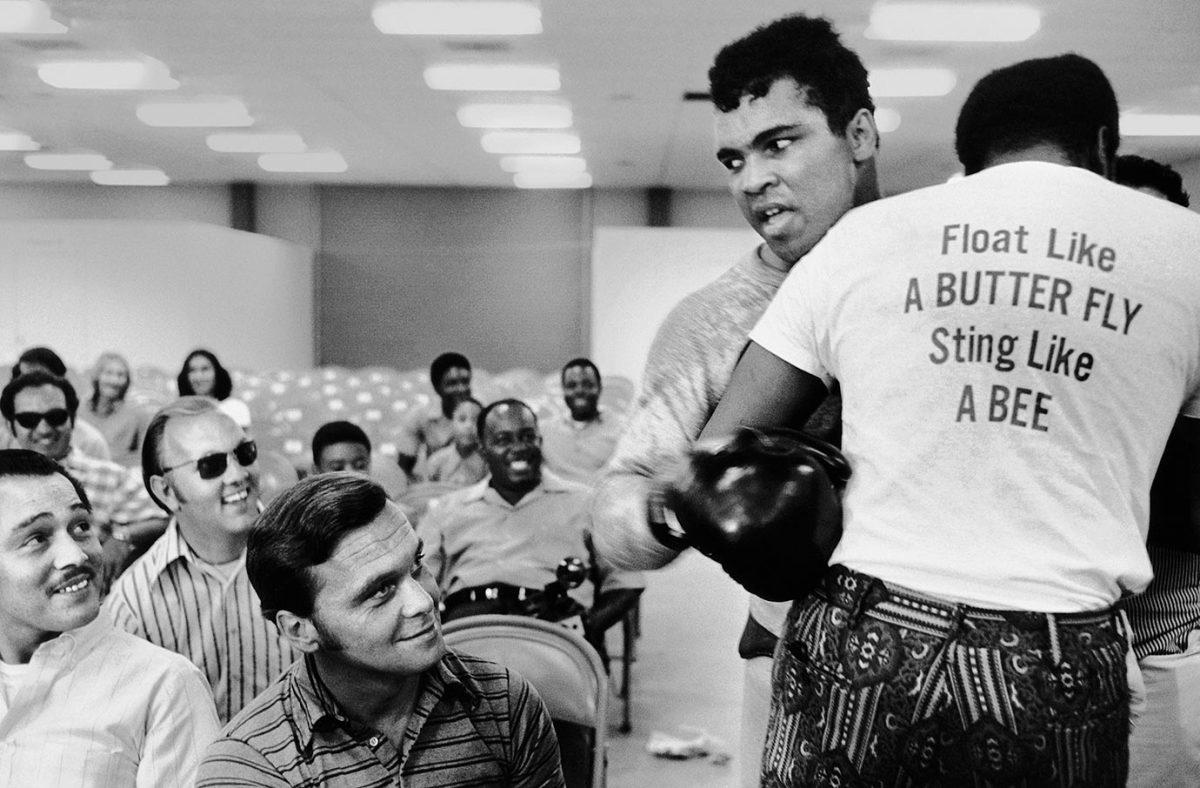
For those sportswriters lucky enough to cover Ali on a regular basis, each day brought surprises and, more often than not, plenty of laughs. of Trainer Drew Bundini Brown helps Ali train for his fight against Ellis. Ali won the bout by technical knockout in the 12th round to claim the vacant NABF heavyweight title.
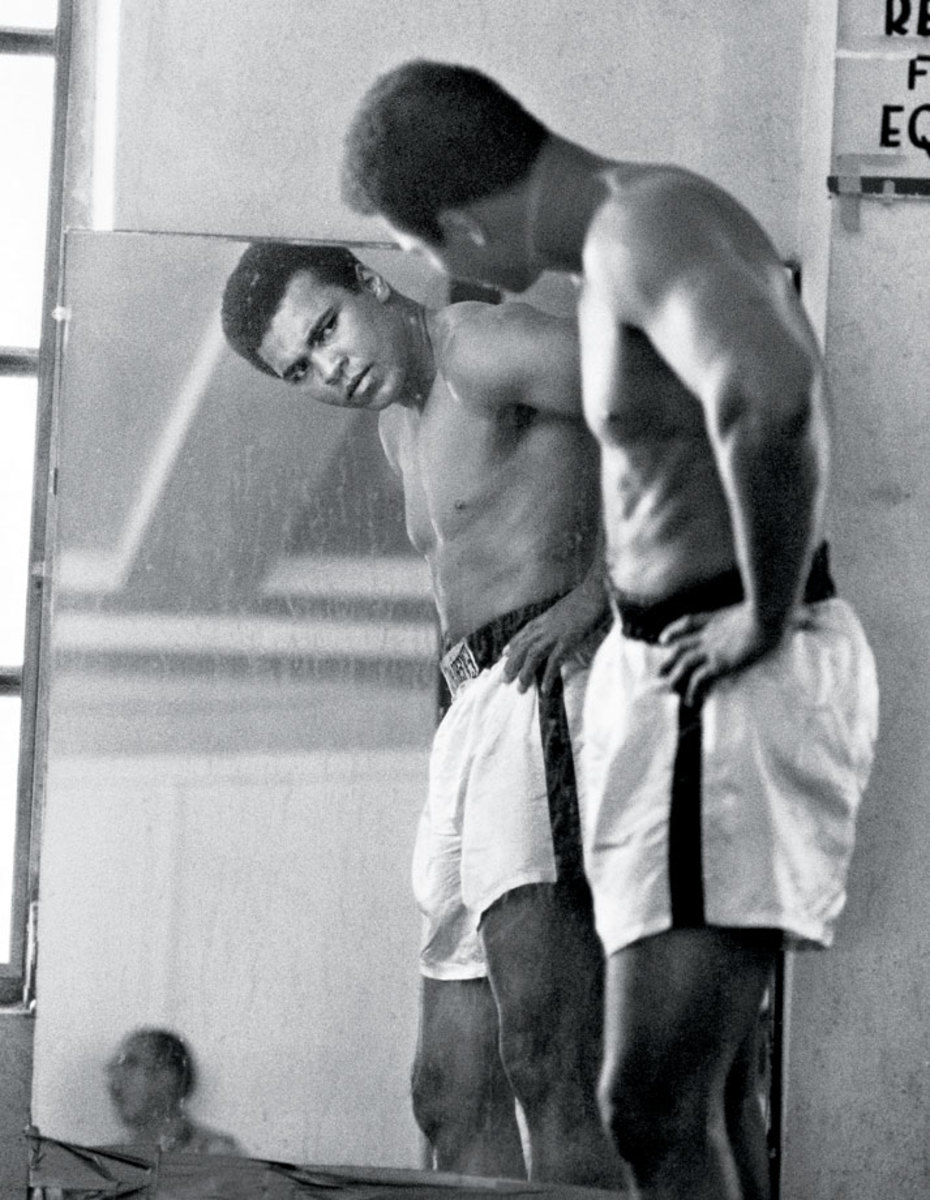
The man in the mirror stares back as Ali examines himself while training for a fight in 1972. He won all six of his fights that year.

The Louisville Lip stands next to George Foreman before Ali's fight versus Jerry Quarry in June 1972. Ali won by technical knockout in the seventh round. Foreman at the time was 36-0. Ali would not get his shot against Foreman for more than two years.
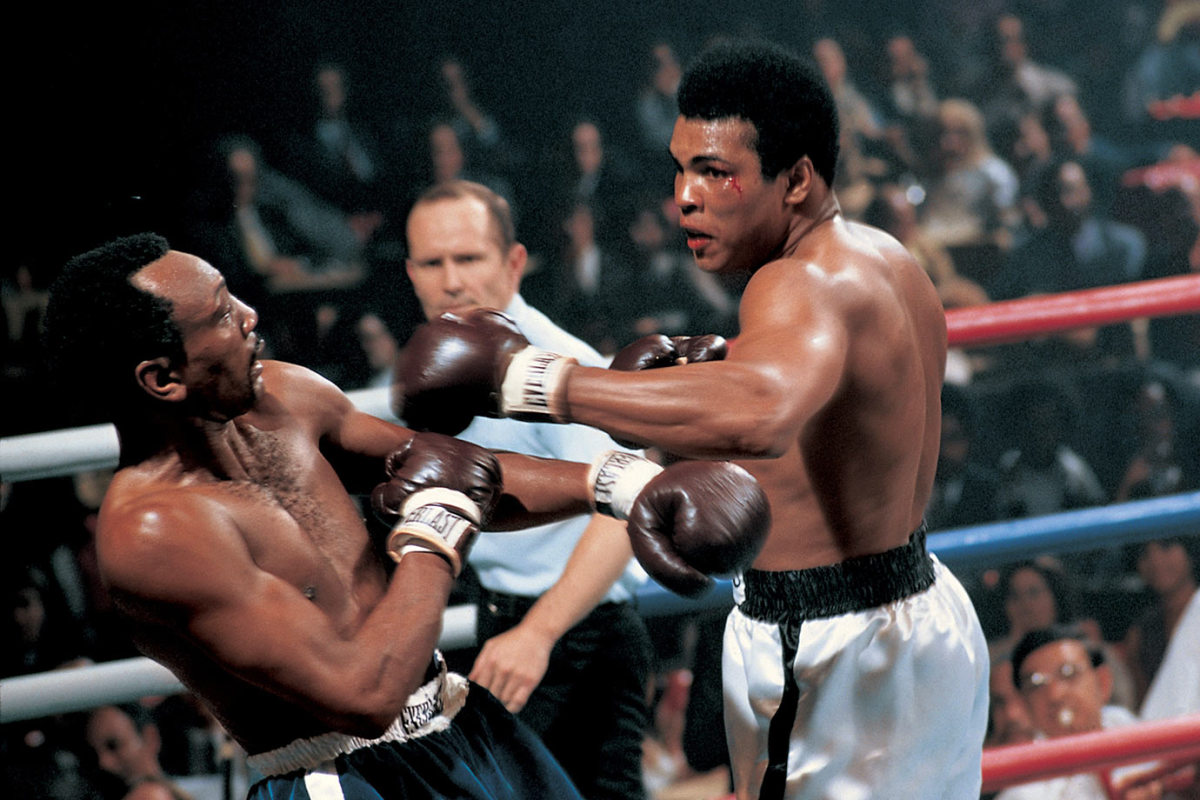
Ali throws a left hook at Bob Foster in their 1972 fight at Stateline, Nev. Although Ali knocked Foster out, Foster did leave his mark: a cut above Ali's left eye, his first as a professional.
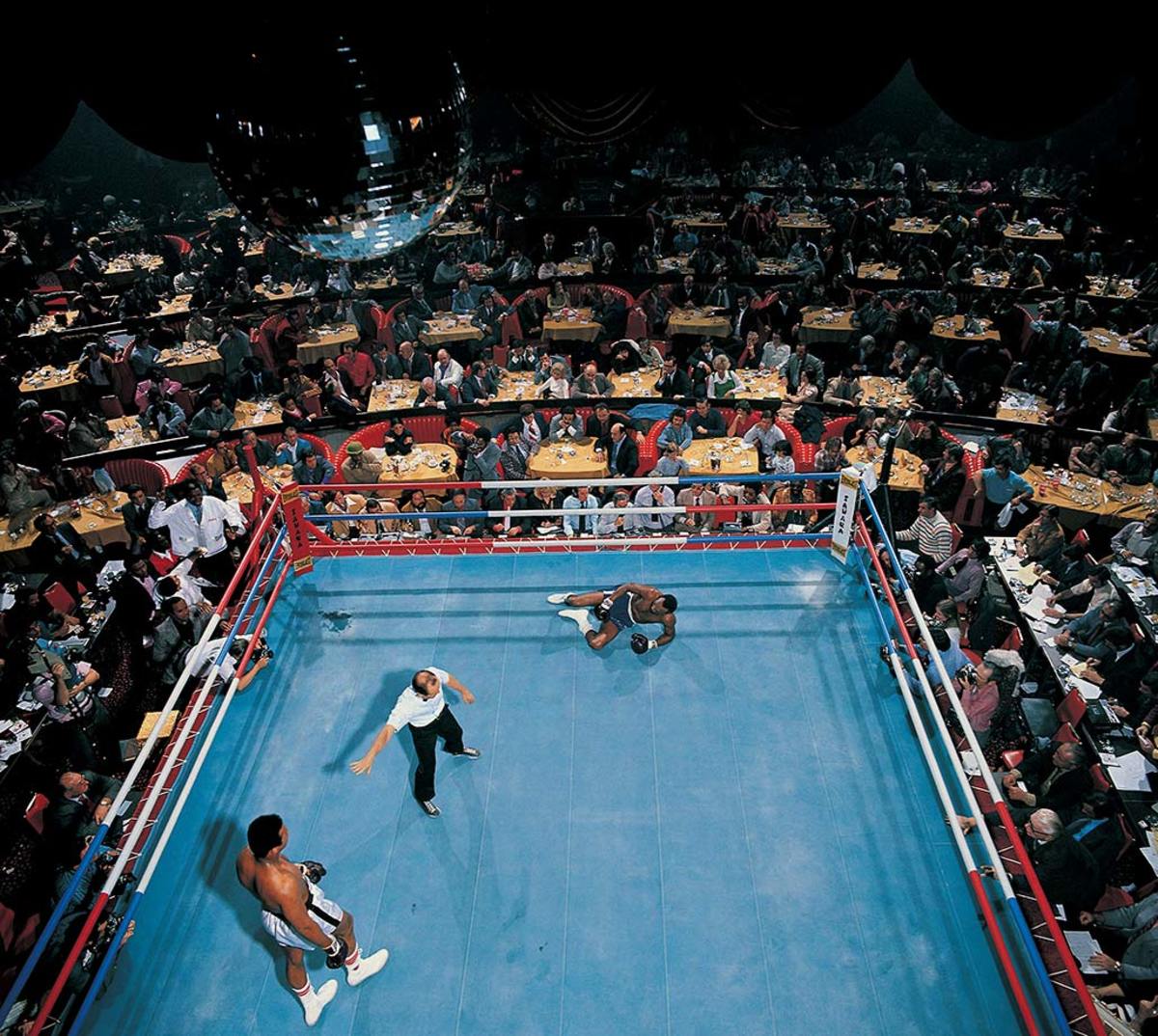
Foster lies on the canvas after getting knocked down by Ali. Ali knocked Foster down four times in the fifth round and twice more in the seventh round before he was finally counted out after Ali knocked him down again in the eighth round.
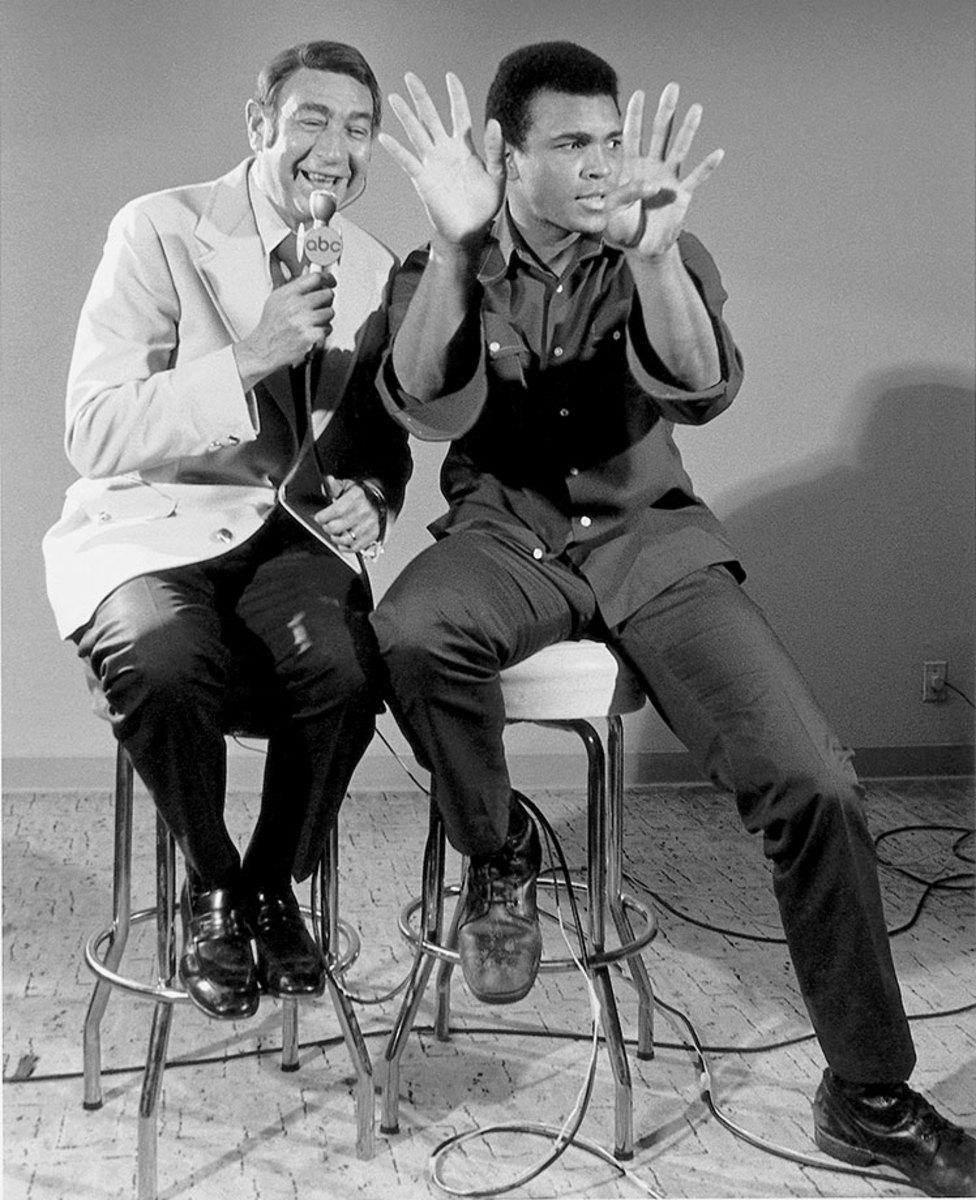
Ali sits with sportscaster Howard Cosell before his fight with Joe Bugner in February 1973. Although unable to knock Bugner out, Ali won comfortably by unanimous decision.
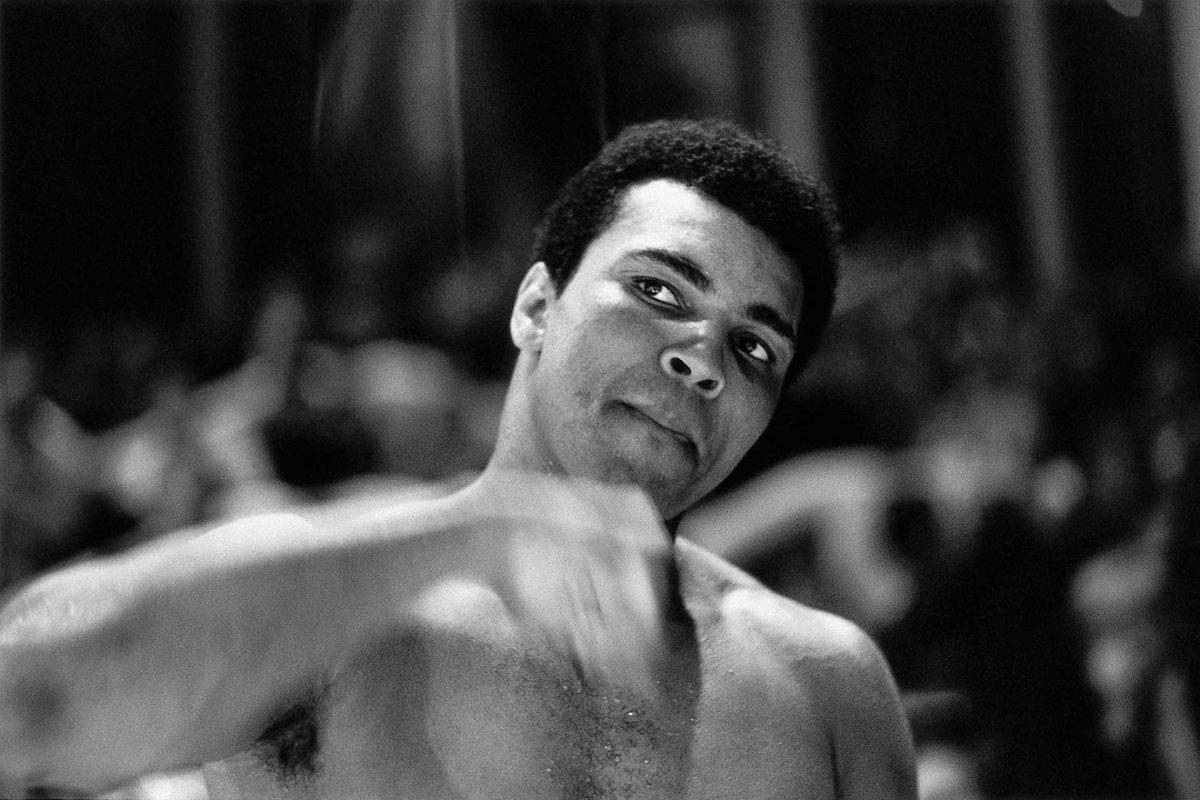
Ali hits a speed bag while warming up for his bout with Bugner in Las Vegas. Ali prepared ferociously for the fight, training 67 rounds the week leading up to the fight, including six rounds the day before the fight.
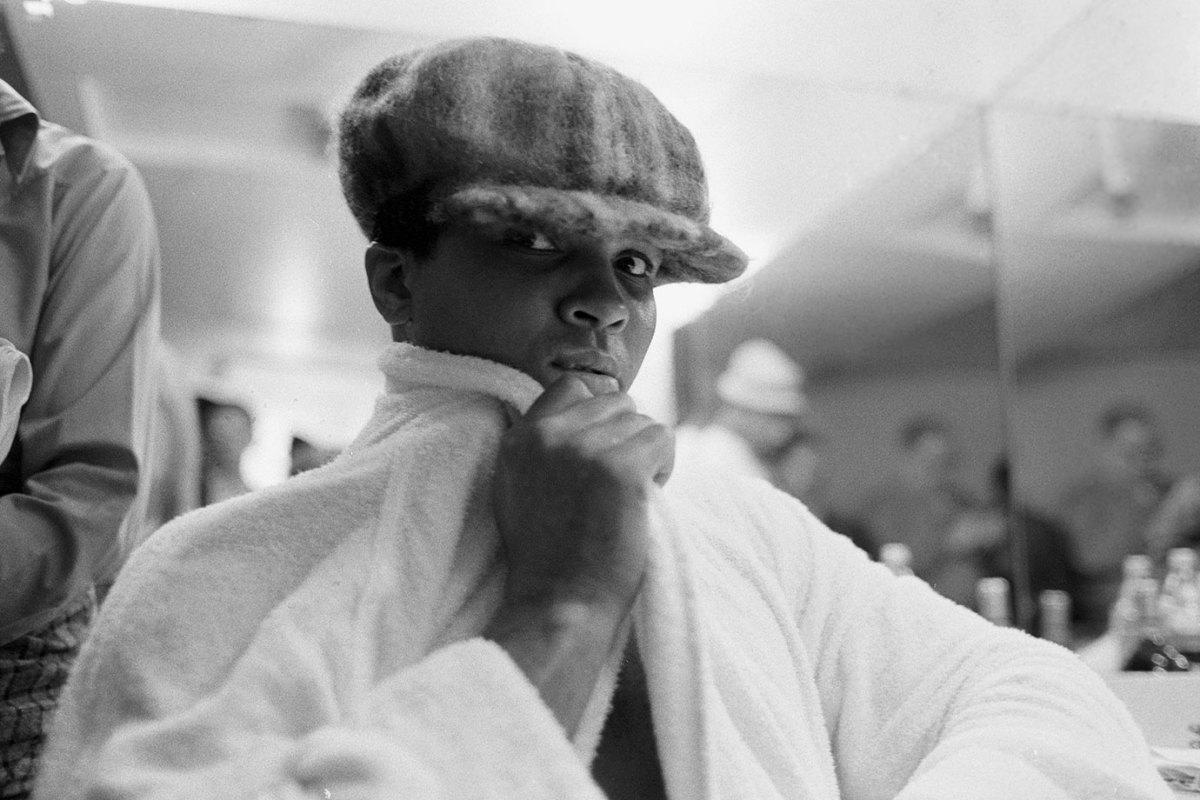
In a lighter pre-fight moment, Ali poses for a portrait wearing a hat in his dressing room before the match with Bugner.
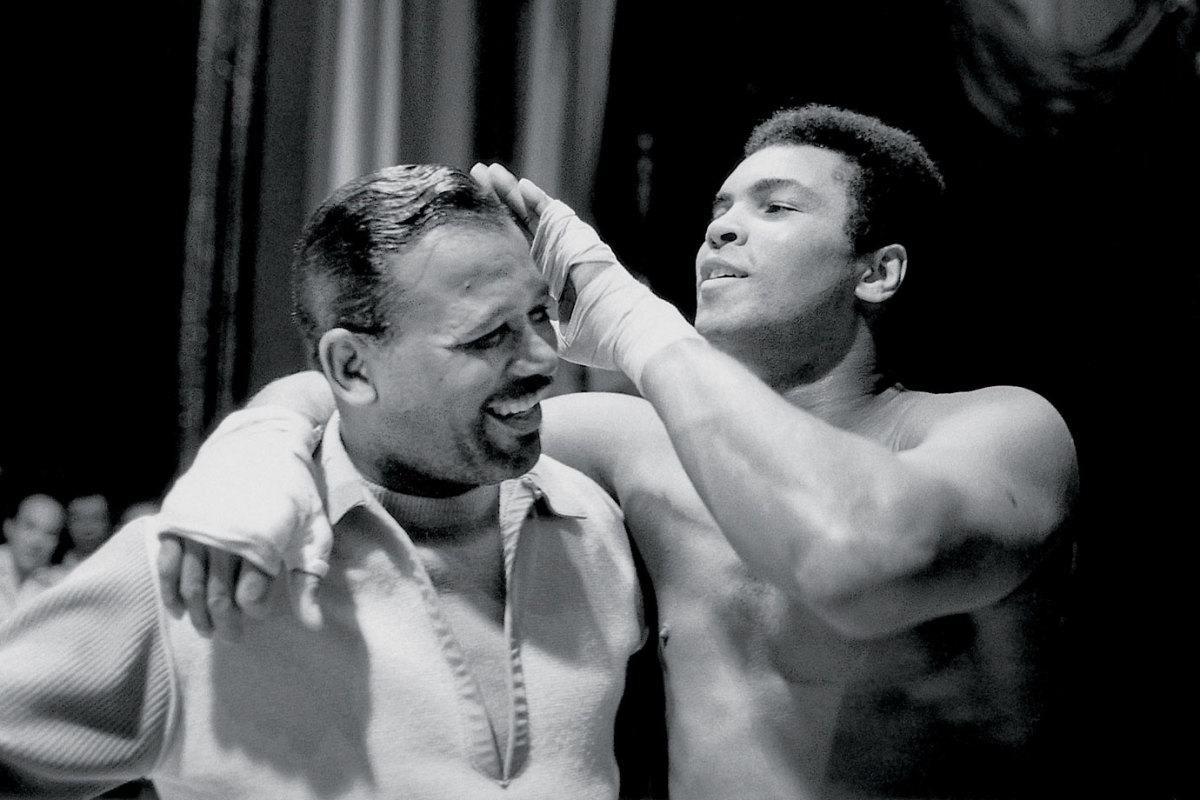
Ali plays with Sugar Ray Robinson's hair in the locker room before his bout with Bugner. The former welterweight and middleweight champion was Ali's childhood idol.
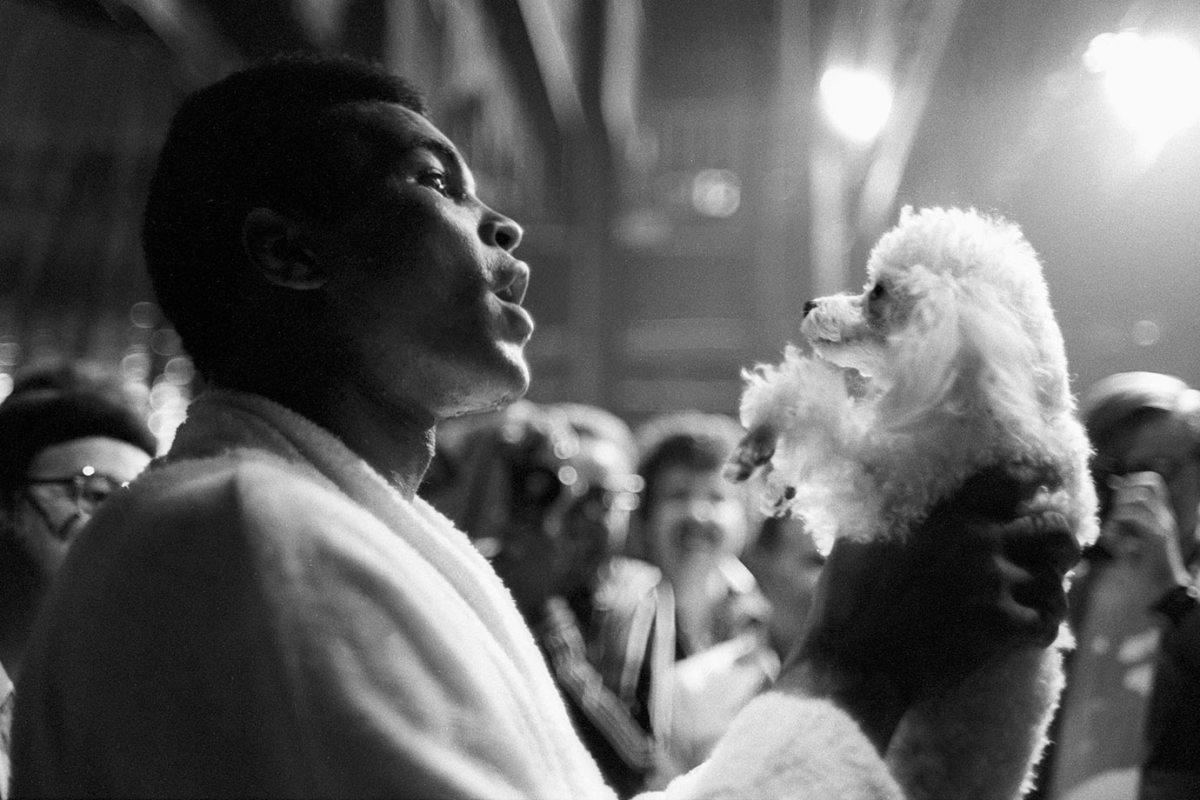
Before the fight with Bugner, Muhammad Ali enjoys a relaxed moment with a poodle at Caesars Palace Hotel. He won the fight with Bugner by unanimous decision.
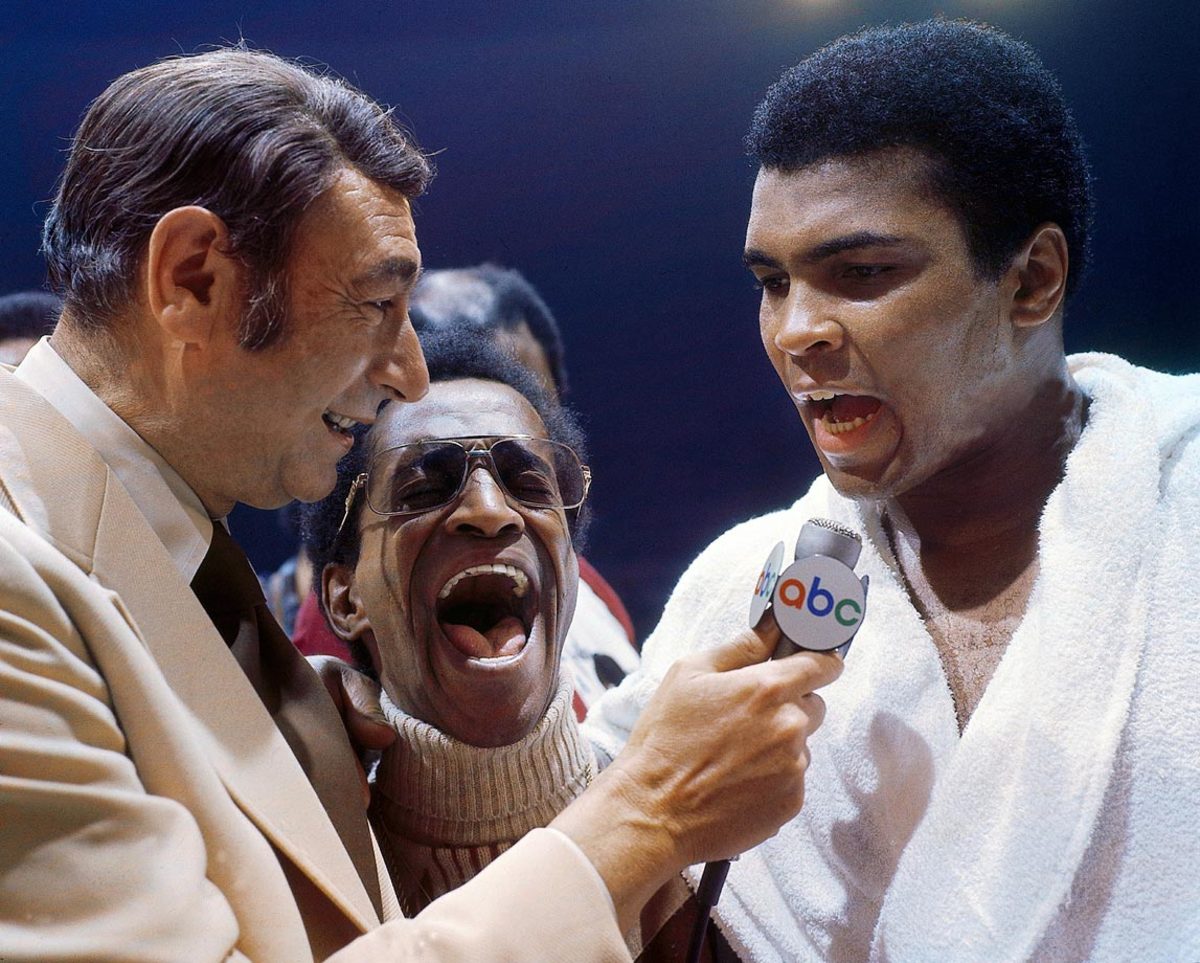
Howard Cosell interviews Ali, with entertainer Sammy Davis Jr. in the middle, after his victory over Joe Bugner by unanimous decision in. Although the fight was never in jeopardy of getting away from him, Ali praised Bugner's legs and said he could be a champion in a few years.
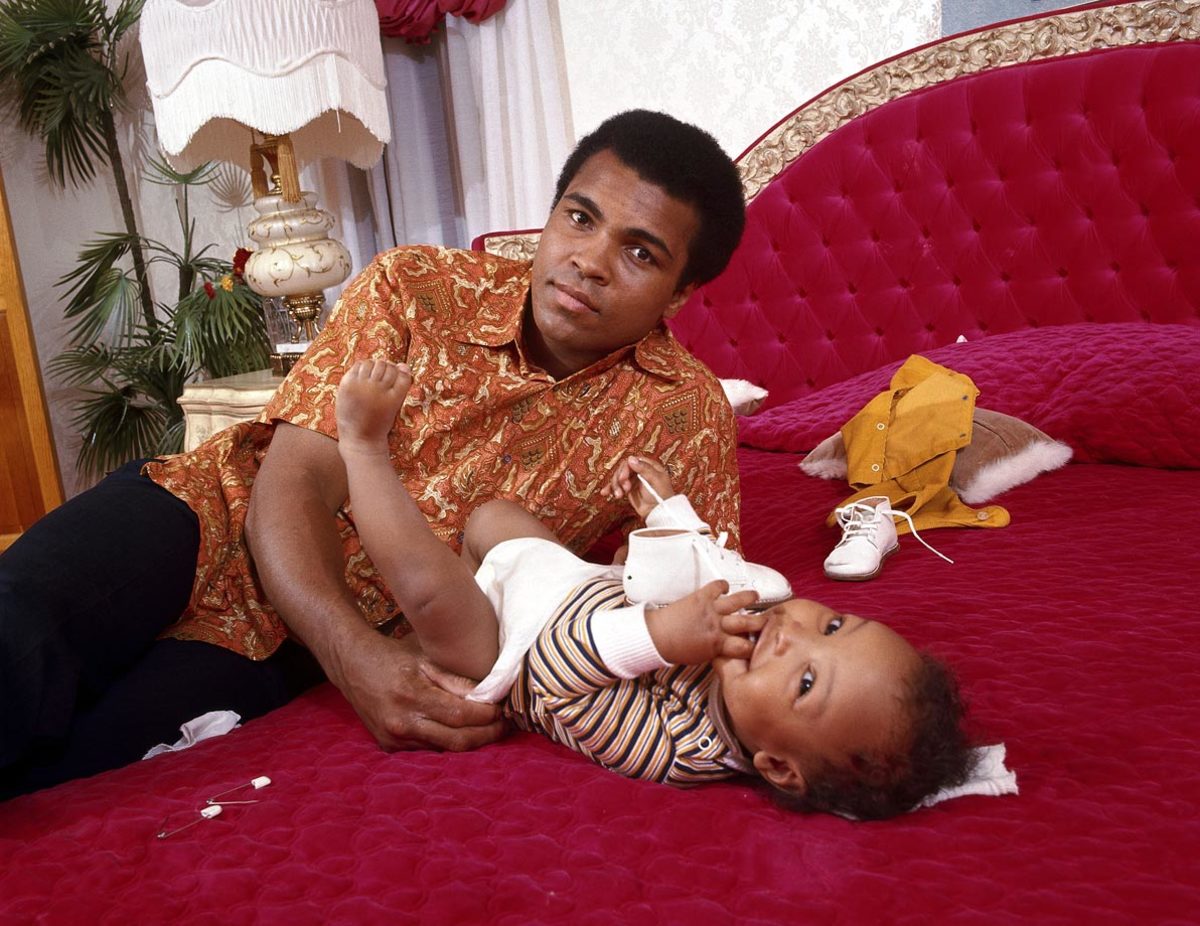
Ali changes the diaper of his son in his bedroom during a photo shoot at the family's home in April 1973. Ali had suffered a broken jaw less than a month earlier in his fight against Ken Norton.
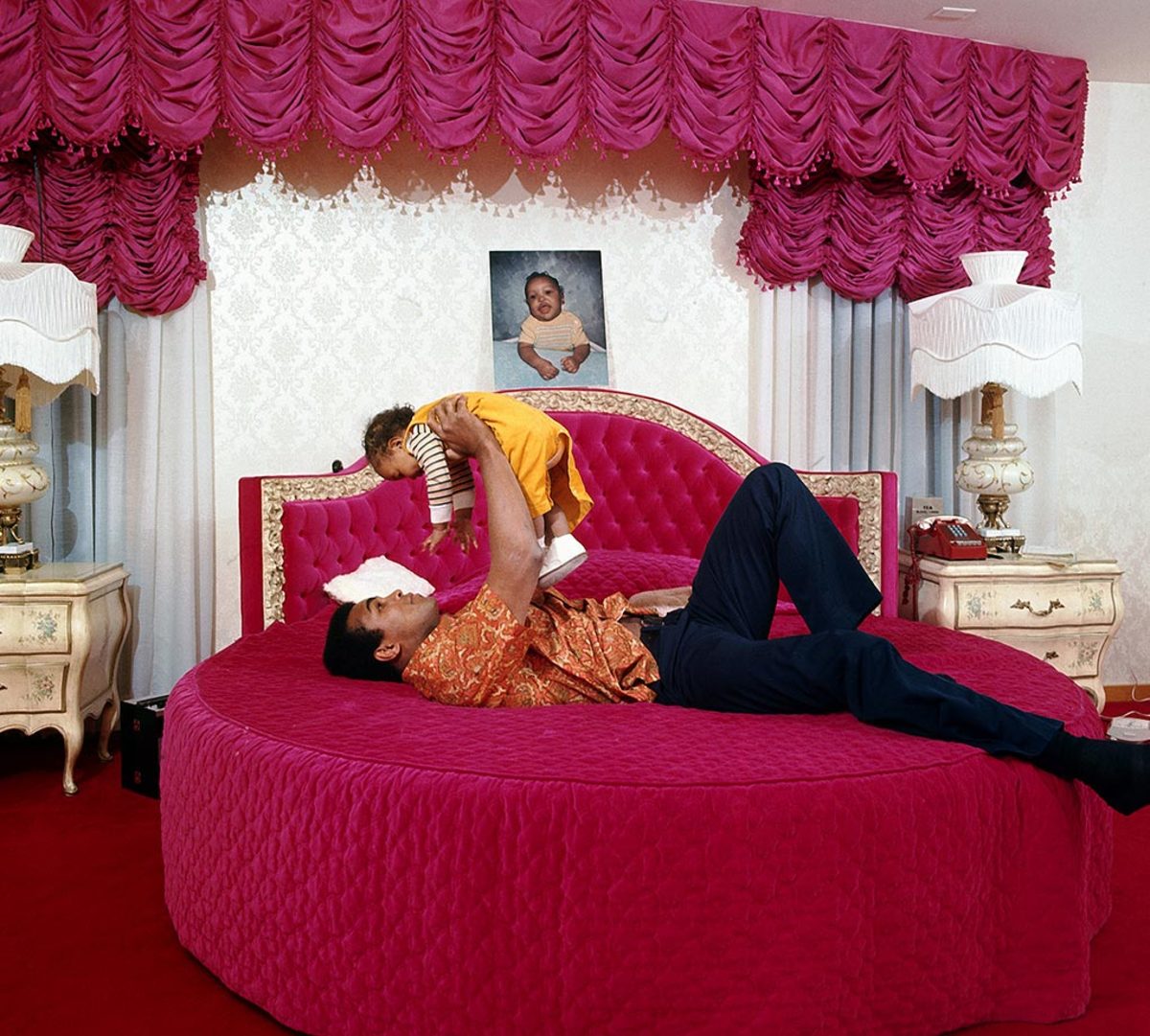
In the wake of his split decision loss to Norton, Ali plays with his son in his bedroom at home in Cherry Hill, N.J.
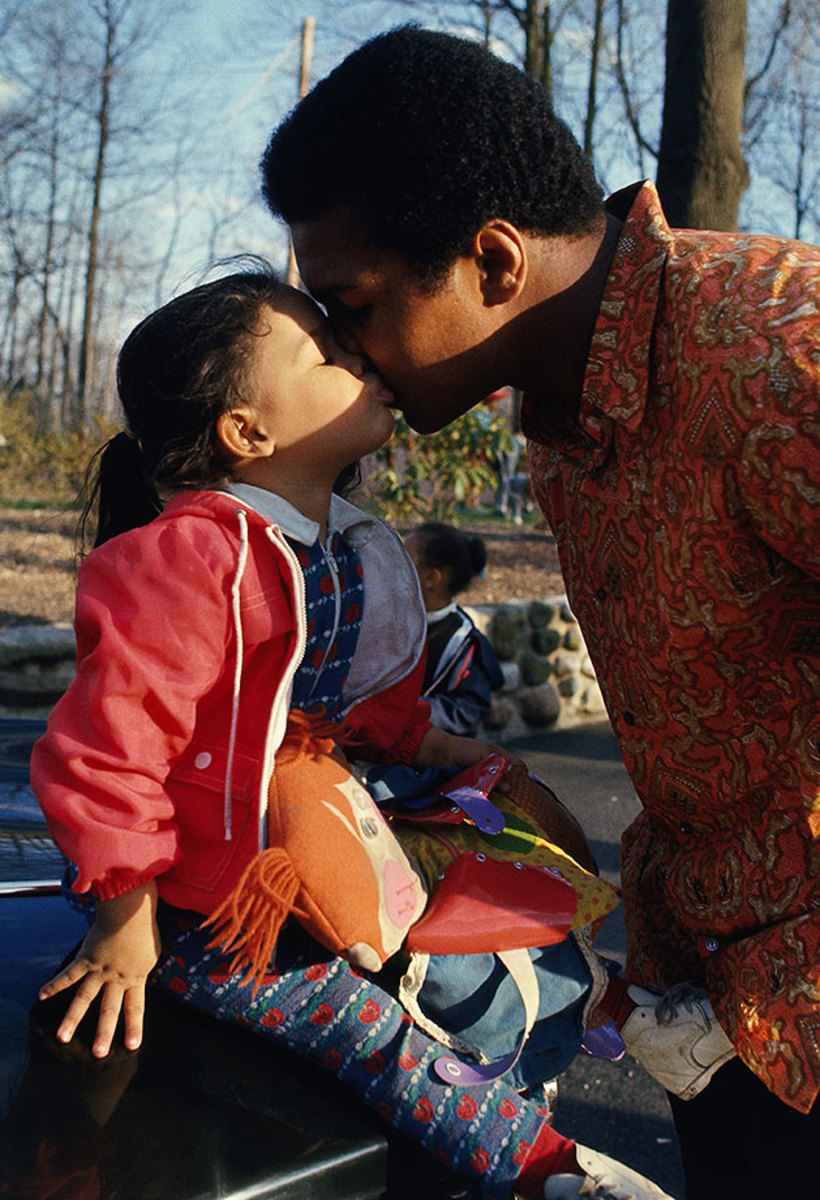
Ali kisses his daughter Jamillah outside of their home following the loss to Norton, just the second defeat of his career.
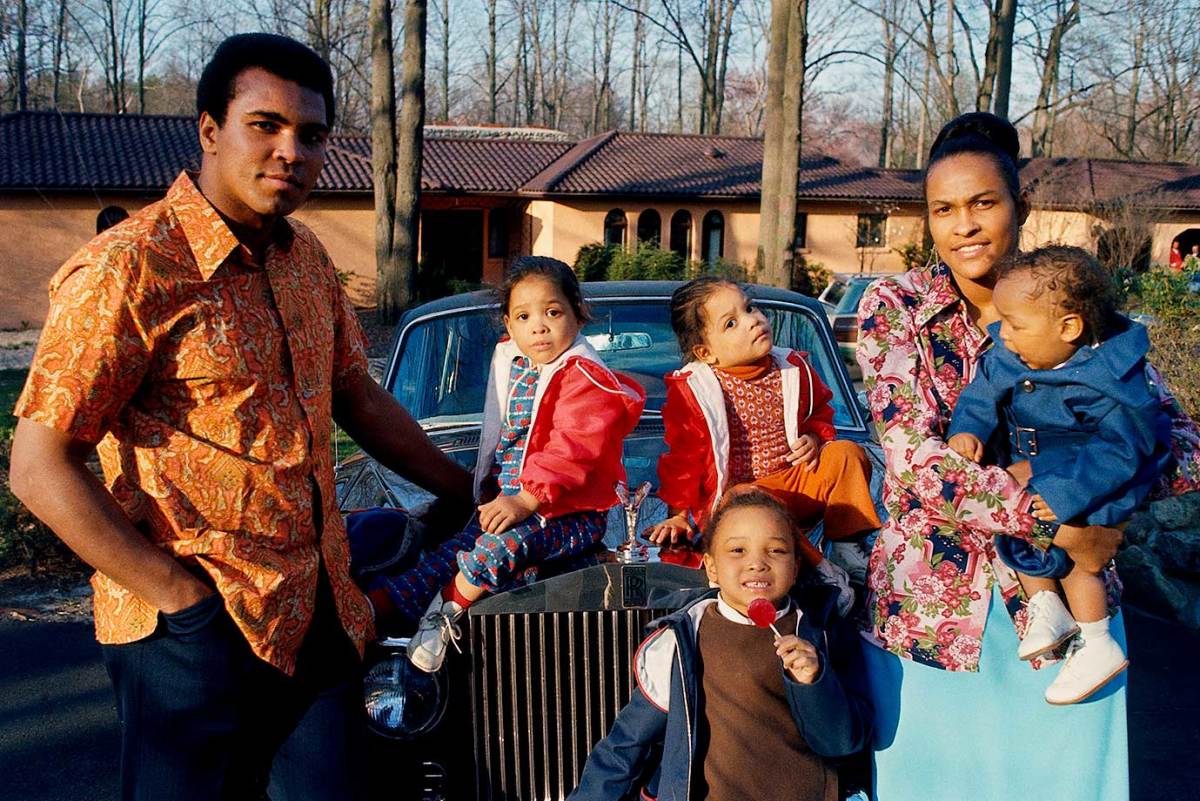
The Ali family standing outside their New Jersey home. To the right of Muhammad Ali are his twin daughters, Jamilllah and Rasheda, daughter Maryum and his wife, Khalilah, holding their son Ibn Muhammad Ali Jr.
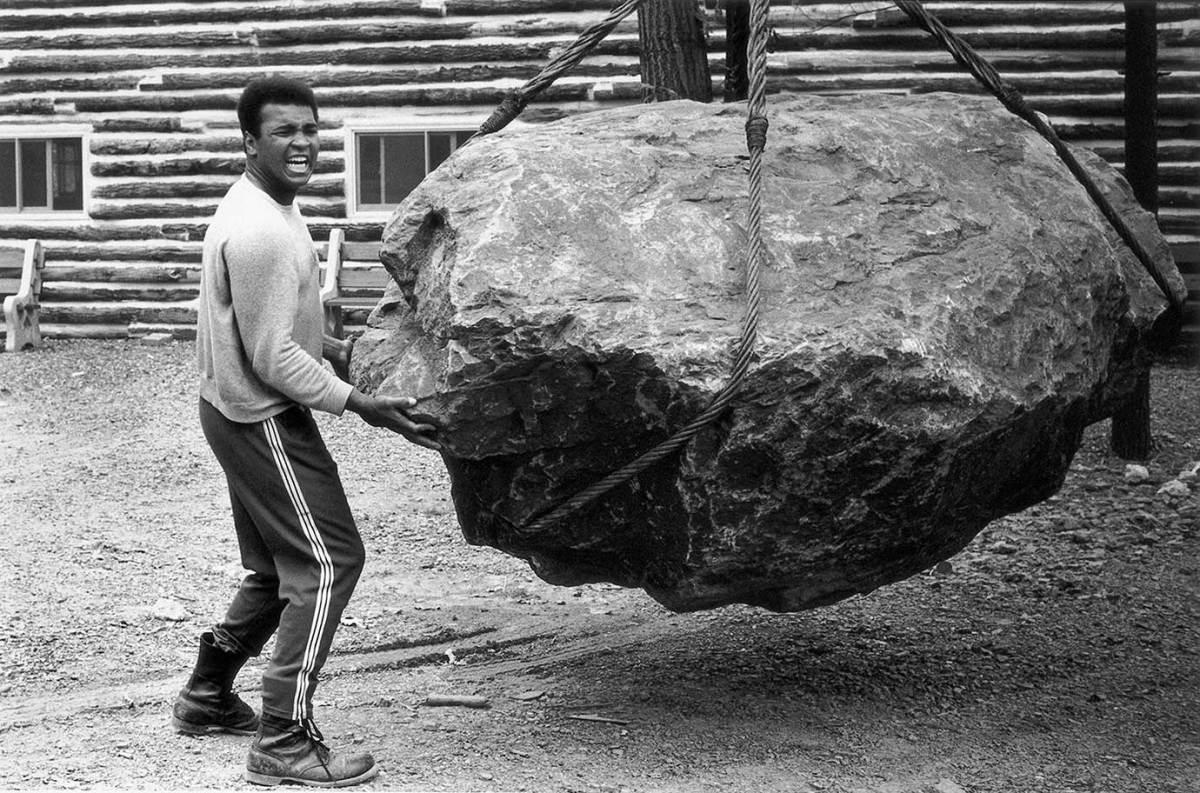
At his training camp cabin, Ali pushes a boulder during a photo shoot in Deer Lake, Penn., in August 1973. Ali was training for his rematch against Ken Norton, who broke his jaw five months earlier.
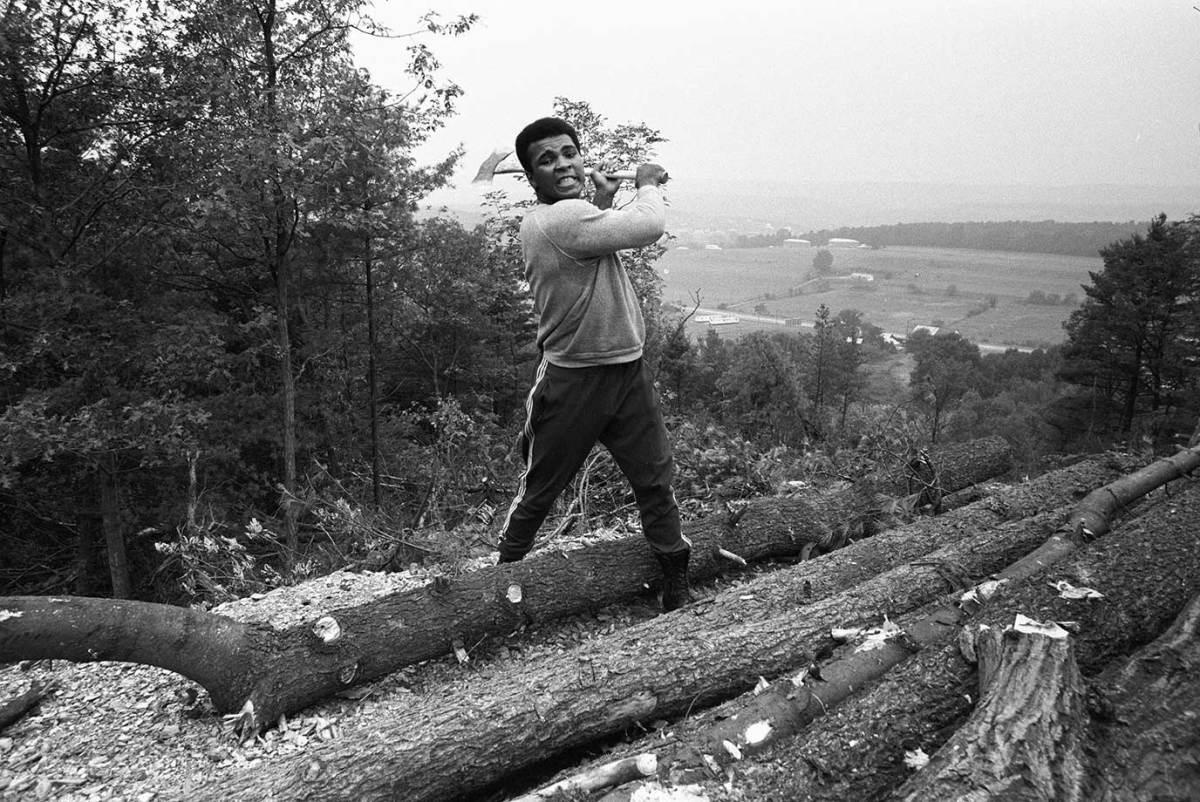
Ali chops wood at his cabin in Deer Lake. He referred to the training camp as "fighter's heaven" and used it to prepare for fights away from the spotlight.
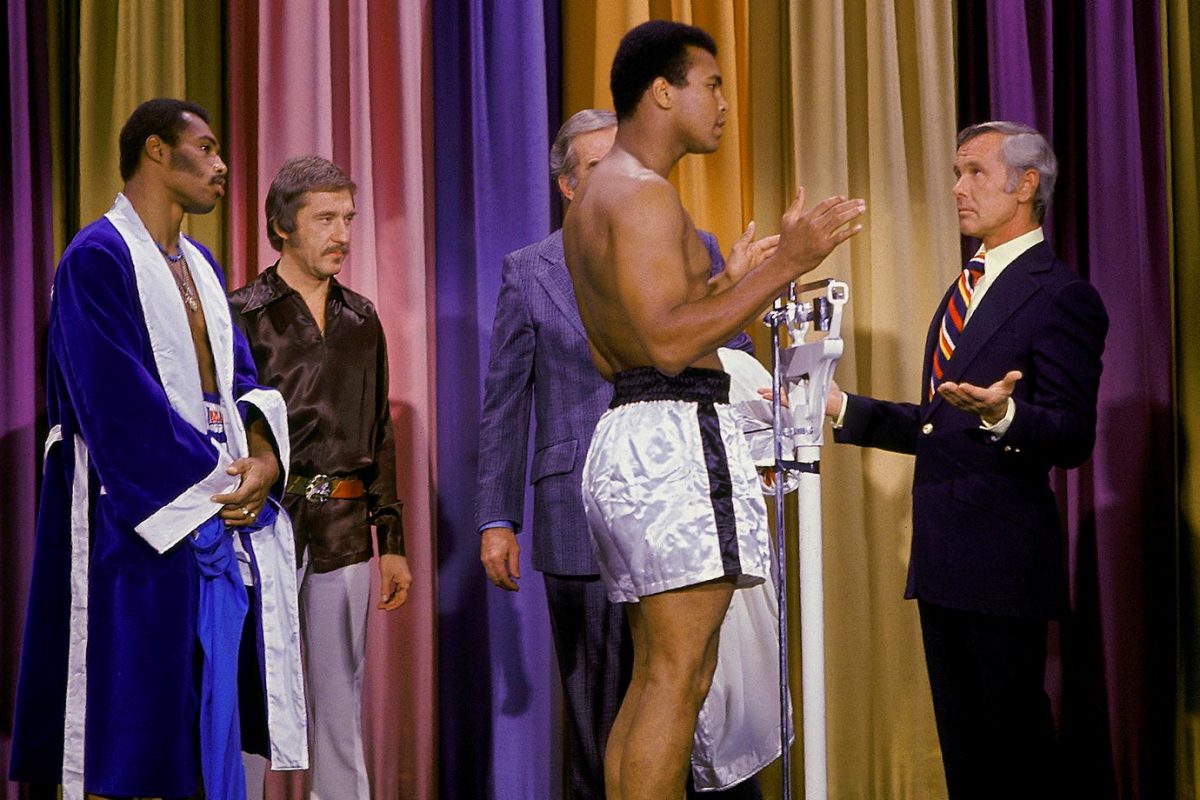
The fighters weigh in on the Tonight Show with Johnny Carson ahead of Ali and Ken Norton's September 1973 fight.
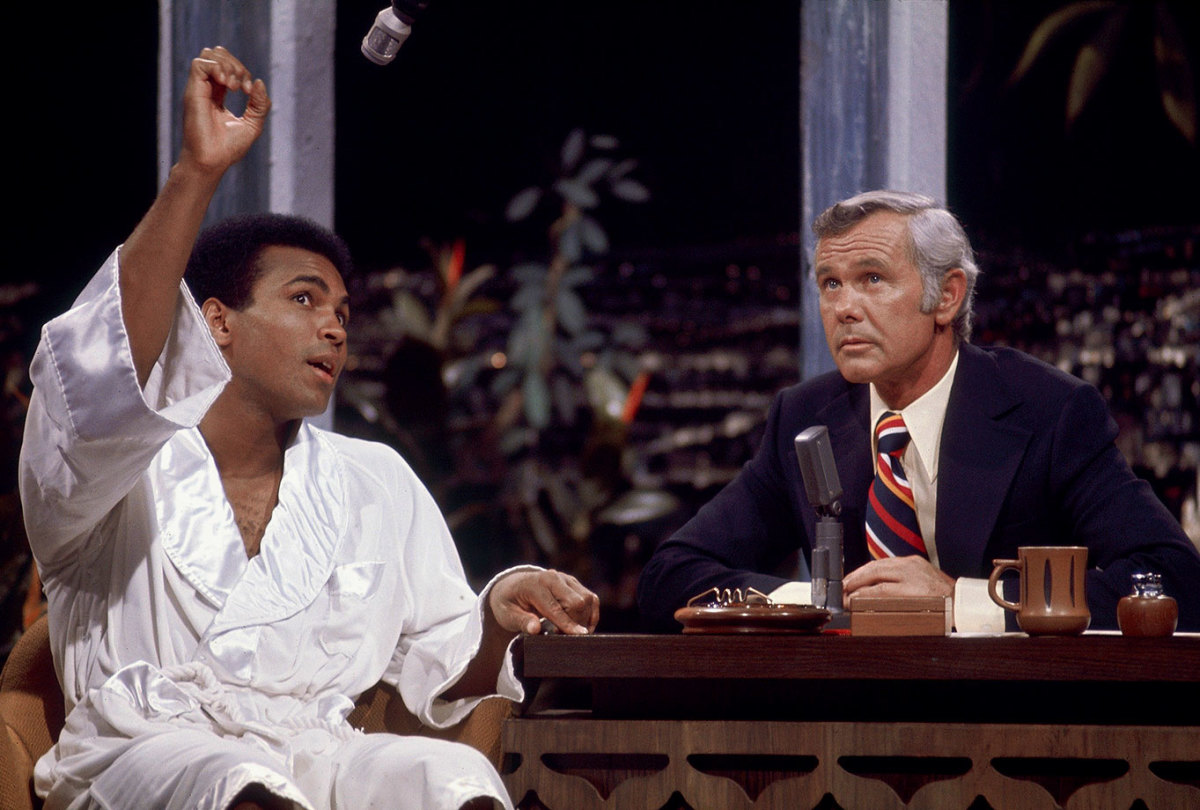
Johnny Carson listens to Ali on the Tonight Show three days before his rematch with Norton. Ali would avenge his earlier loss to Norton, winning a narrow split decision.
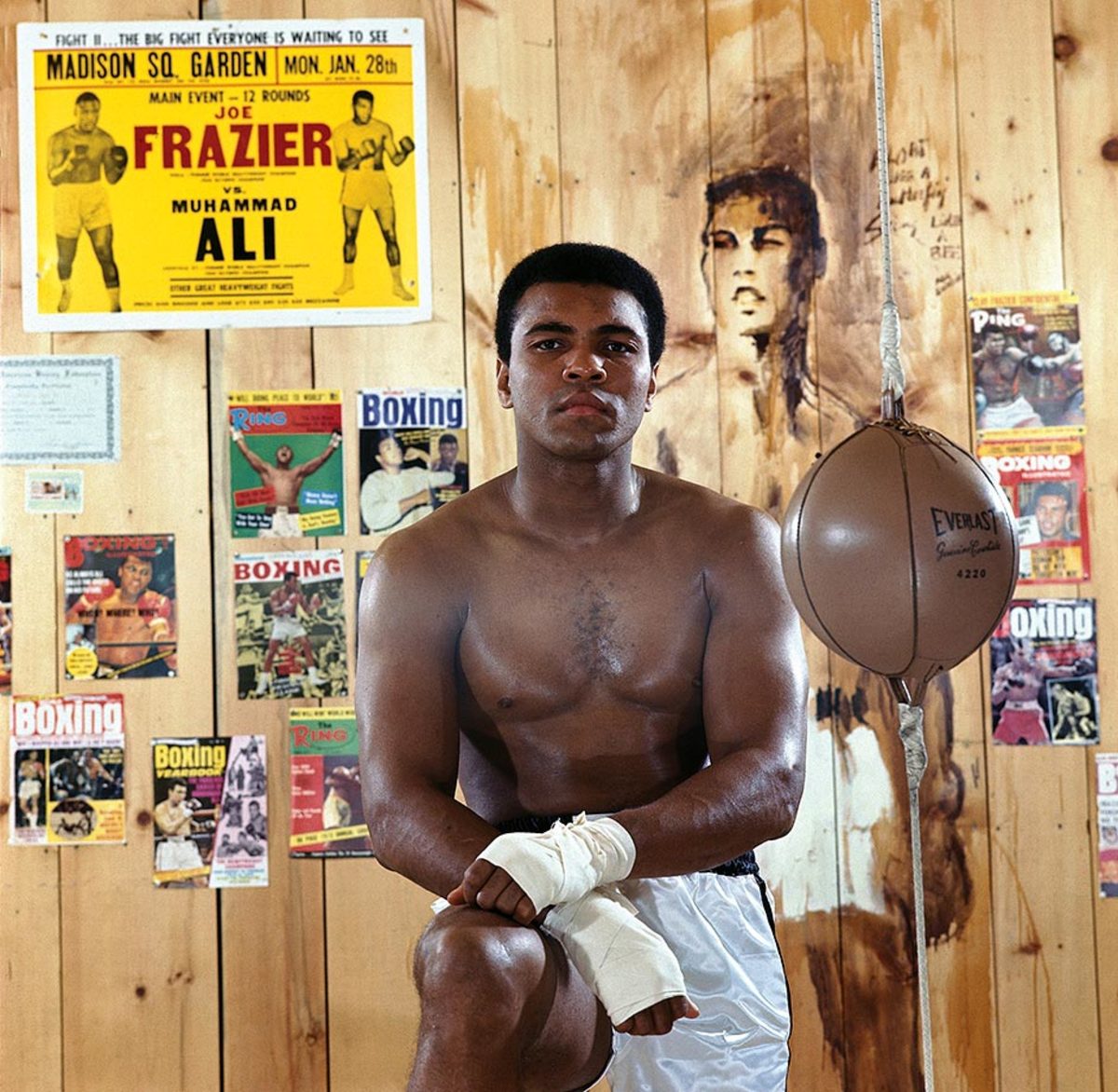
Ali poses in front of posters and magazine covers from throughout his career at his training camp cabin in Deer Lake in 1974.
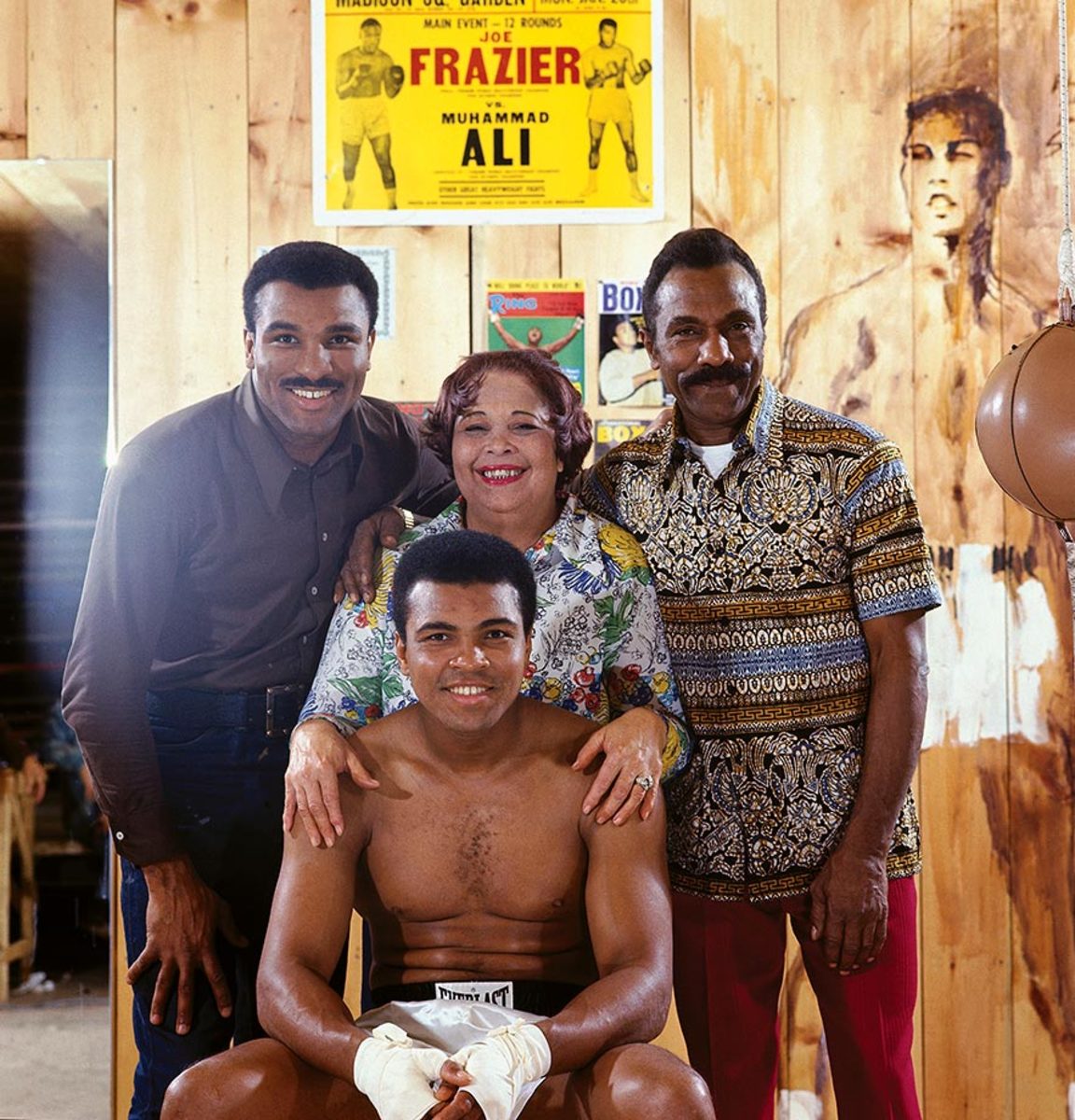
Ali poses with members of his family in front of a poster from his first fight with Joe Frazier. Ali's brother, Rahman Ali; mother, Odessa Clay; and father, Cassius Clay Sr. stand behind the boxer.
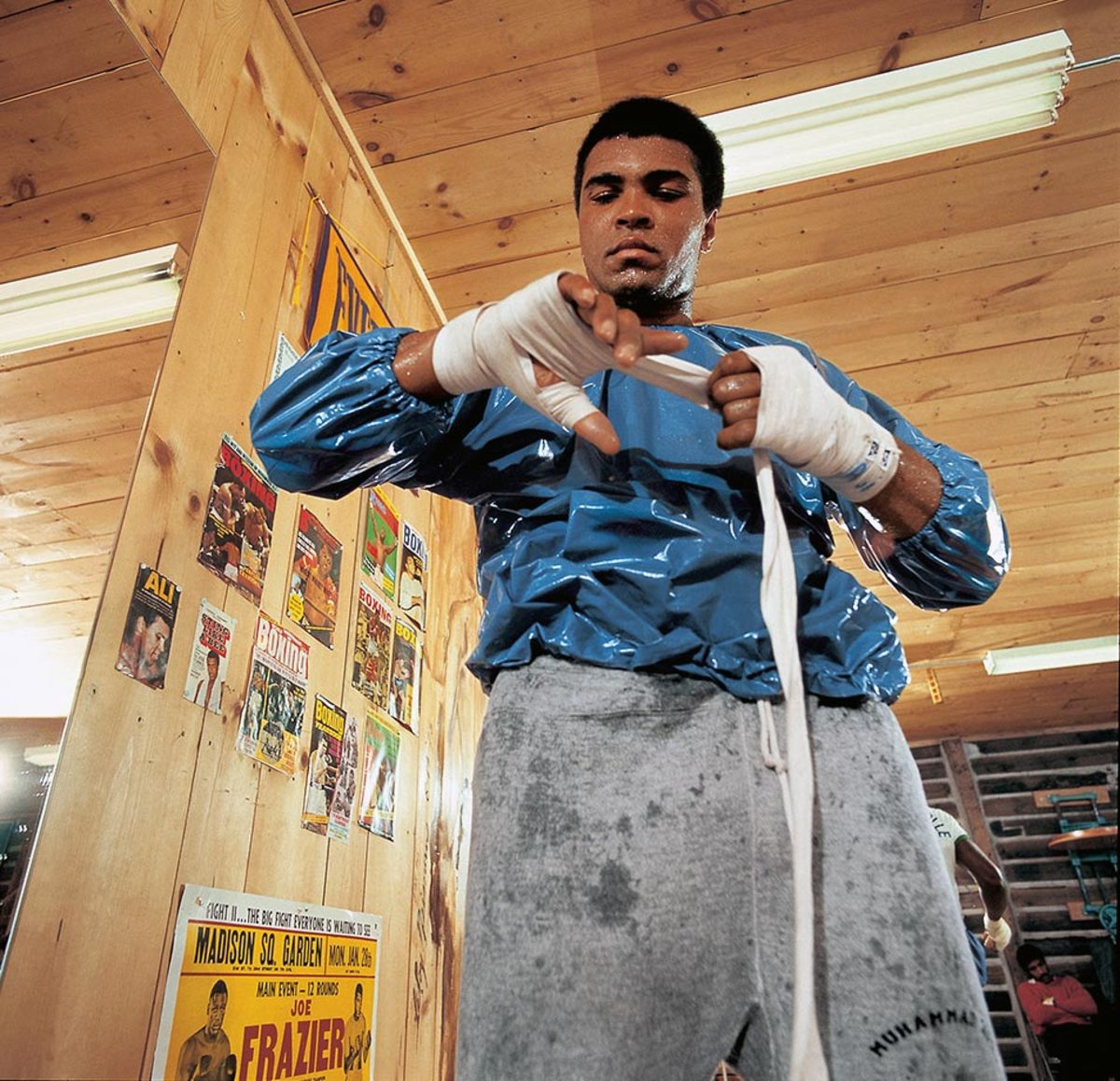
Less than three weeks before his rematch with Joe Frazier on Jan. 28, 1974, Ali wraps his hands while wearing a sauna suit at his training camp cabin.
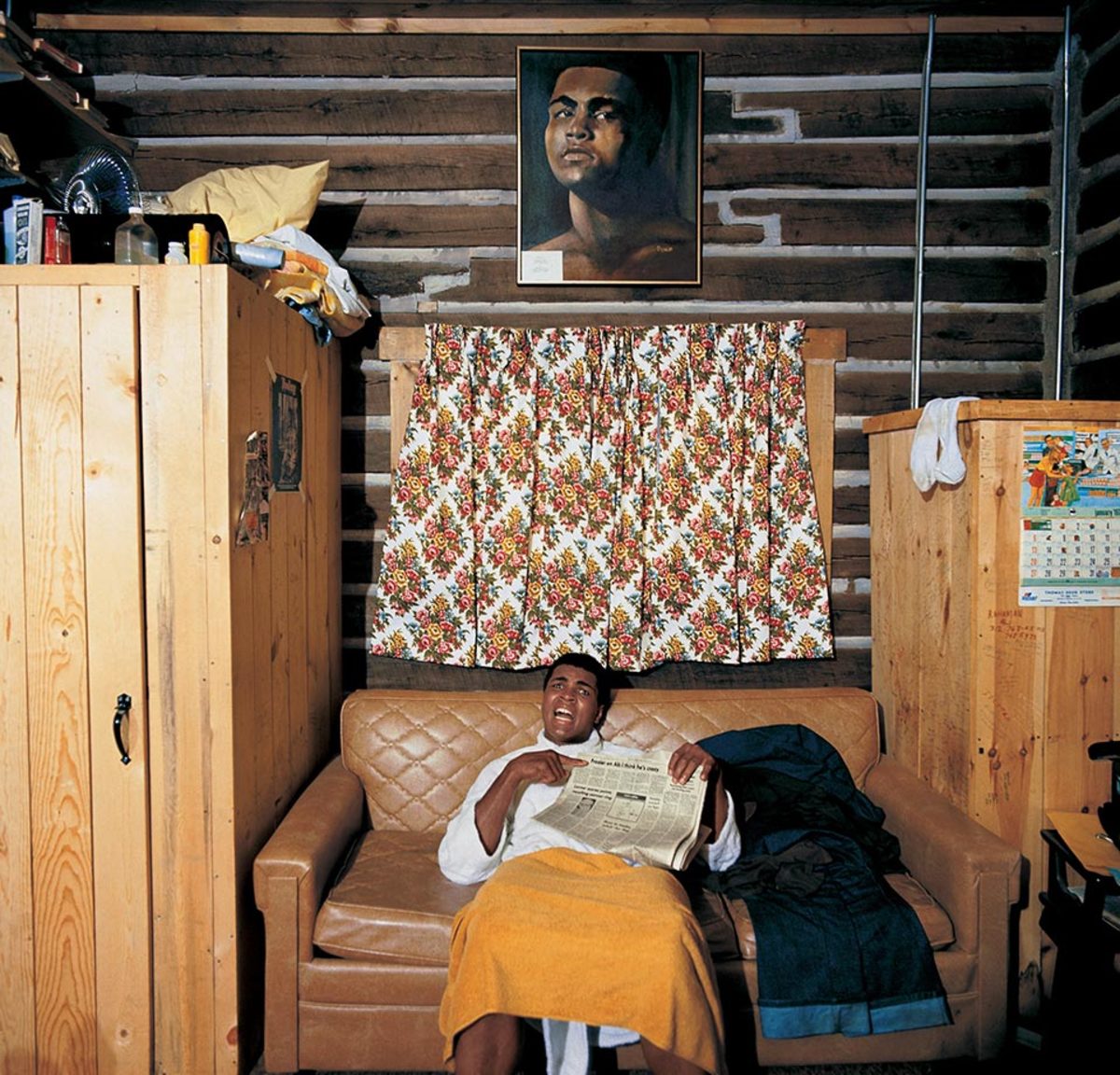
Ali holds a newspaper at his cabin in January 1974. He is pointing to a headline that reads, "Frazier On Ali, I Think He's Crazy." Ali and Frazier fought for the second time later that month with Ali winning by a unanimous decision.
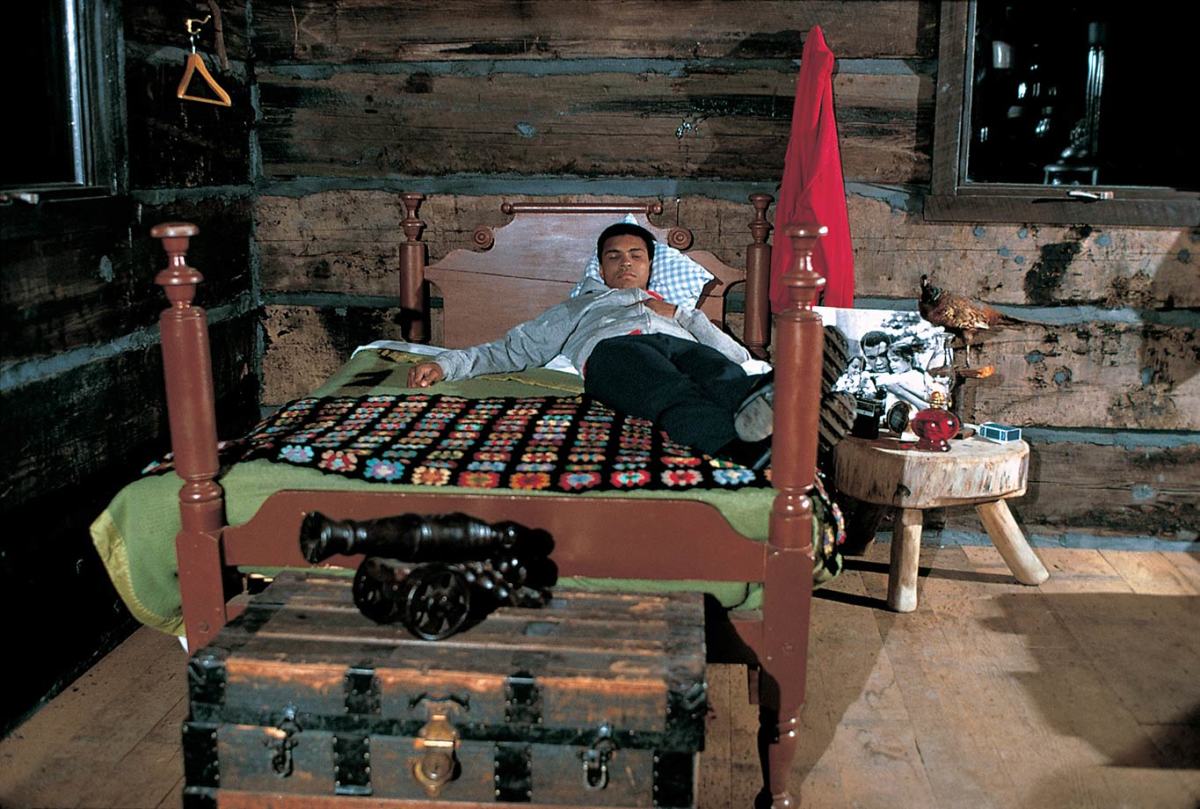
Ali lies on his bed at his cabin during the January 1974 photo shoot.
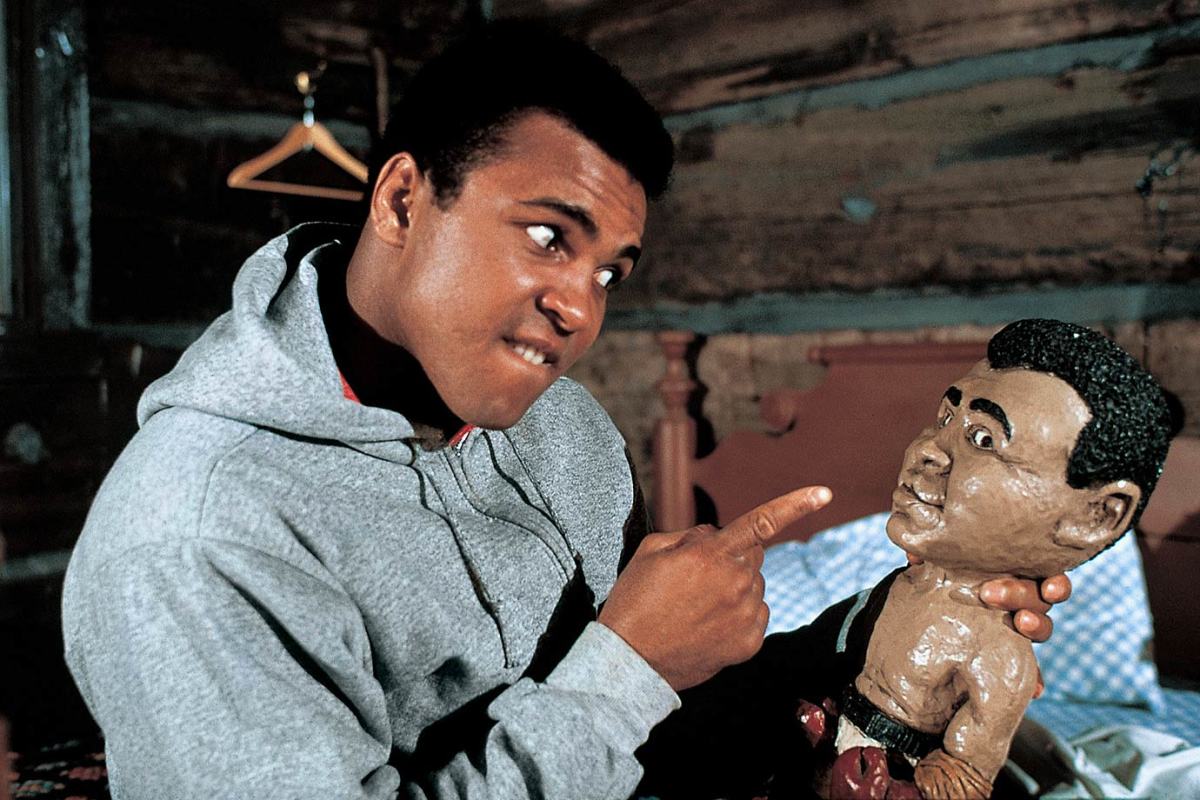
His smaller incarnation stares straight back as Ali plays with a doll of himself during the same 1974 shoot at his training camp cabin.
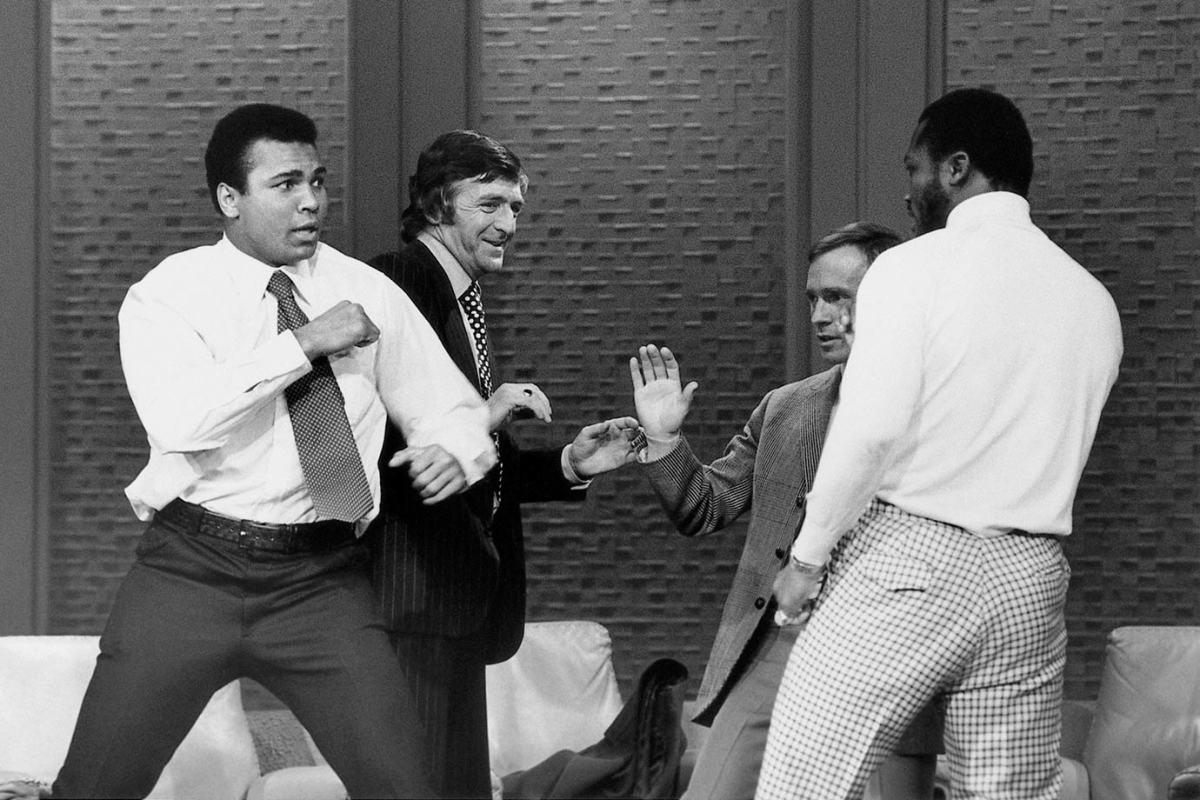
Ali and Joe Frazier fight on the set of The Dick Cavett Show while reviewing their 1971 bout in advance of their 1974 rematch. Ali called Frazier ignorant, to which Frazier took exception. As the studio crew tried to calm Frazier down, Ali held Frazier by the neck, forcing him to sit down and sparking a fight. The television set fight amped up anticipation of their January 1974 bout.
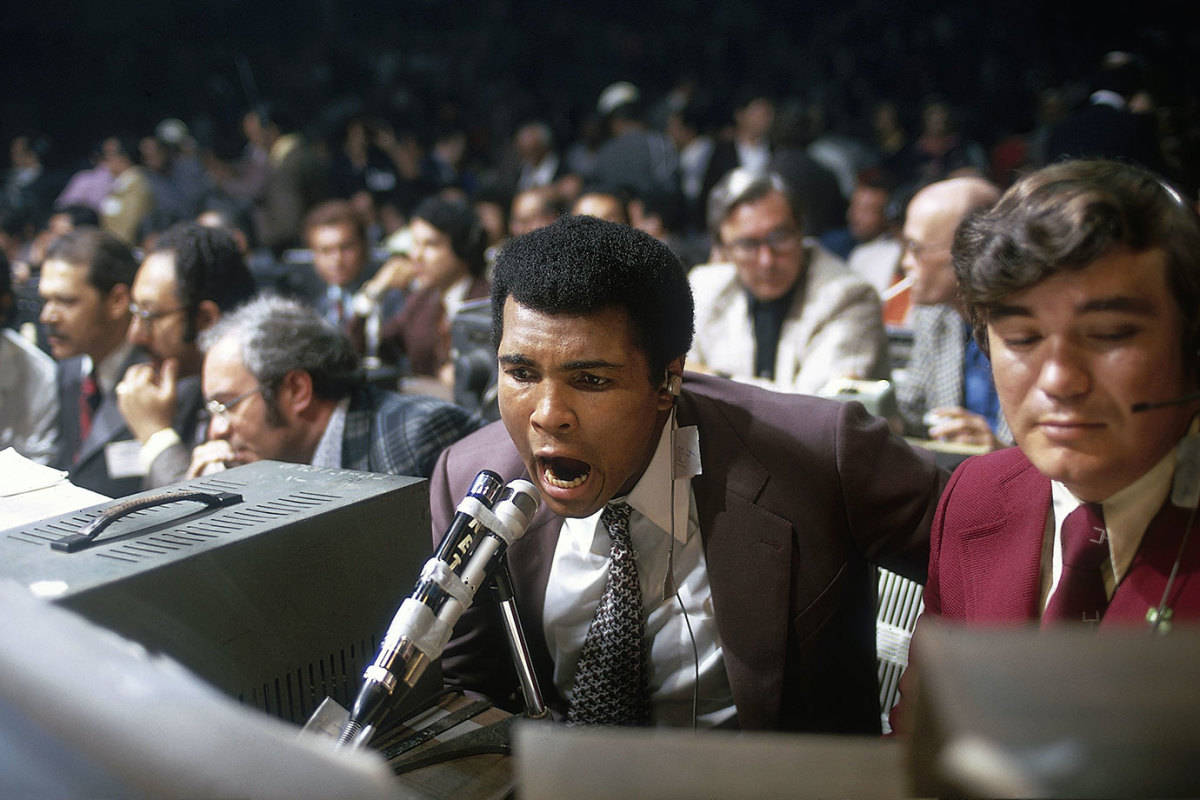
Exploring a different side of the sport, Ali broadcasts the fight between George Foreman and Ken Norton in March 1974. Foreman won the fight by technical knockout in the second round, setting up the showdown with Ali in Zaire.
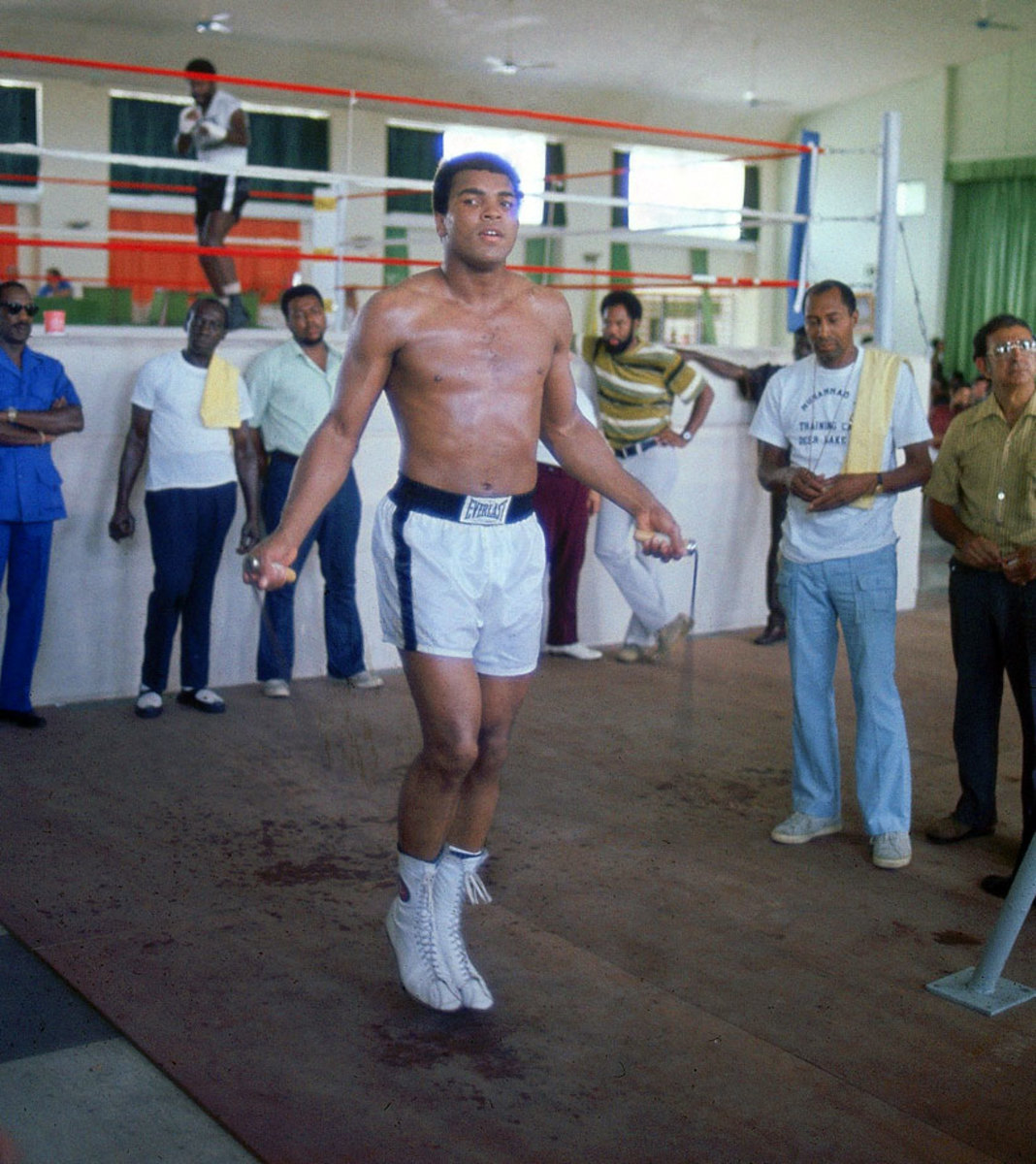
Ali jumps rope at the Salle de Congres in Kinshasa, Zaire, while training for his heavyweight title fight against George Foreman. Both Ali and Foreman spent most of the summer of 1974 training in Zaire to adjust to the climate.
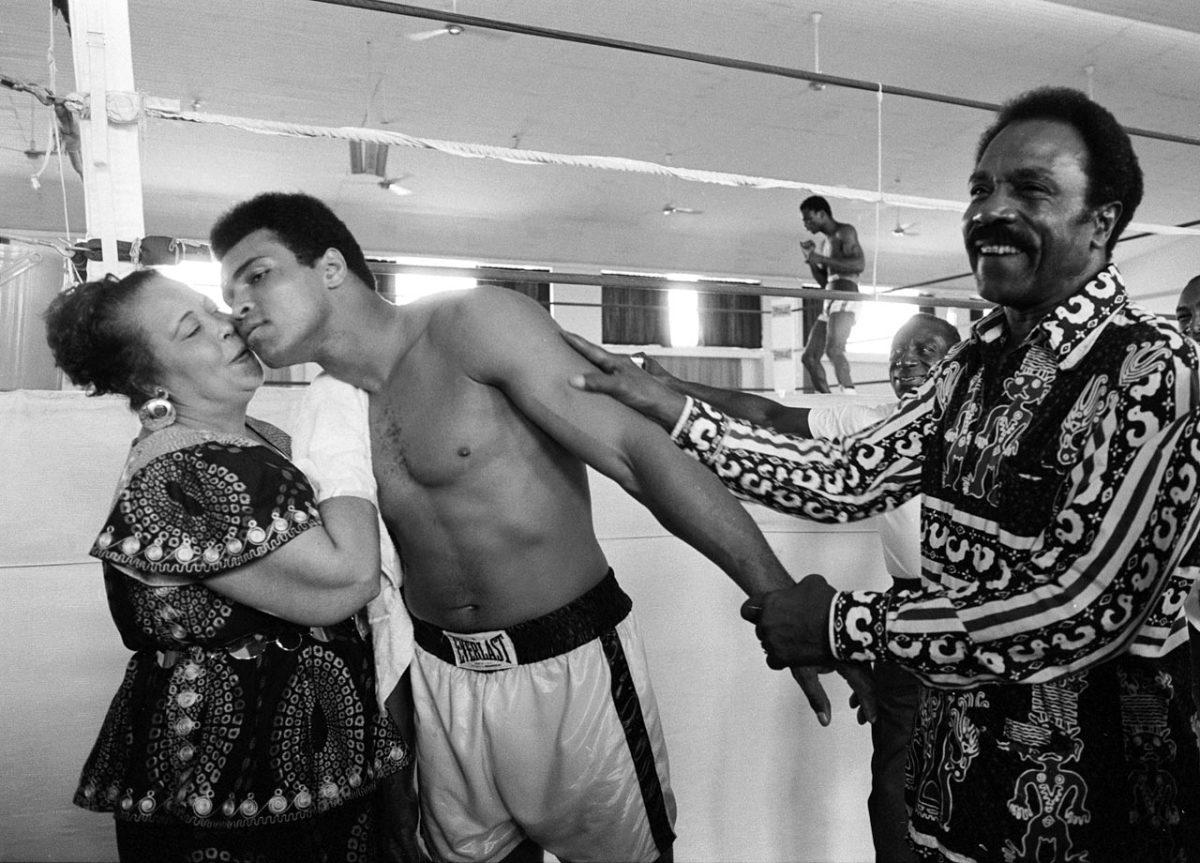
While training before his fight with George Foreman, Ali kisses his mother, Odessa Clay, while his father, Cassius Clay Sr., looks on. Ali's superior strategy and ability to take a punch led him to his upset victory as he absorbed body blows from Foreman before he responded with powerful combinations to Foreman's head.
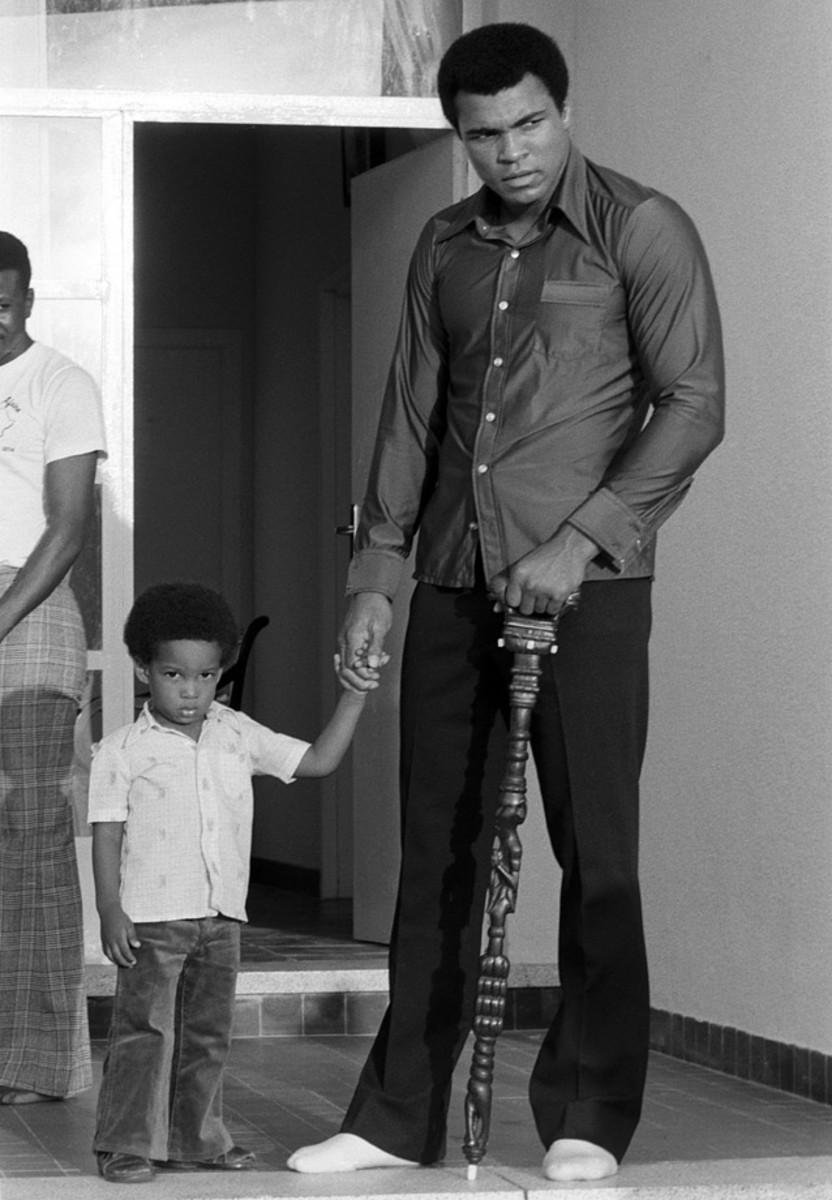
Four days before the fight, Ali holds the hand of his son Ibn in Zaire. Ali successfully courted the favor of the Zaire crowd, prompting chants of "Ali bomaye!" — translated as "Ali, kill him!"
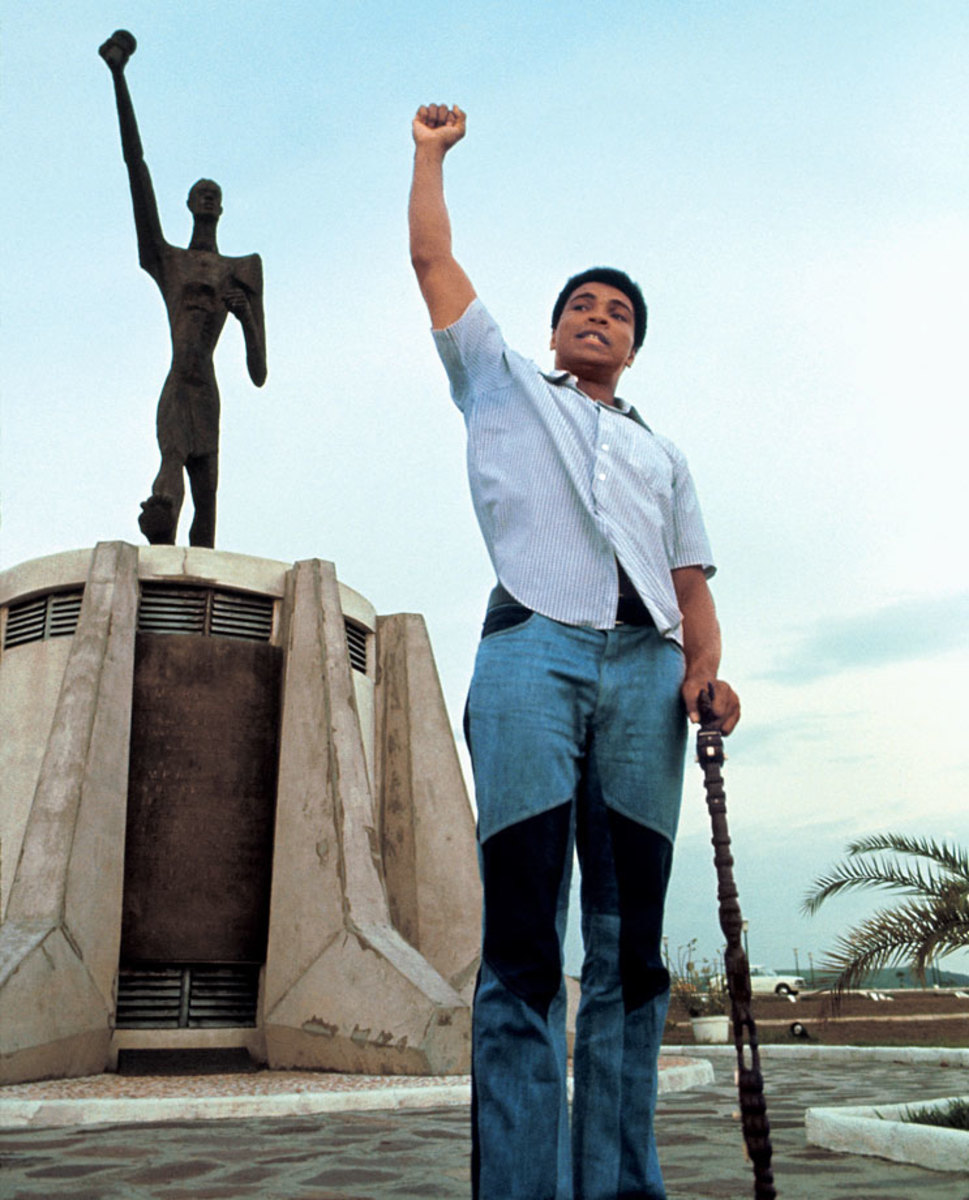
Ali poses in front of the Le Militant statue at the presidential complex that was the site of Ali's January heavyweight title bout with Foreman. The fight was originally set for a month earlier, but Foreman suffered a cut near his eye during training, forcing a delay.
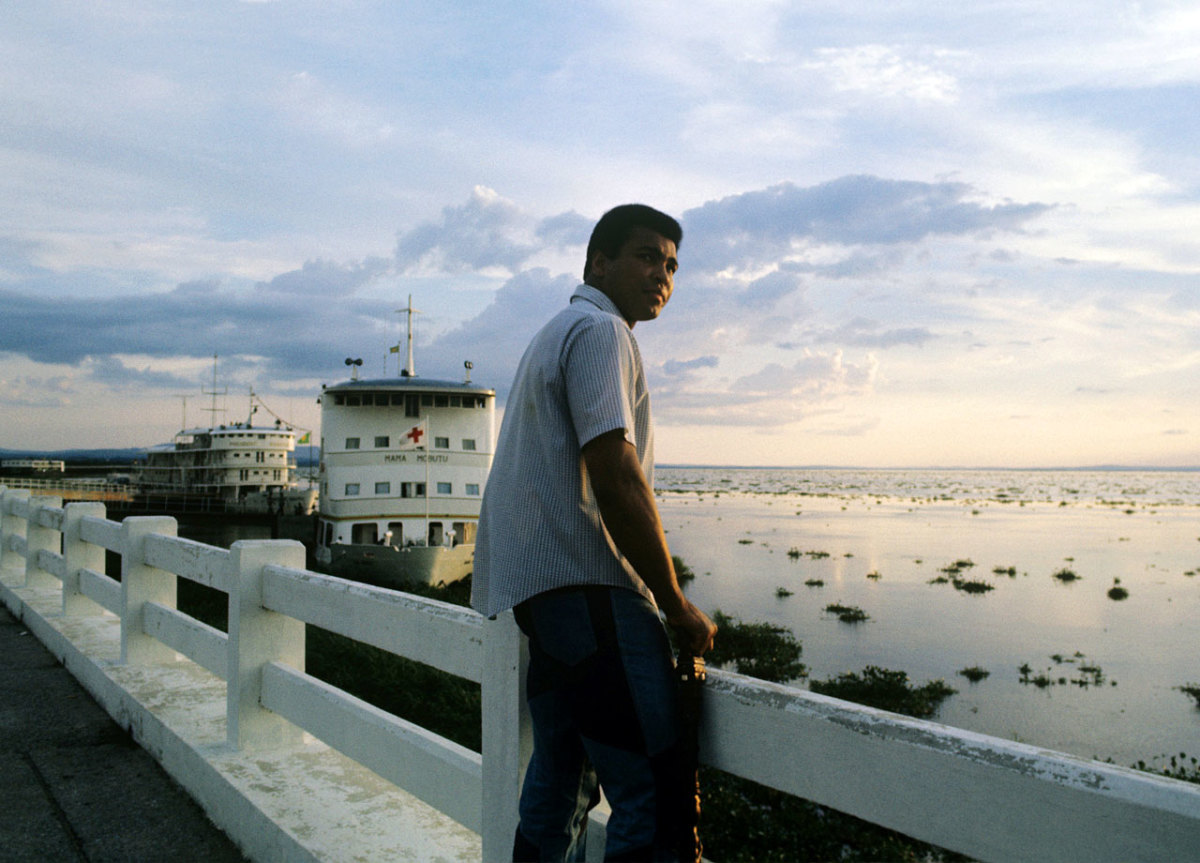
Ali stands against the railing on the River Zaire watching the sunset four days before the Rumble in the Jungle. The fight was sponsored by Zaire to achieve the $5 million purse promoter Don King had promised both Ali and Foreman.
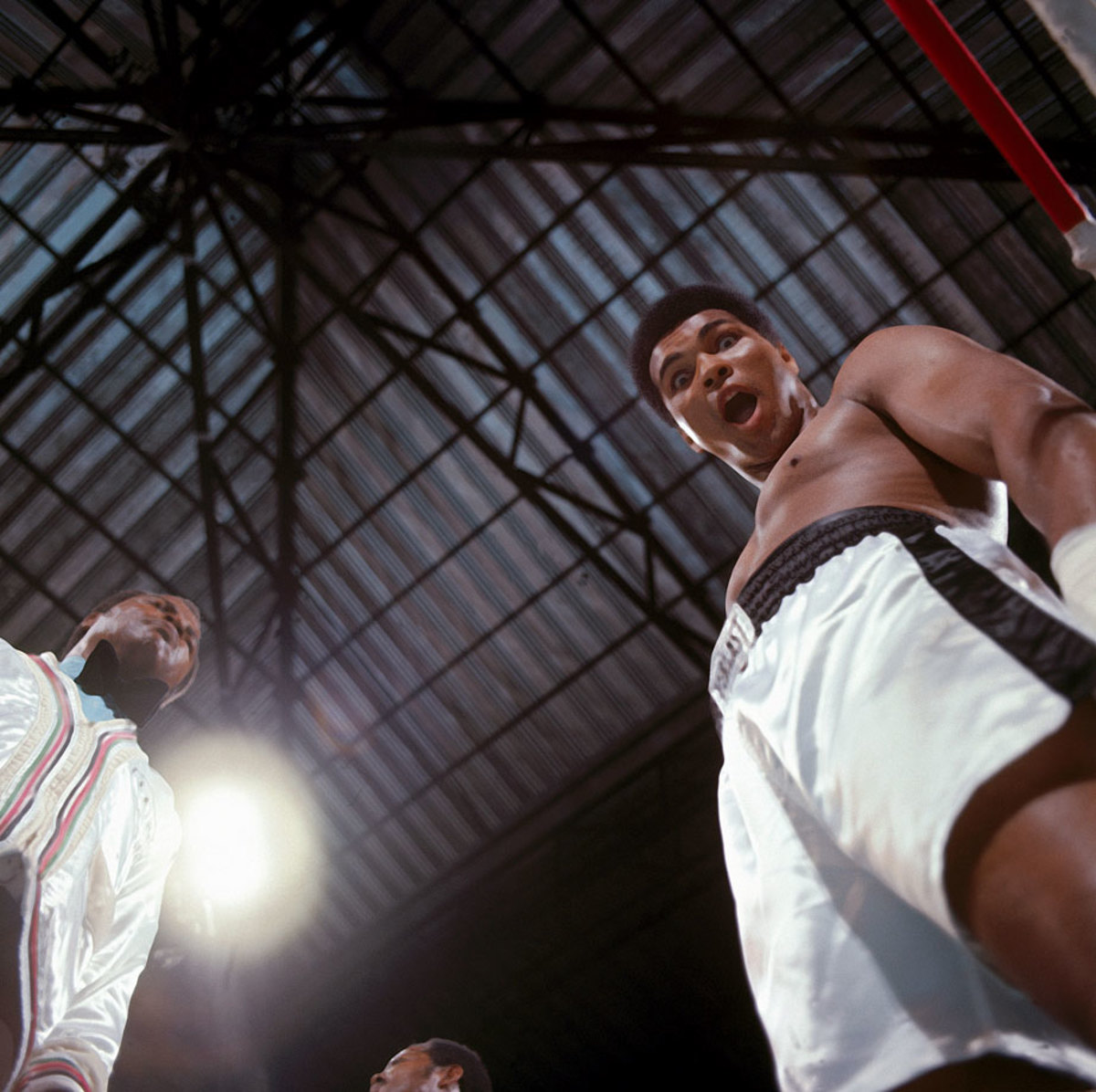
Before employing his famous rope-a-dope strategy against Foreman, Ali makes a face at the camera. Ali allowed Foreman to throw many punches but only into his arms and body, and when Foreman tired himself out from the mostly ineffective punches, Ali took control of the fight.
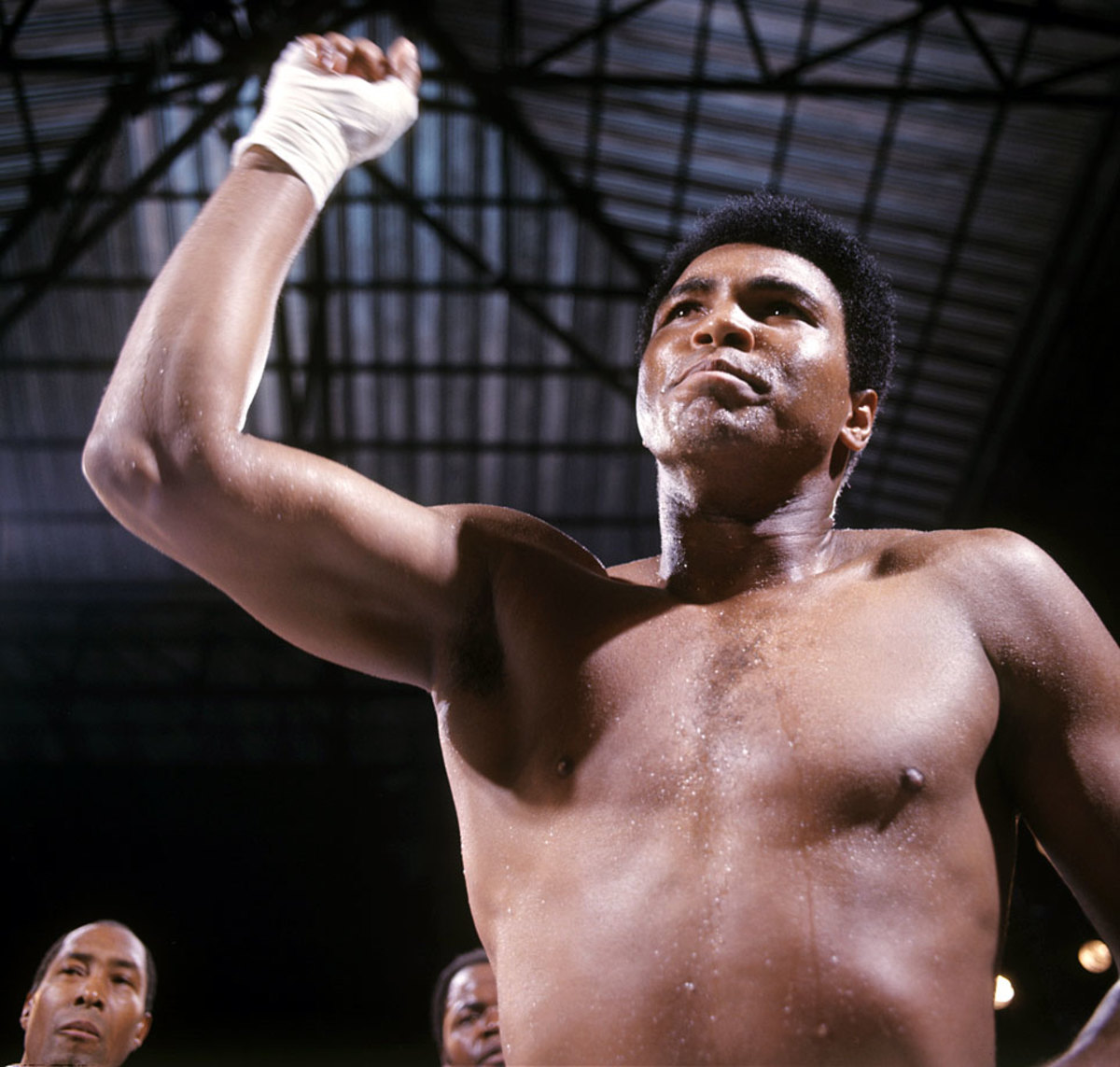
Ali points before his bout with Foreman. The victory over his favored opponent made him the heavyweight champion of the world for the first time since he was stripped of his titles in 1967.
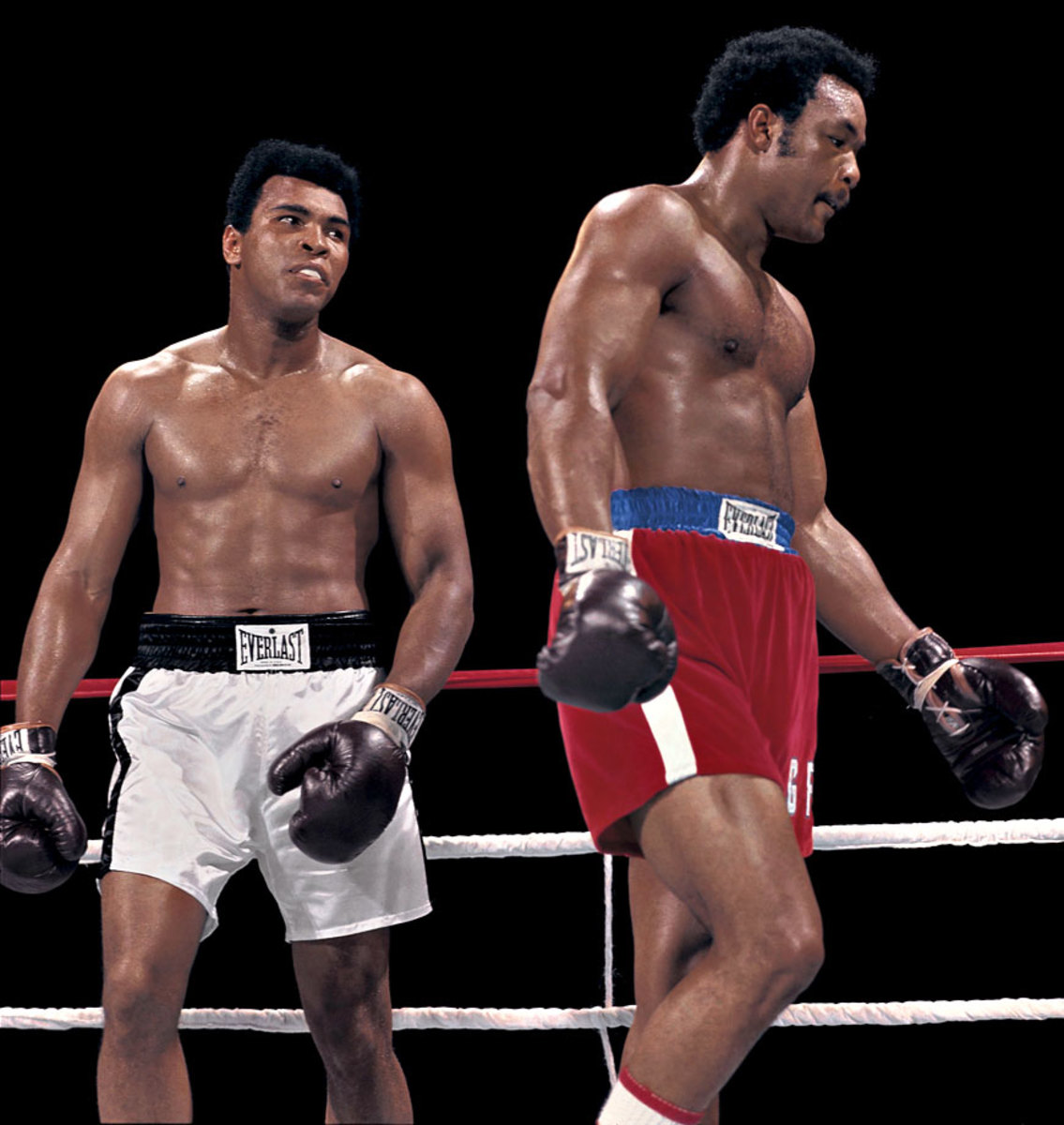
Ali stares at George Foreman during the Rumble in the Jungle. Ali earned his shot at the heavyweight title by defeating Joe Frazier in January 1974, avenging a loss three years earlier.
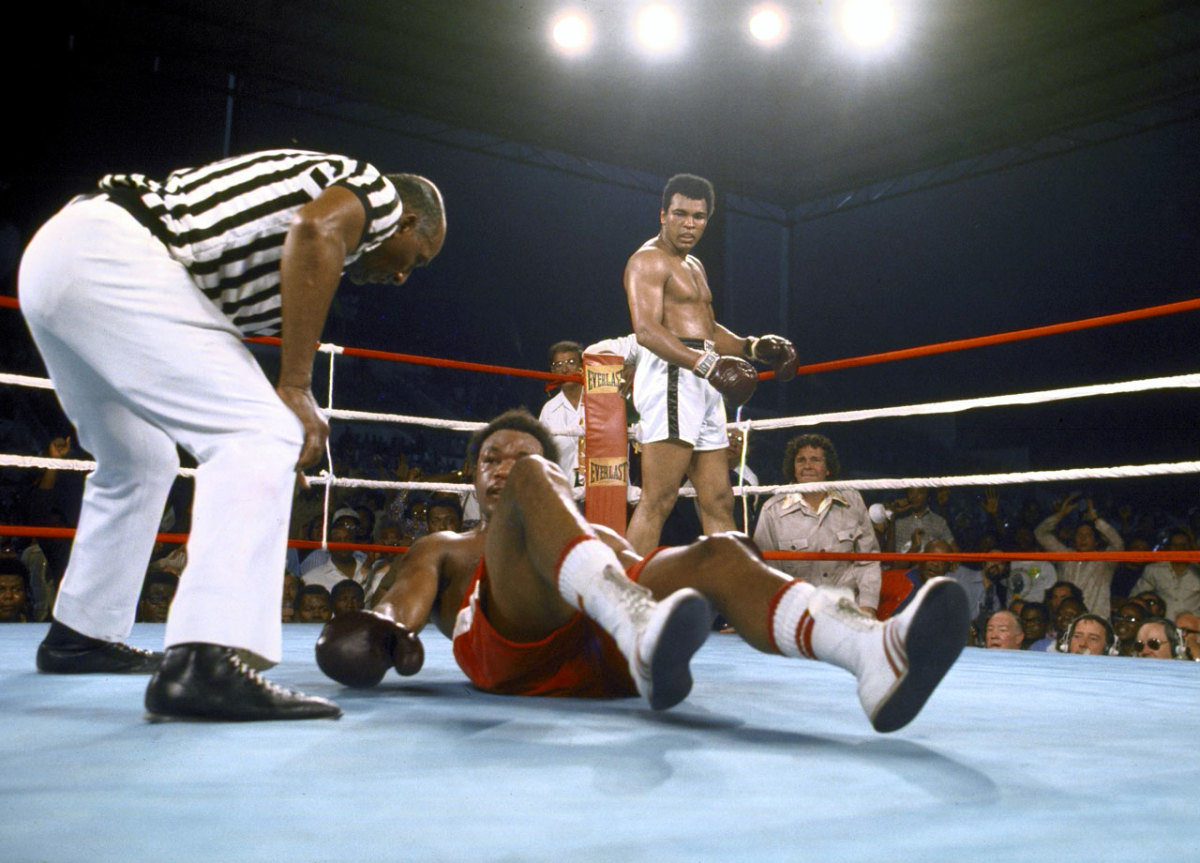
Foreman lies down on the canvas as Ali stands in the background during the Rumble in the Jungle. Ali knocked Foreman down with a five-punch combination in the eighth round, and referee Zack Clayton counted him out.
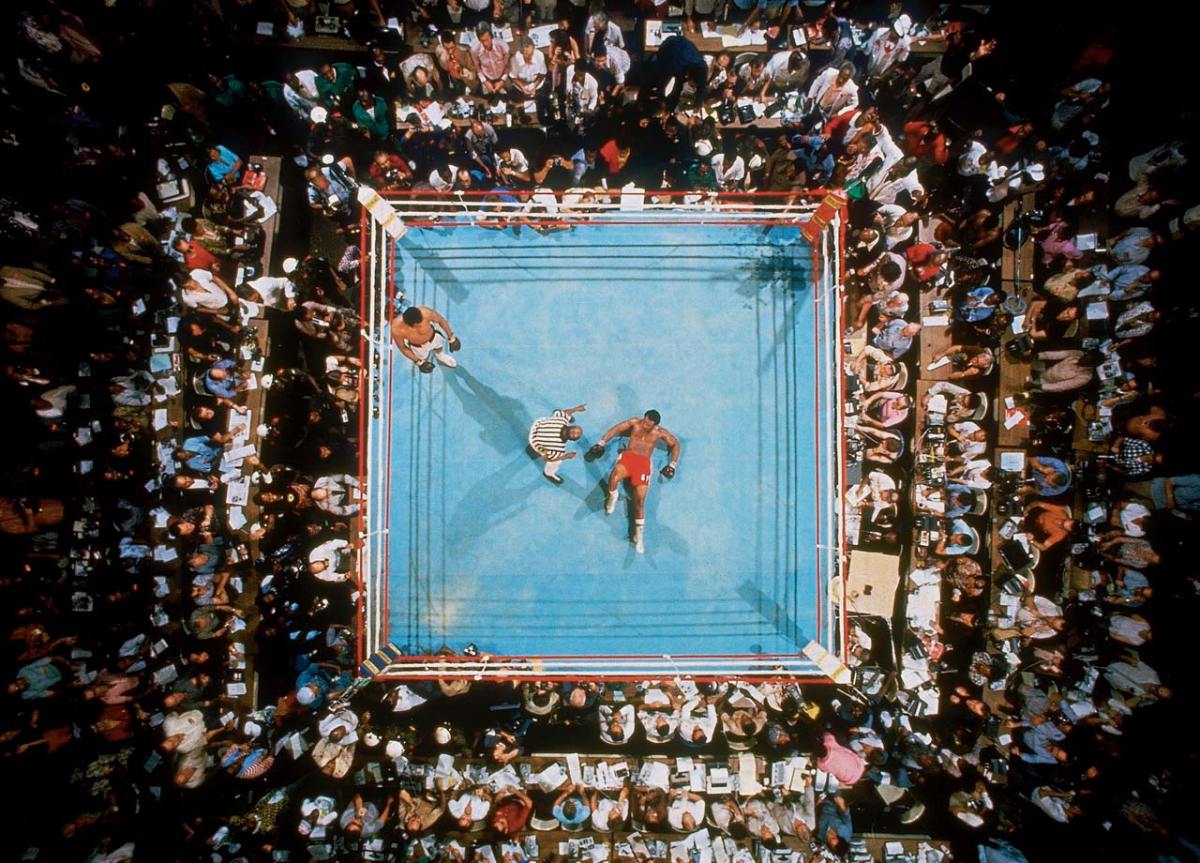
Big George stares at the ceiling as referee Zack Clayton counts him out in the eighth round. The victory made Ali, once again, the heavyweight champion of the world.
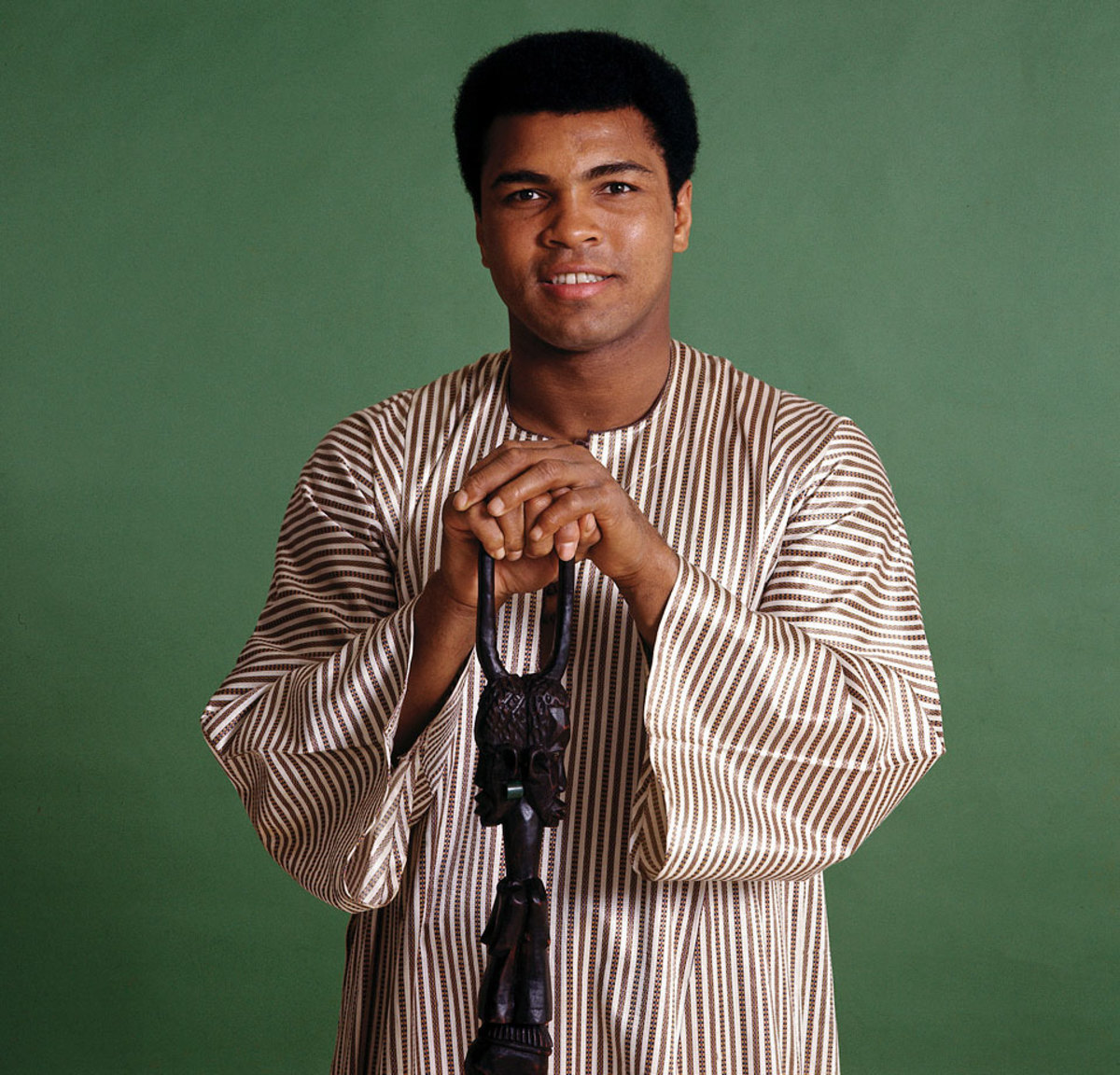
Ali poses for a portrait after being selected as the Sports Illustrated Sportsman of the Year in 1974. Ali wore a dashiki, a men's garment widely worn in West Africa. He also brought the walking stick given to him by Zaire's president.
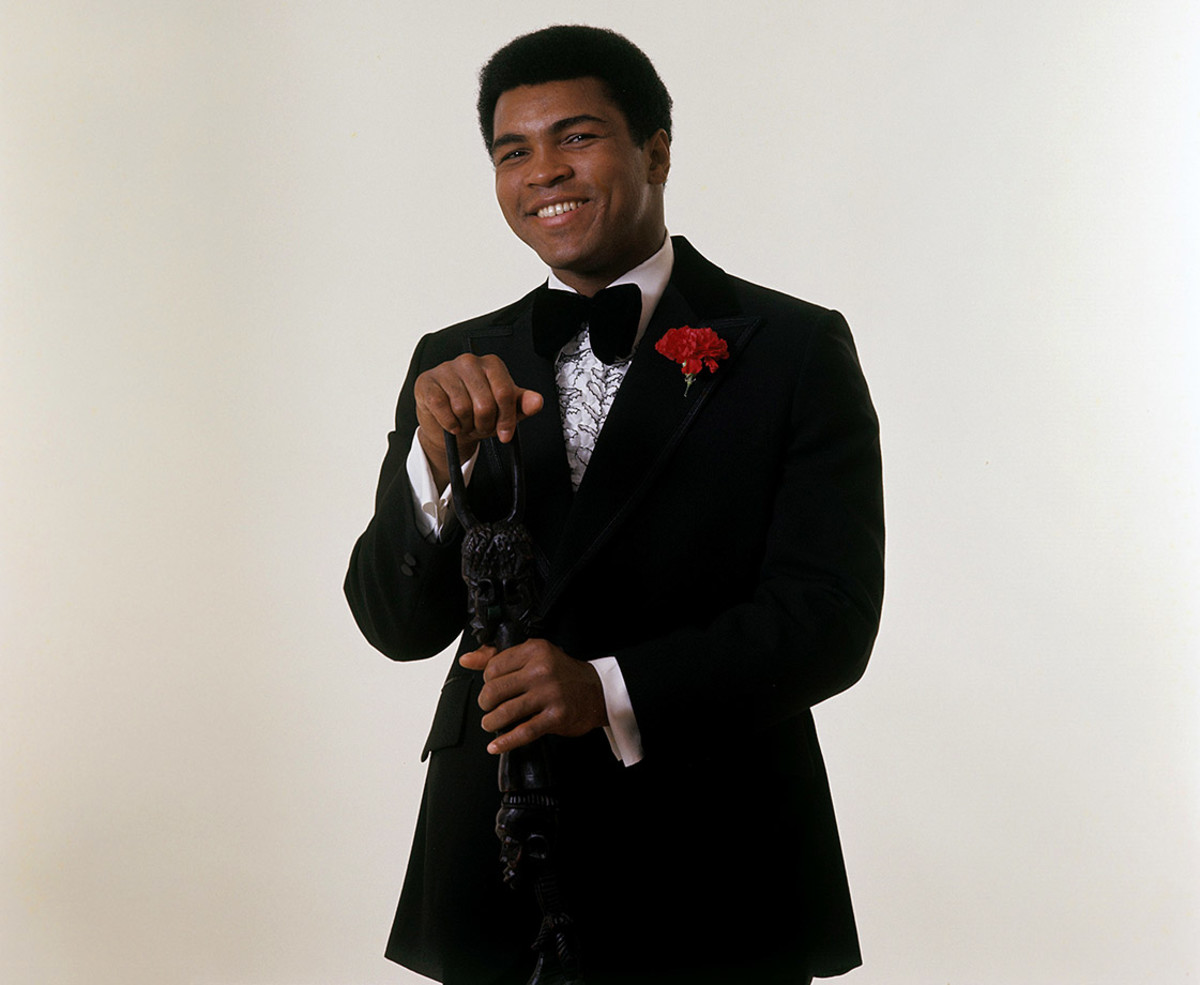
This time Ali wears a tuxedo, but keeps the walking stick, during the November photo shoot for Sports Illustrated's Sportsman of the Year.
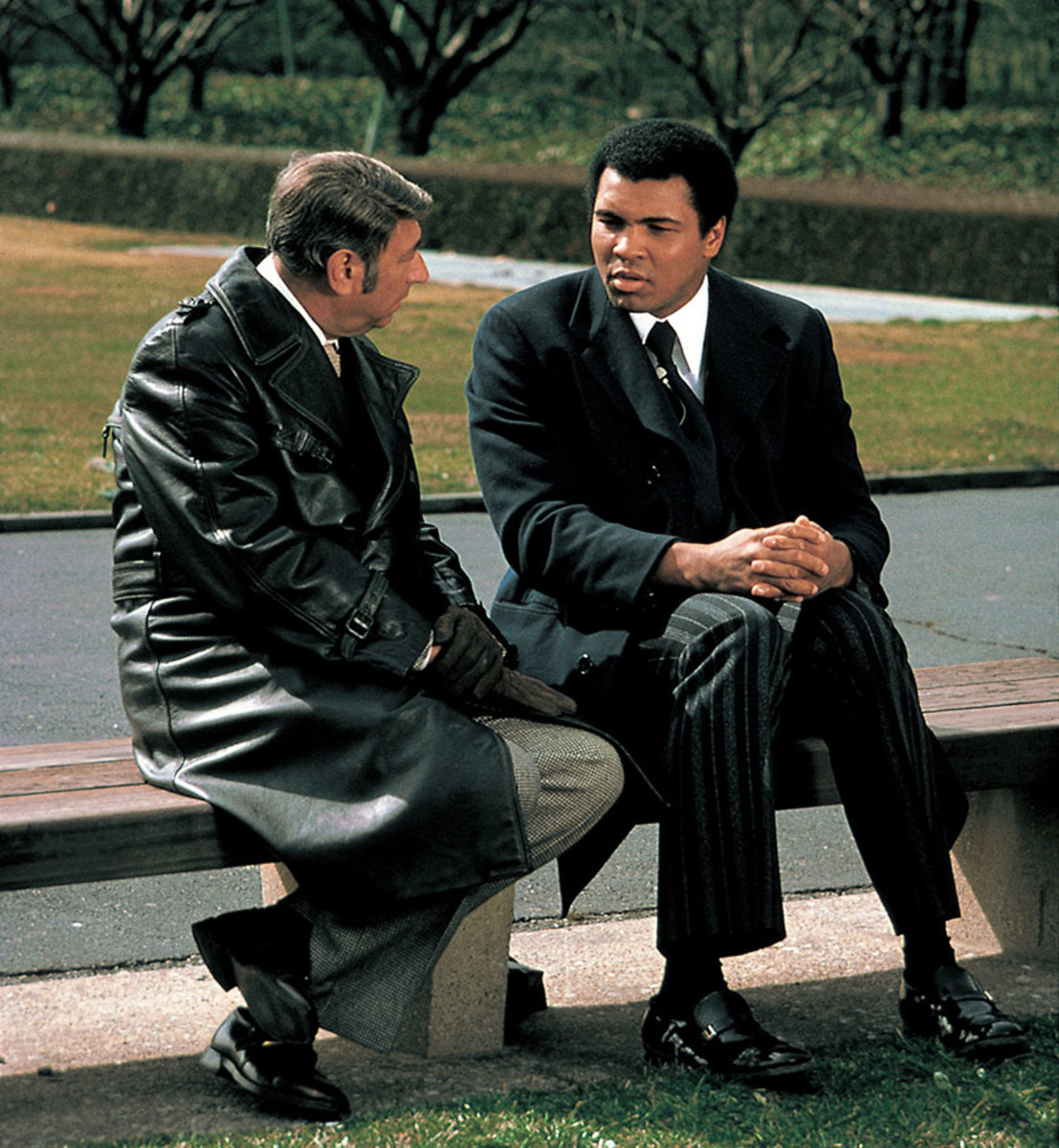
Ali talks with Howard Cosell outside of the United Nations Headquarters for a segment on the Wide World of Sports. Later that day, Ali held a press conference to announce that he would donate part of the proceeds from his fight against Chuck Wepner to help Africans in the Sahel drought.
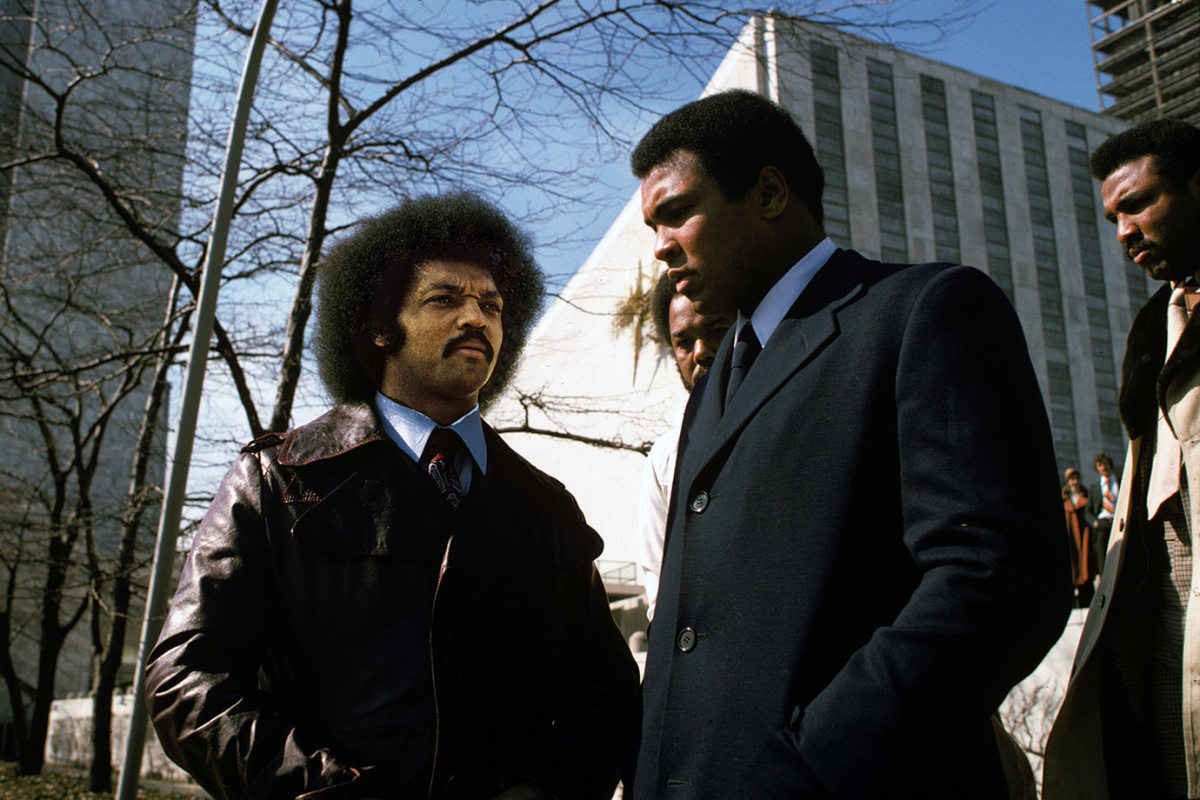
Ali talks with Reverend Jesse Jackson outside of the United Nations Headquarters before a press conference to announce that he would donate part of the proceeds from his fight against Chuck Wepner to help Africans in the Sahel drought.
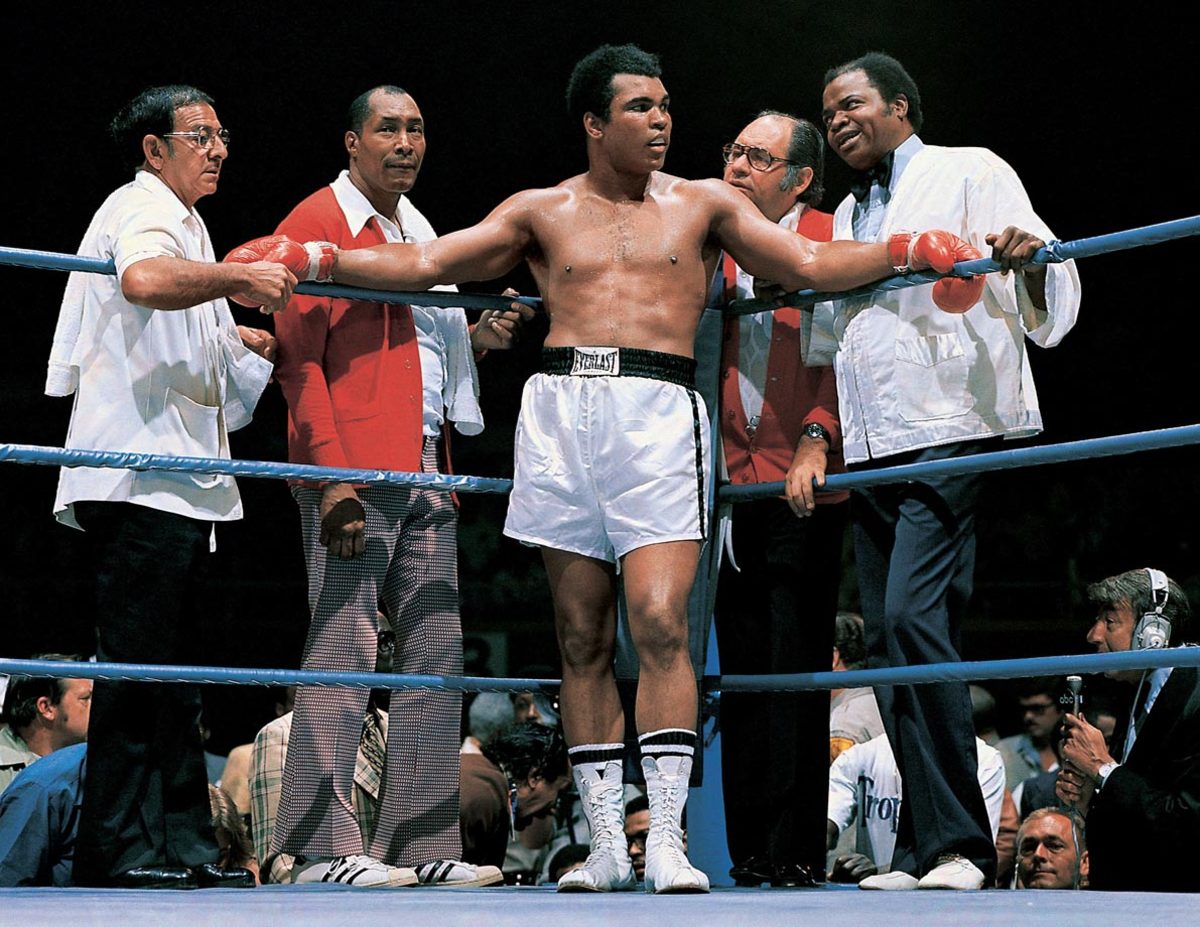
Ali stands with trainer Angelo Dundee, assistant trainer Wali Muhammad, physician Dr. Ferdie Pacheco and assistant trainer Drew Bundini Brown before his bout with Ron Lyle in May 1975. Ali won the fight by technical knockout in the 11th round.
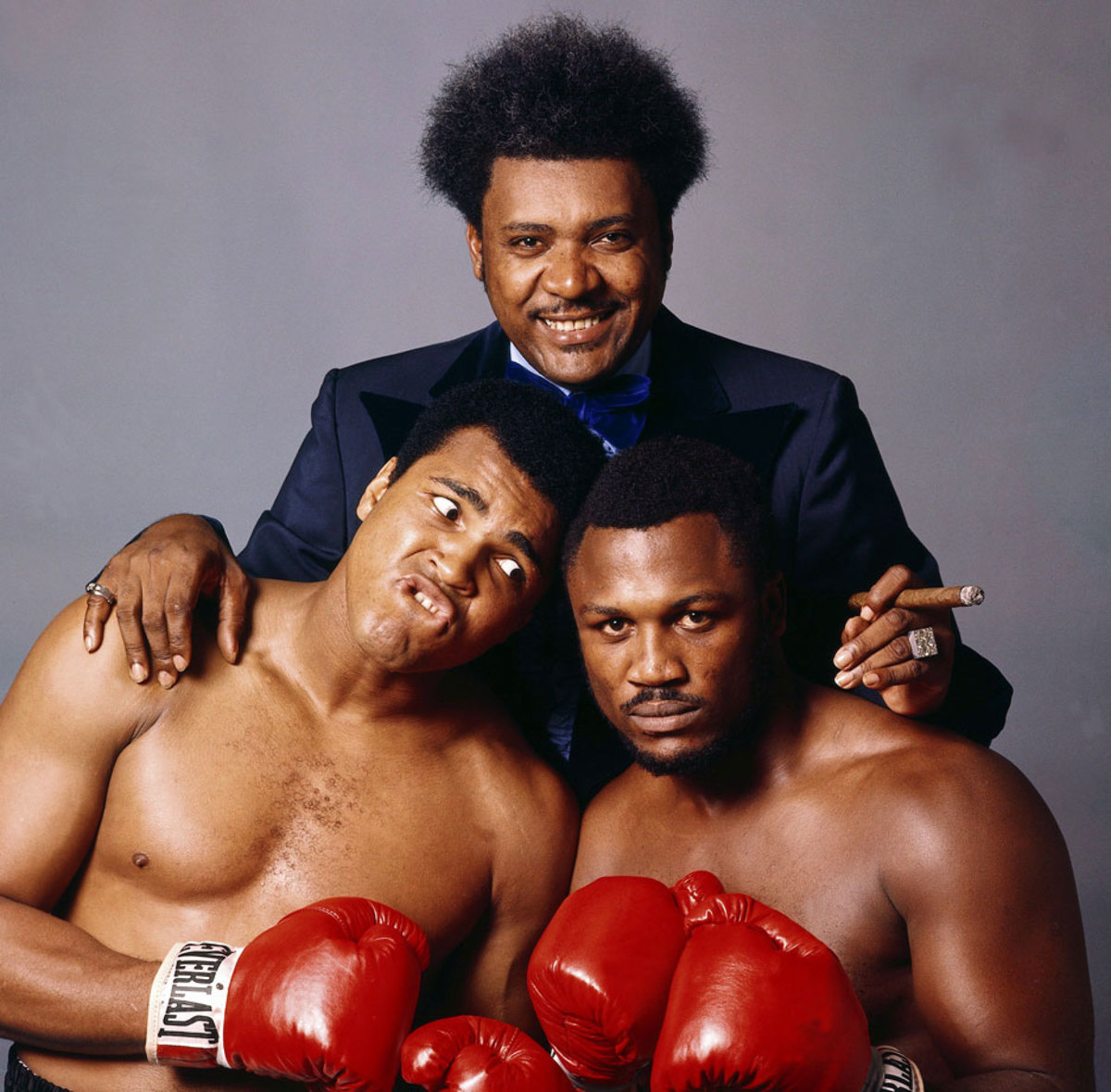
Along with Don King and Joe Frazier, Ali sat for a portrait leading up to the Thrilla in Manila. Ali verbally abused Frazier during the buildup to the fight, telling the media that "it will be a killa and a thrilla and a chilla when I get the gorilla in Manila."
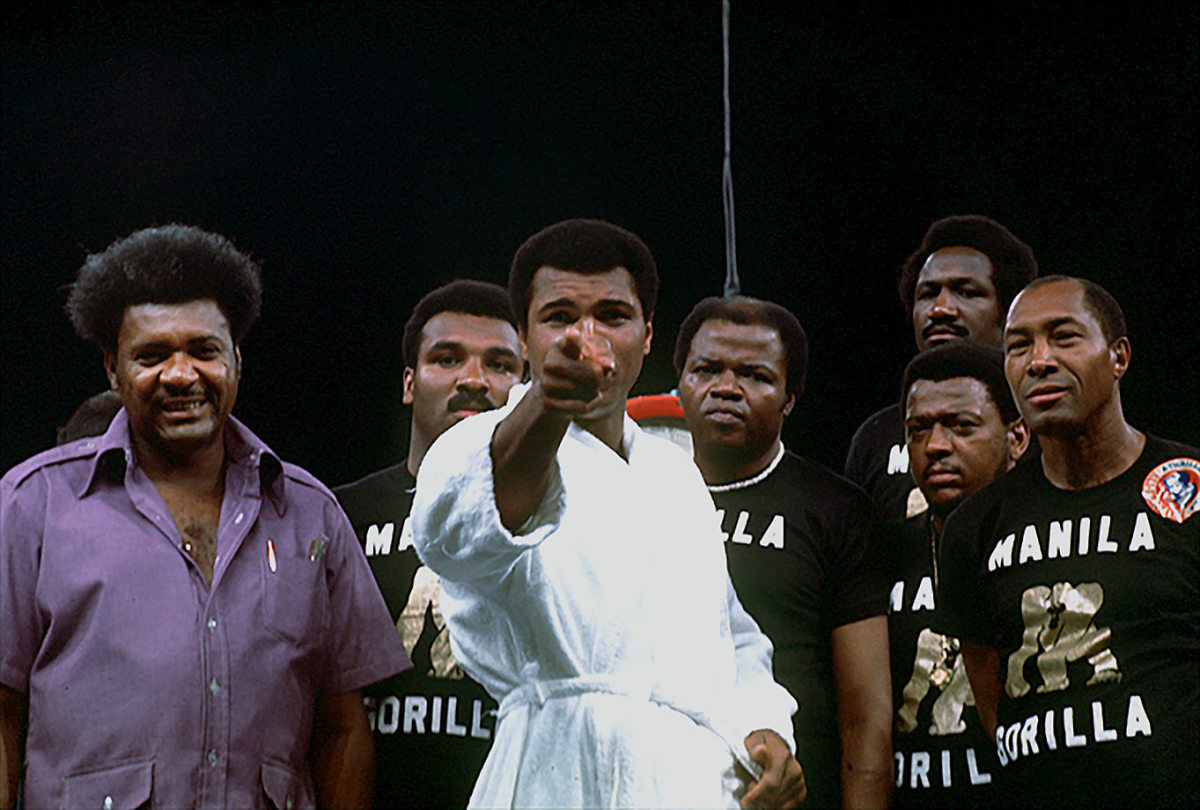
Ali points at the camera with Don King and his training staff behind him before the weigh-in for the Thrilla in Manila in October 1975. Philippine president Ferdinand Marcos offered to sponsor the bout and hold it in Metro Manila to divert attention from the turmoil in the country that had forced the imposition of martial law in 1972.
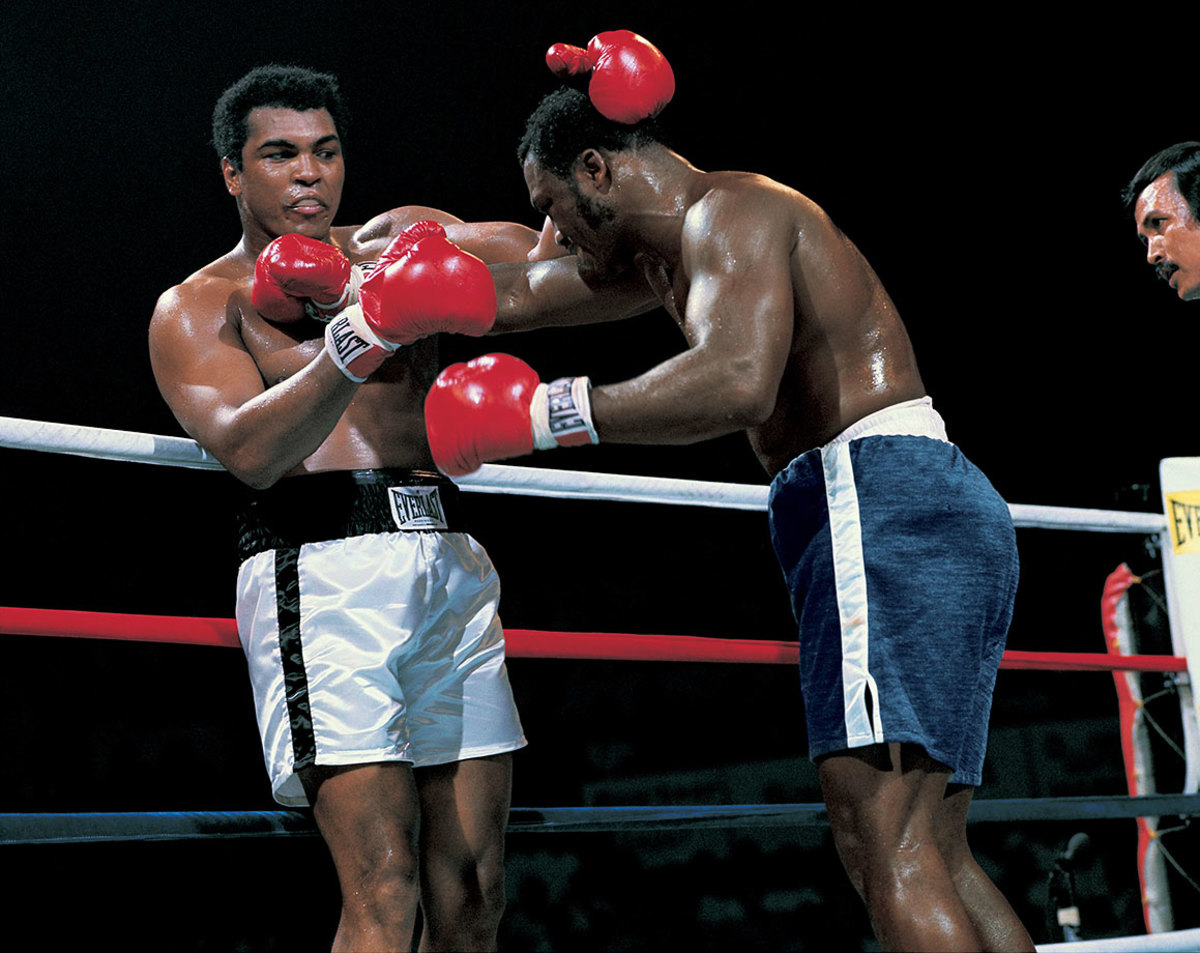
Wrapping up Joe Frazier proved more difficult than Ali expected, having thought Frazier would represent an easy payday and be unable to live up to his billing. The fight turned out to be a brutal affair.
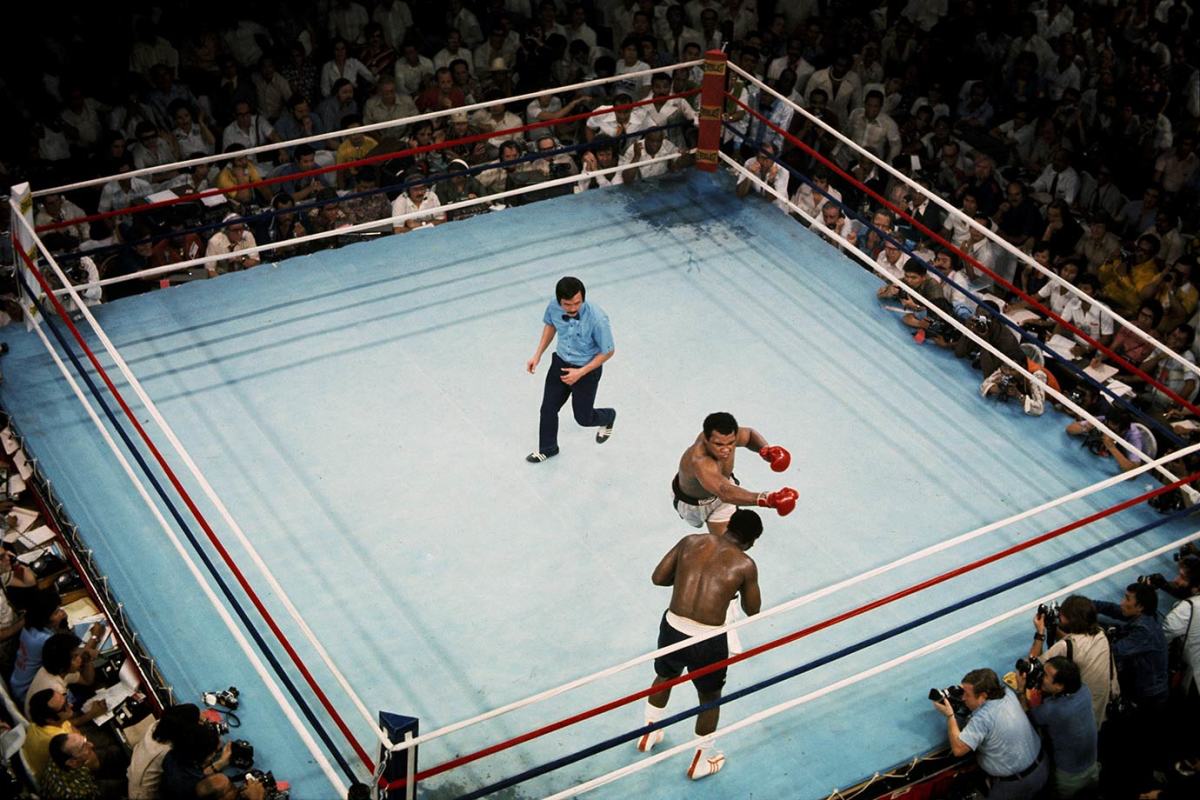
Frazier faces an Ali right hook in their fight in Quezon City, Philippines. The two fighters traded vicious blows during their 14 rounds. "Man, I hit him with punches that'd bring down the walls of a city," Frazier said. Ali withstood the blows to win by TKO in the 15th round.
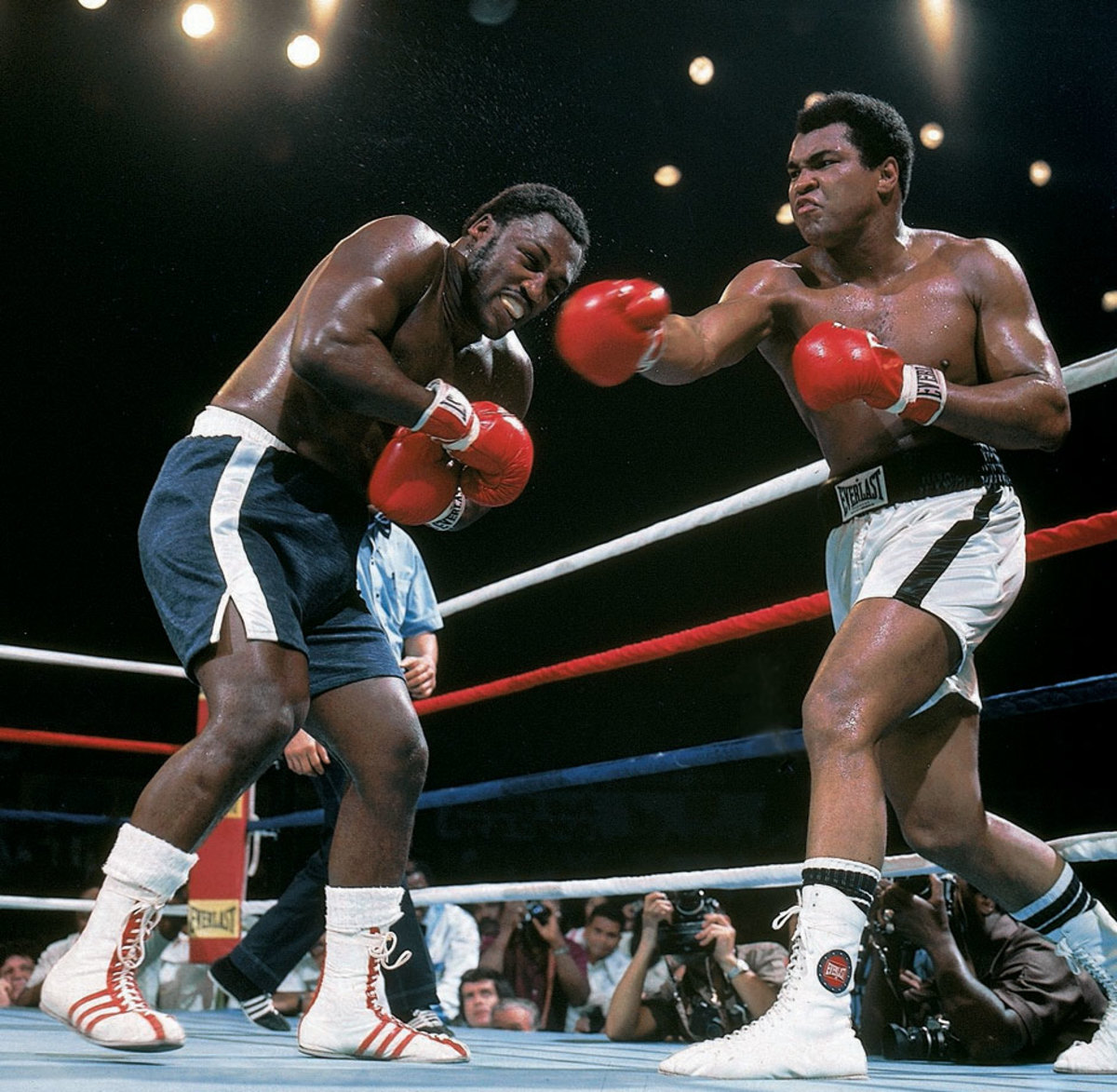
The third fight between Ali and Frazier, Ali won the bruising battle between the two powerful punching heavyweights when Frazier's trainer, Eddie Futch, stopped the fight before the 15th round.
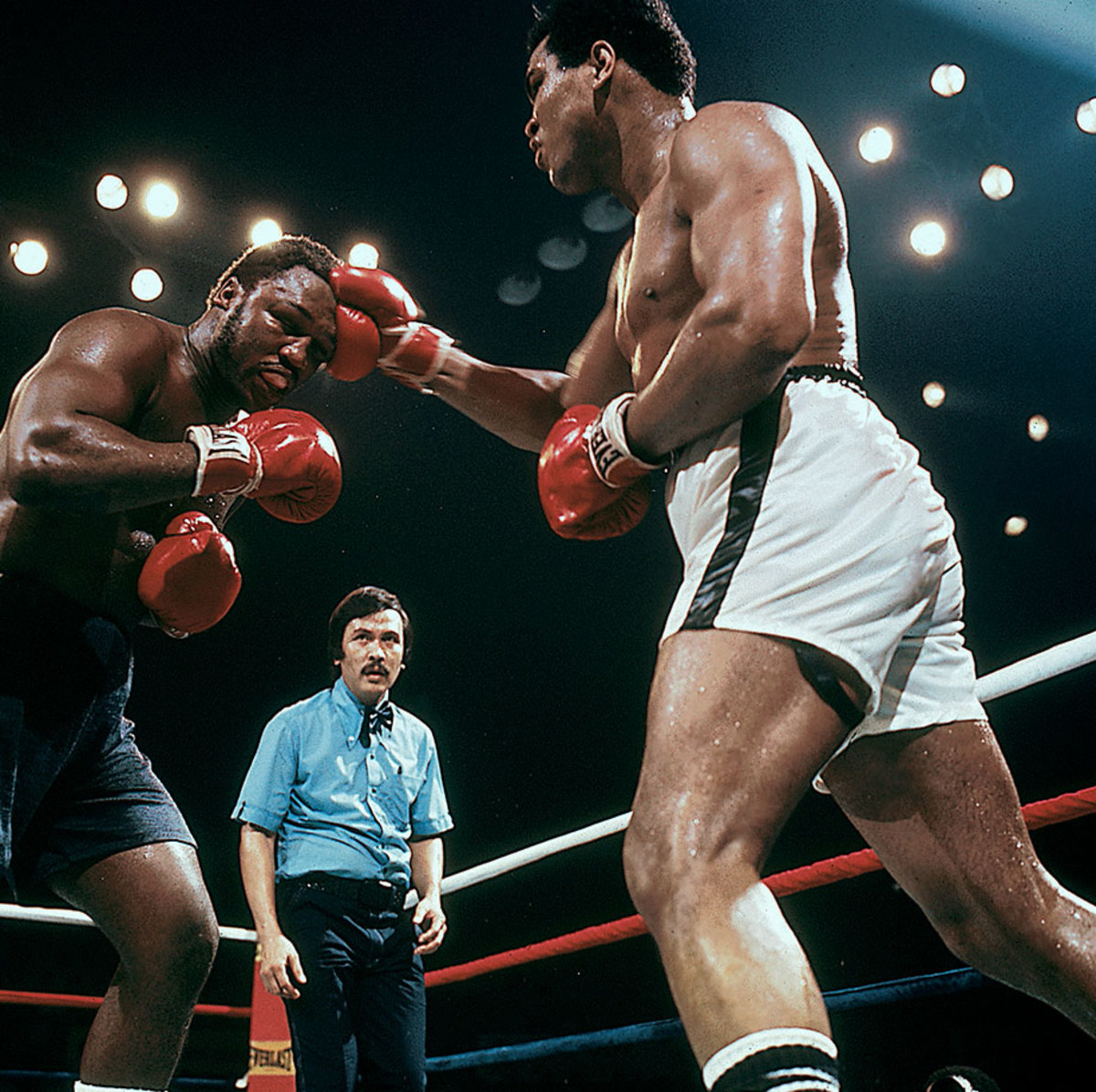
A back and forth exchange, Ali controlled the early rounds of the Thrilla in Manila before Frazier fought back with powerful hooks. Ali finished strong, regaining momentum in the later rounds.
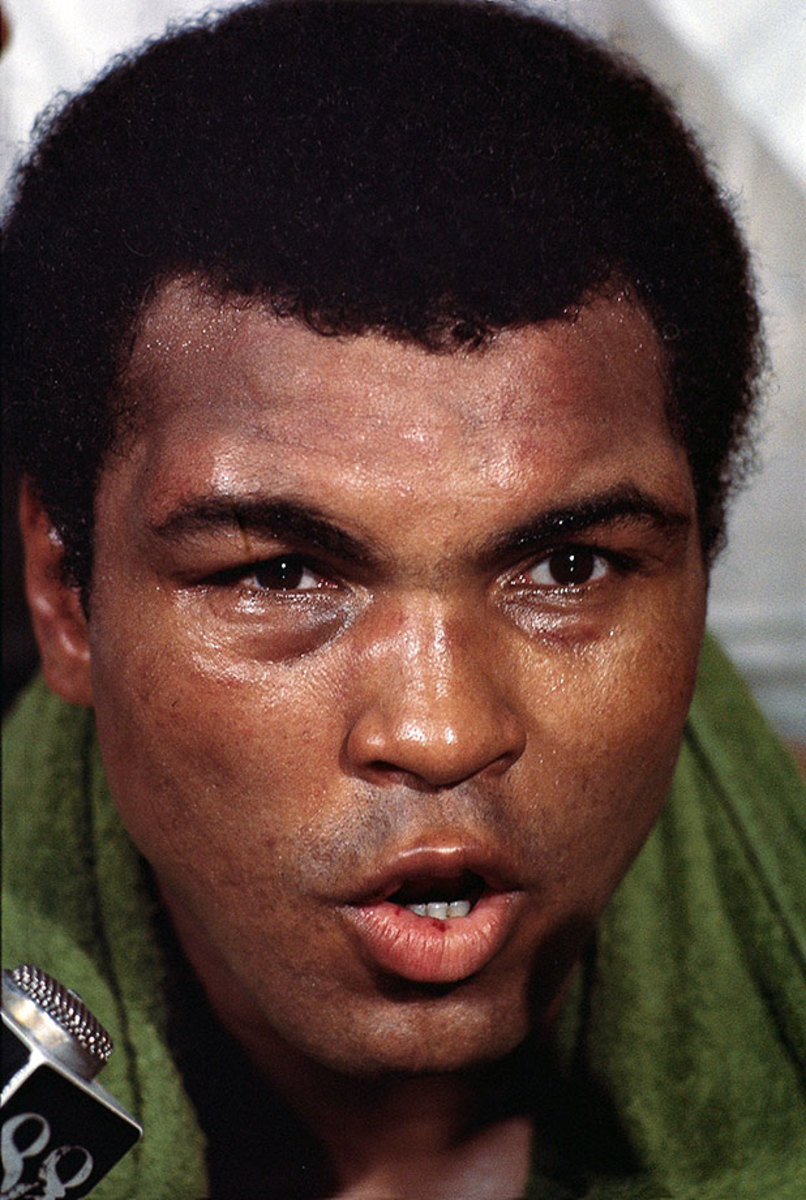
Ali speaks to the press after winning the Thrilla in Manila bout with Frazier.
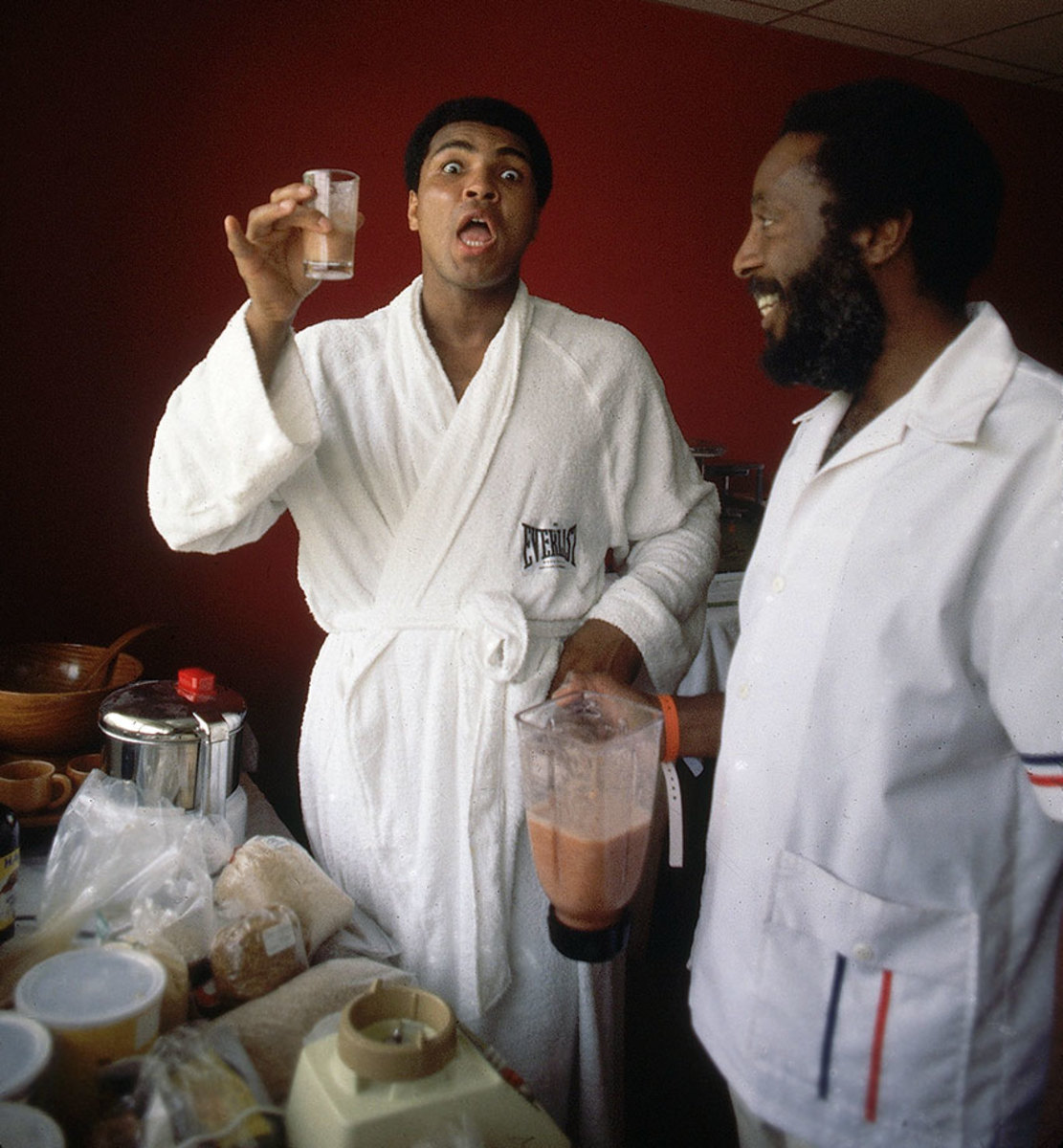
Ali holds a drinking concoction given to him by Dick Gregory, an advocate of a raw fruit and vegetable diet, in 1976.
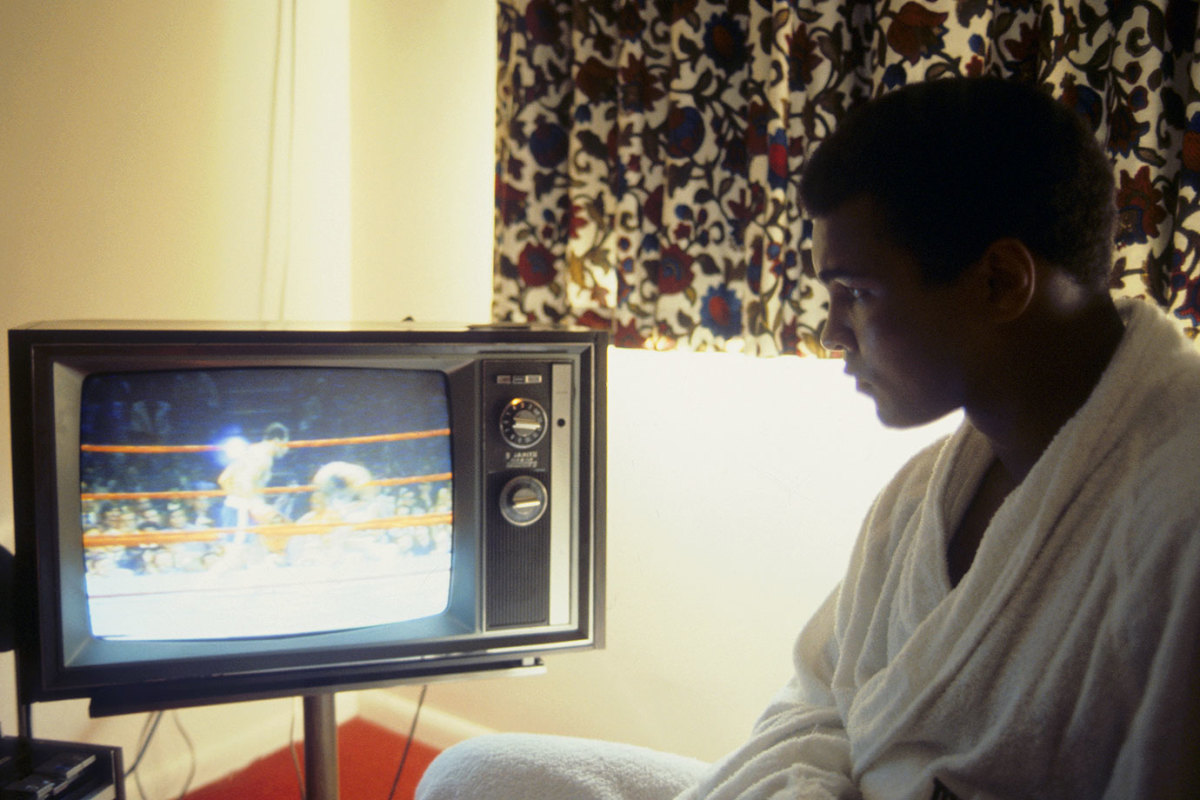
Before his 1976 fight against Ken Norton at Yankee Stadium, Ali watches a fight on television from his hotel room. A police strike at the time of the fight created a dangerous environment outside the stadium that all but eliminated walk-up sales.
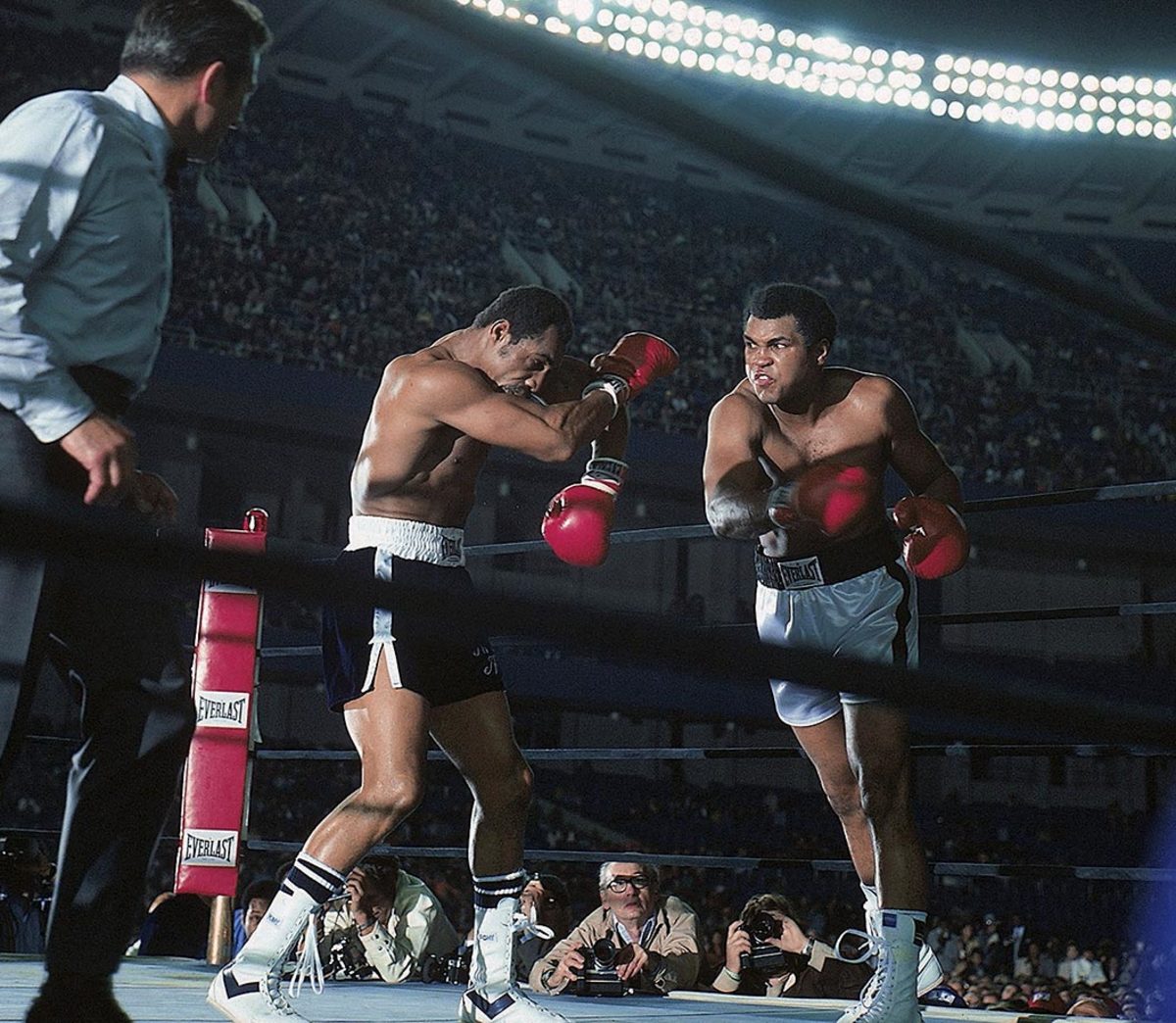
Norton takes a right hook during the heavyweight title fight against Ali. The bout, which Ali won by a unanimous, but controversial, decision, was the last boxing match at Yankee Stadium until 2010.
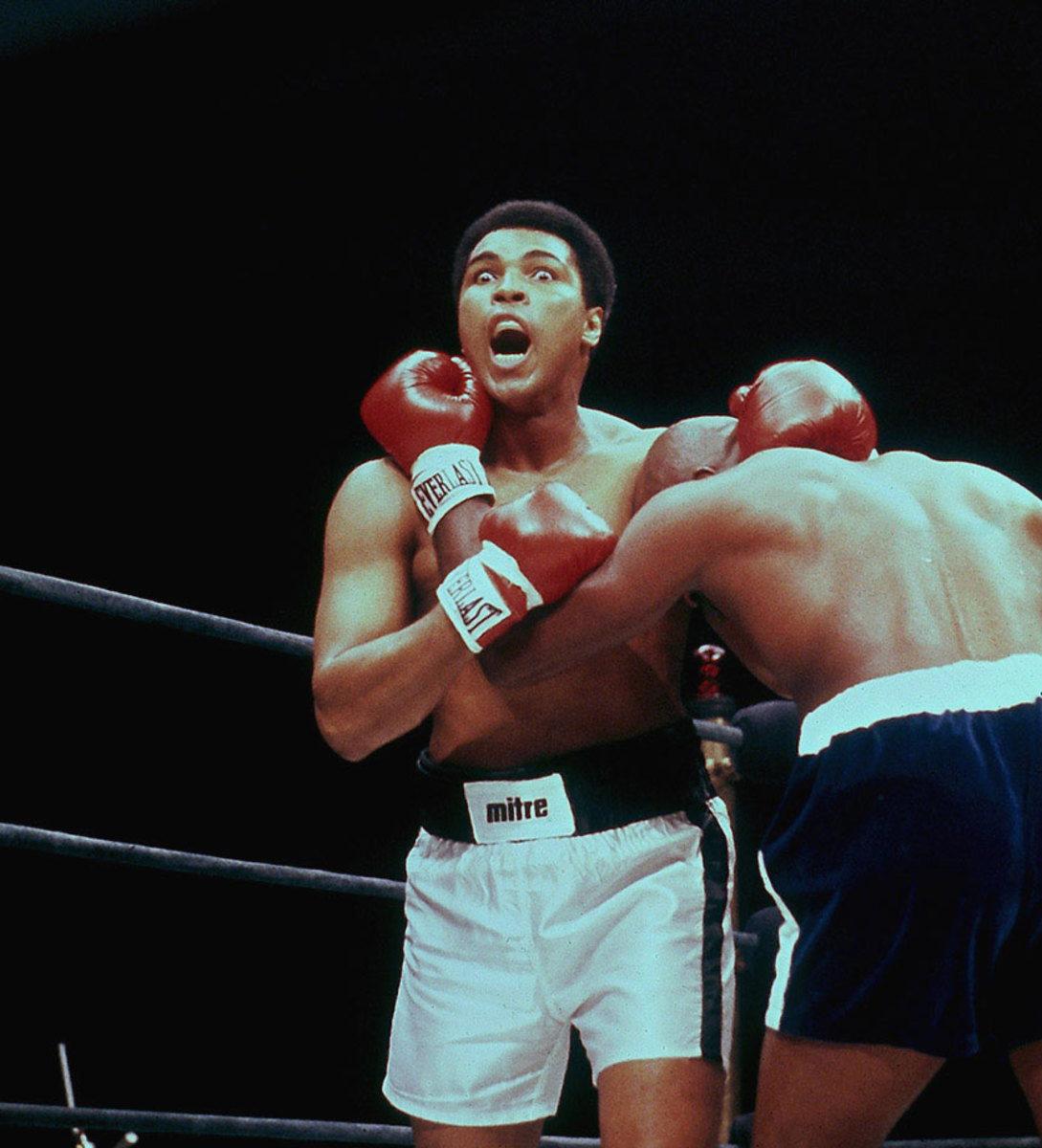
Ali makes a face during his fight with Earnie Shavers in 1977 at Madison Square Garden. Hurt badly by Shavers in the second round, Ali rebounded and outboxed Shavers throughout to build a lead on points before Shavers came on again in the later rounds. Seemingly exhausted going into the 15th and final round, Ali remained victorious by producing a closing flurry that left Shavers wobbling at the bell and the Garden crowd once again in delirium over his Ali magic.
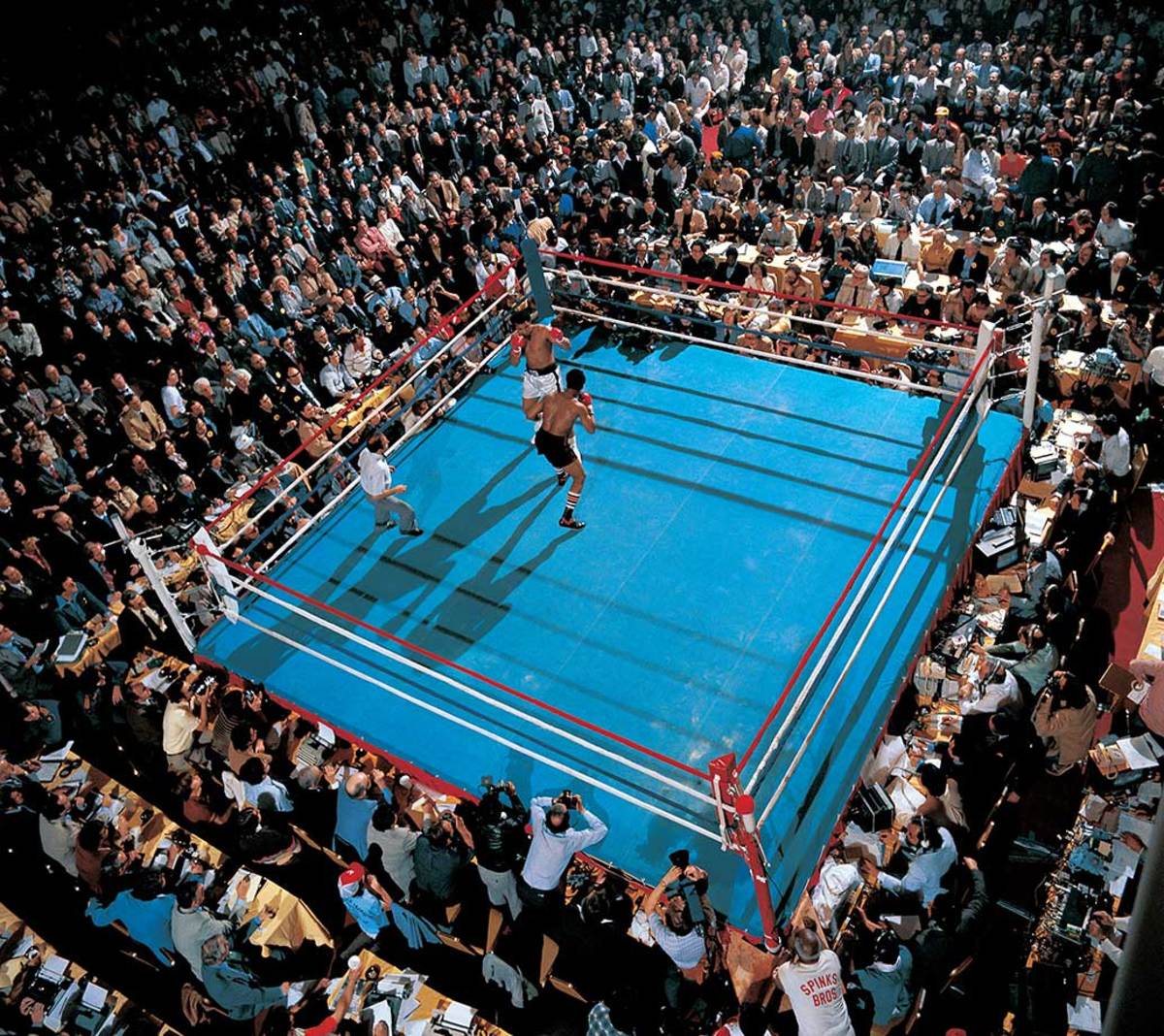
Ali squares off with Leon Spinks at the Las Vegas Hilton Hotel in February 1978. Spinks won the fight in a split decision, ending Ali's 3.5-year reign as the heavyweight champion. It was the only time in Ali's career that he lost his championship title in the ring.
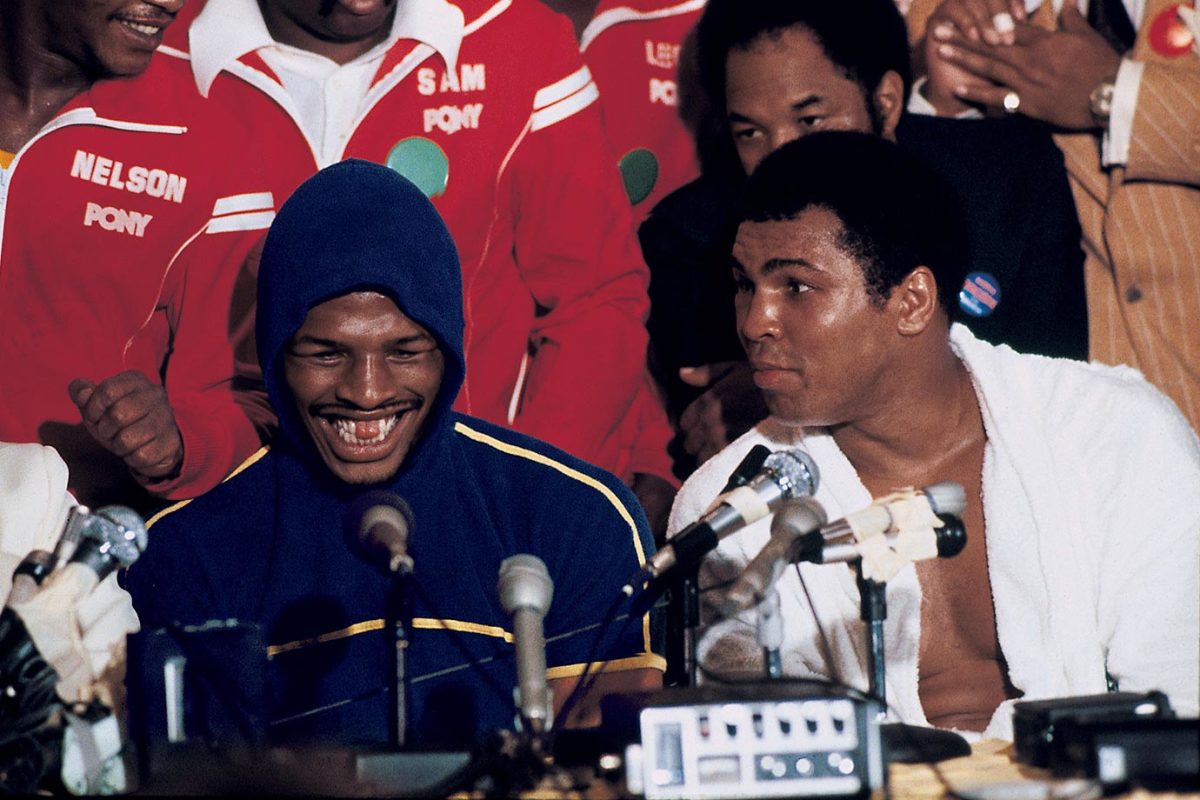
Leon Spinks took center stage over Ali at the press conference after their fight. The victorious Spinks and his gap-toothed grin were featured on the Feb. 19, 1978 cover of Sports Illustrated.
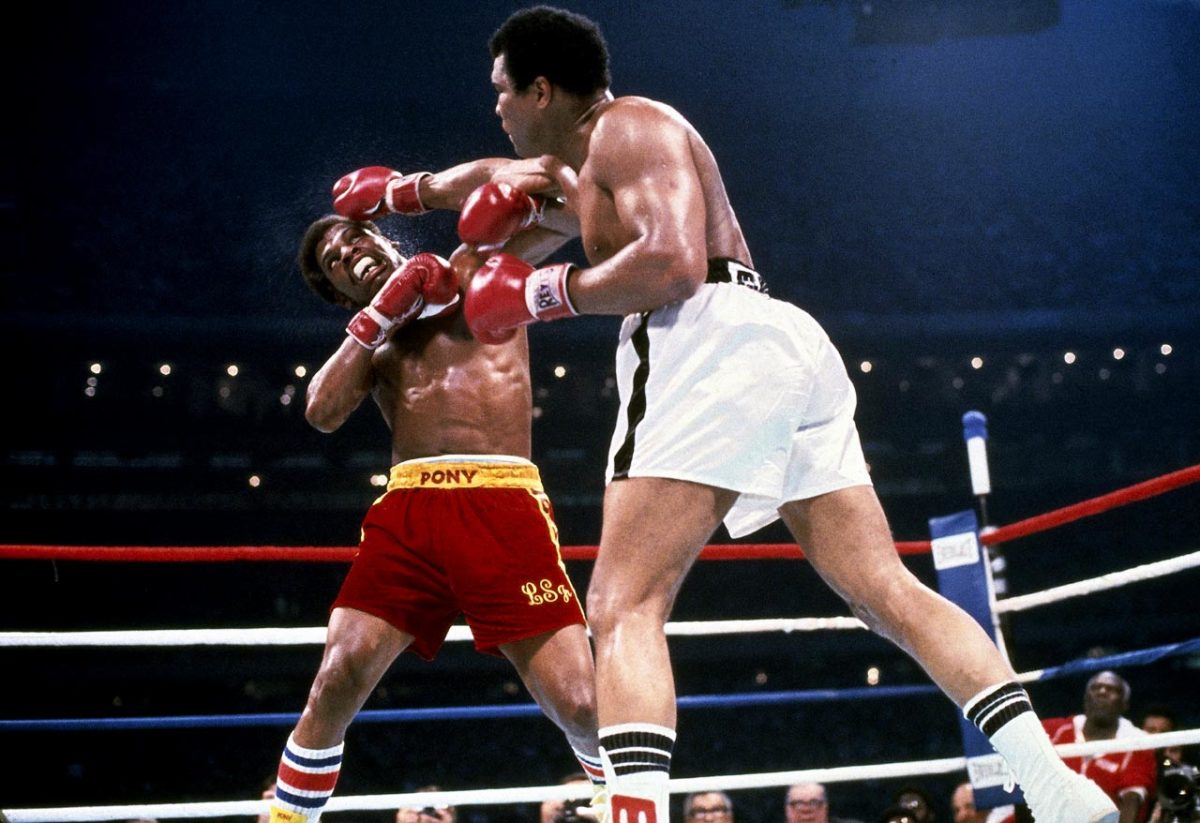
Ali lands a straight right hand to the head of Spinks in the rematch of their title bout in 1978. Ali won on a 15 round decision.
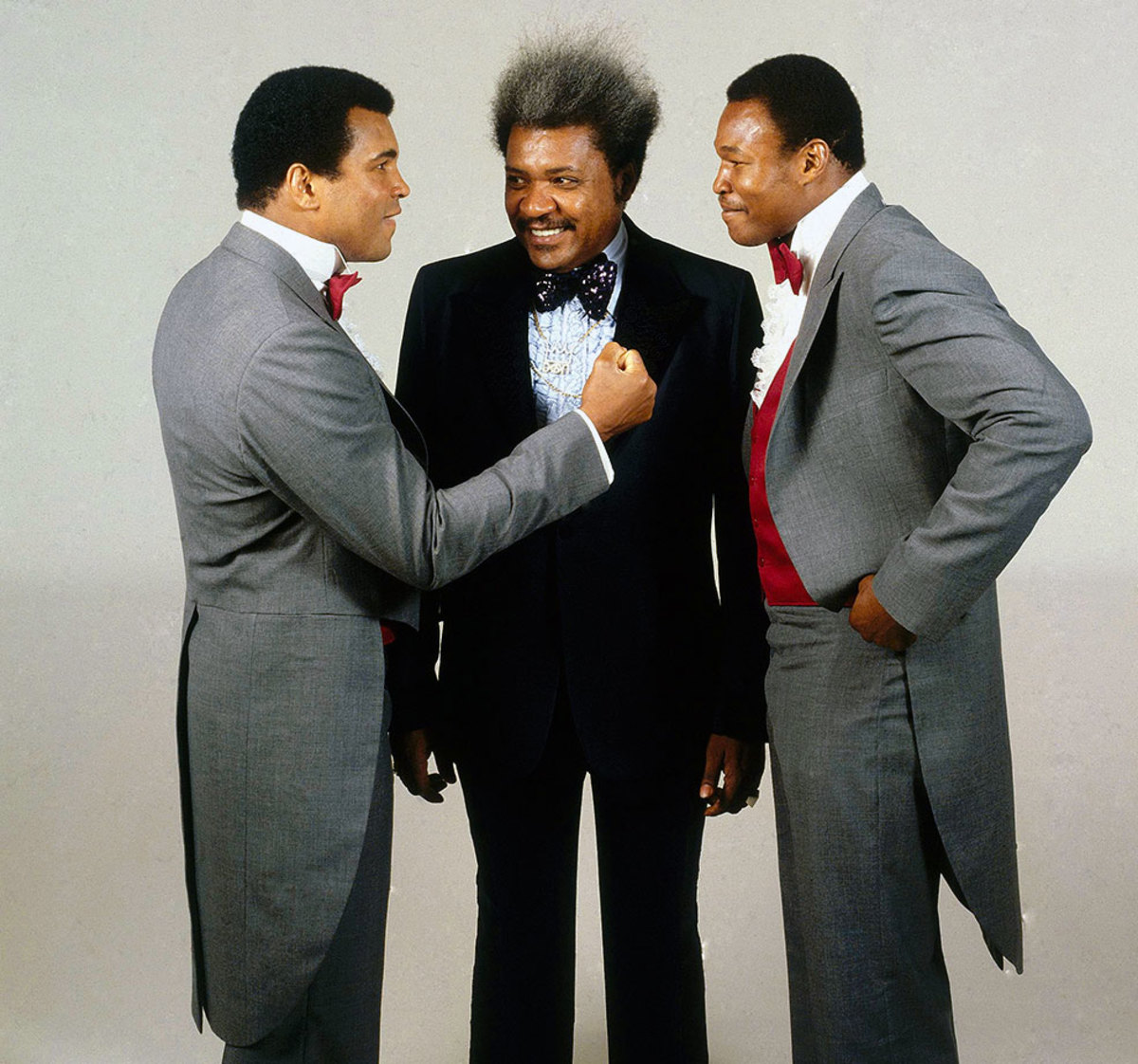
Don King pulled the strings again when Ali faced Larry Holmes before their November 1980 fight. King became a key figure in Ali's career, promoting his biggest fights, the Thrilla in Manila and the Rumble in the Jungle.
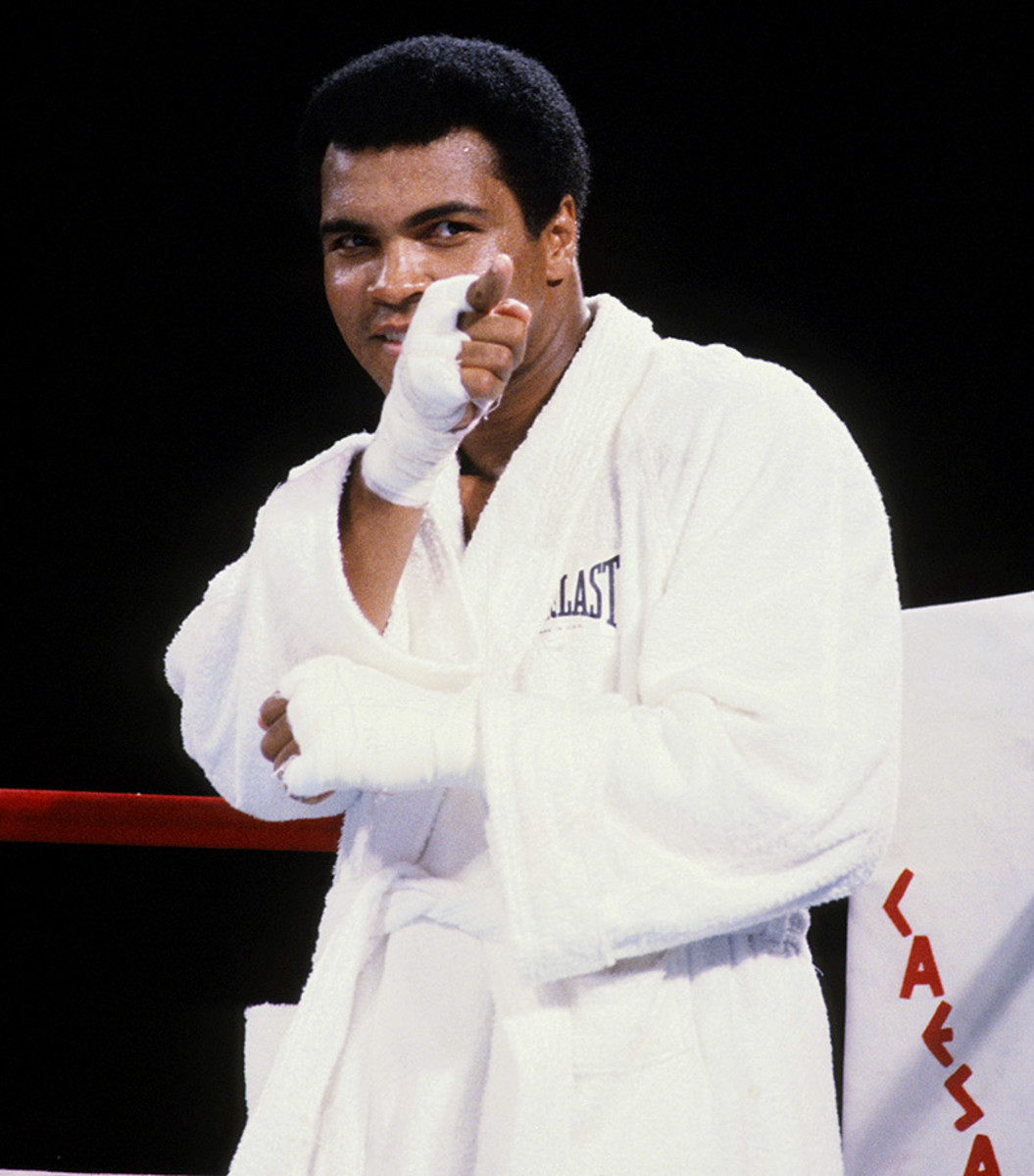
Ali points at Larry Holmes before their bout at Caesars Palace in 1980.
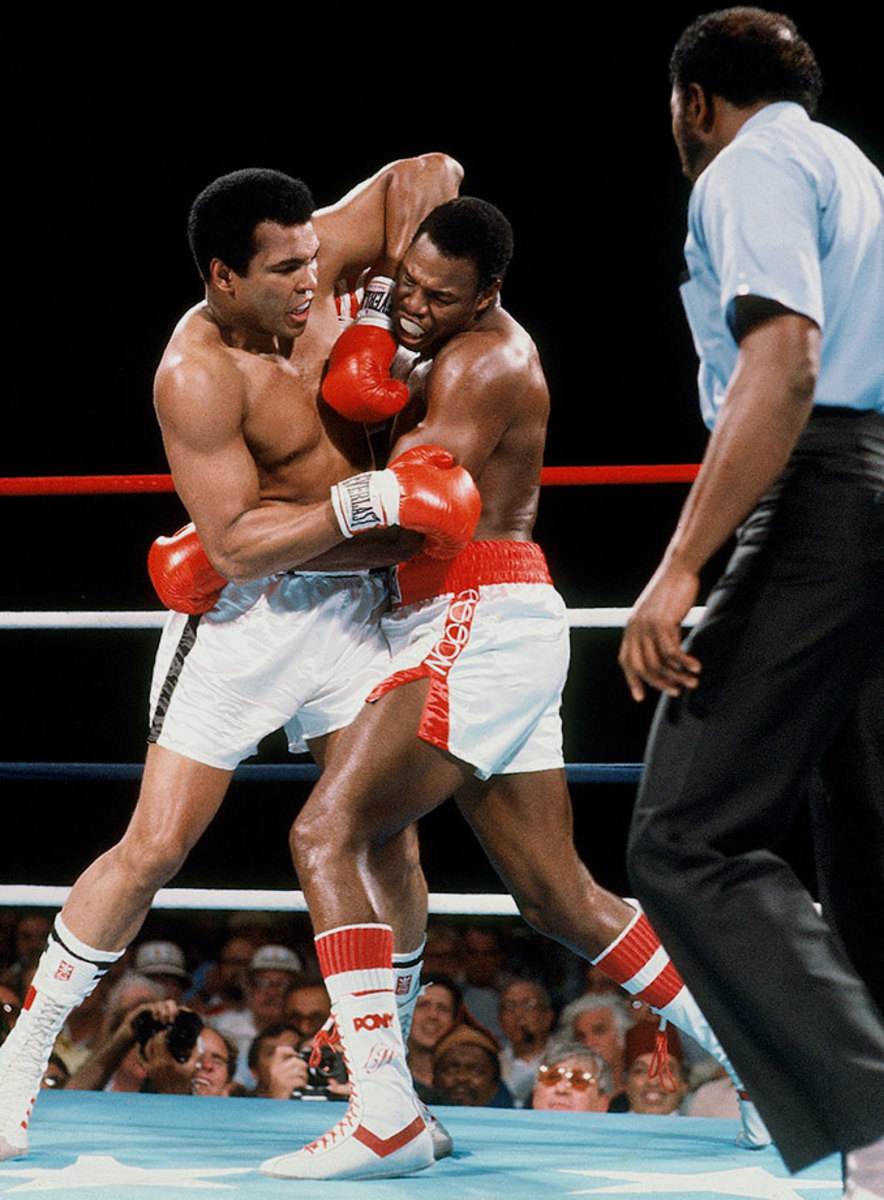
Ali grapples with Holmes during their bout in 1980. Trainer Angelo Dundee stopped the fight in the 11th round, marking the fight as Ali's only career loss by knockout.
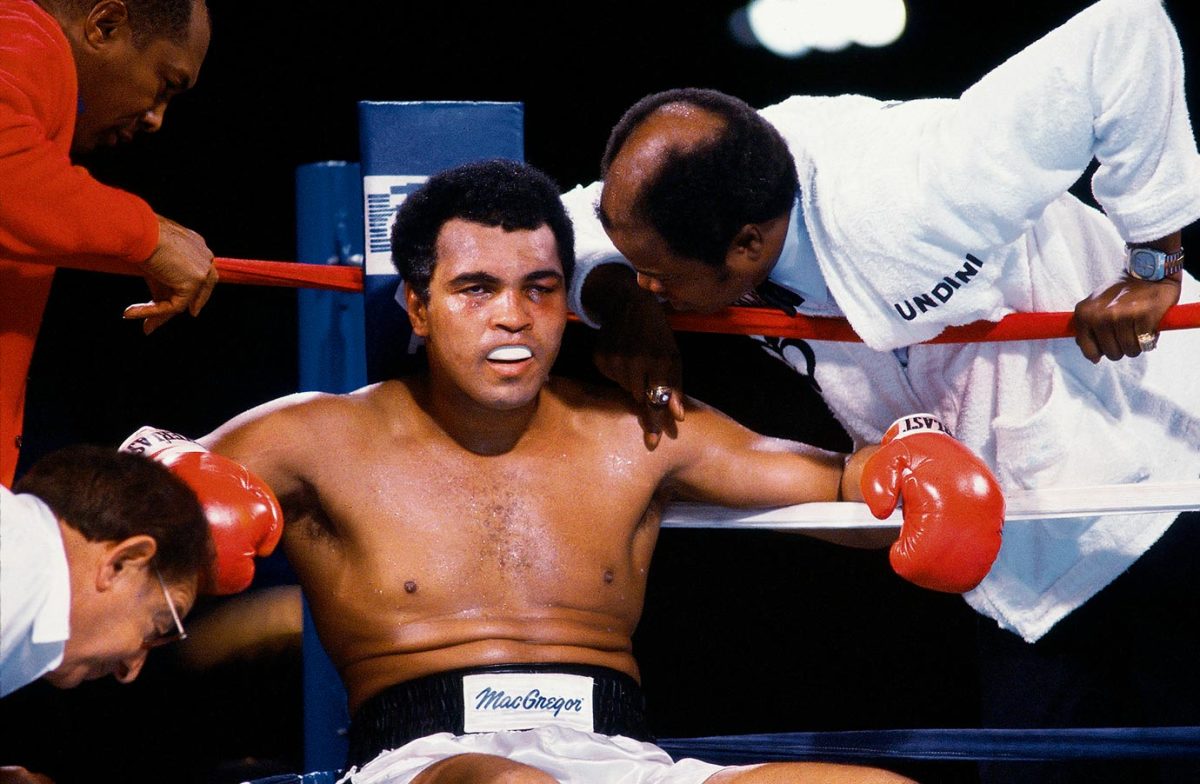
Drew Bundini Brown leans in to speak to Ali, who returned to fight Holmes after a brief retirement. By this time, Ali had already begun developing a vocal stutter and trembling hands and taken thyroid medication to lose weight that left him tired and short of breath.
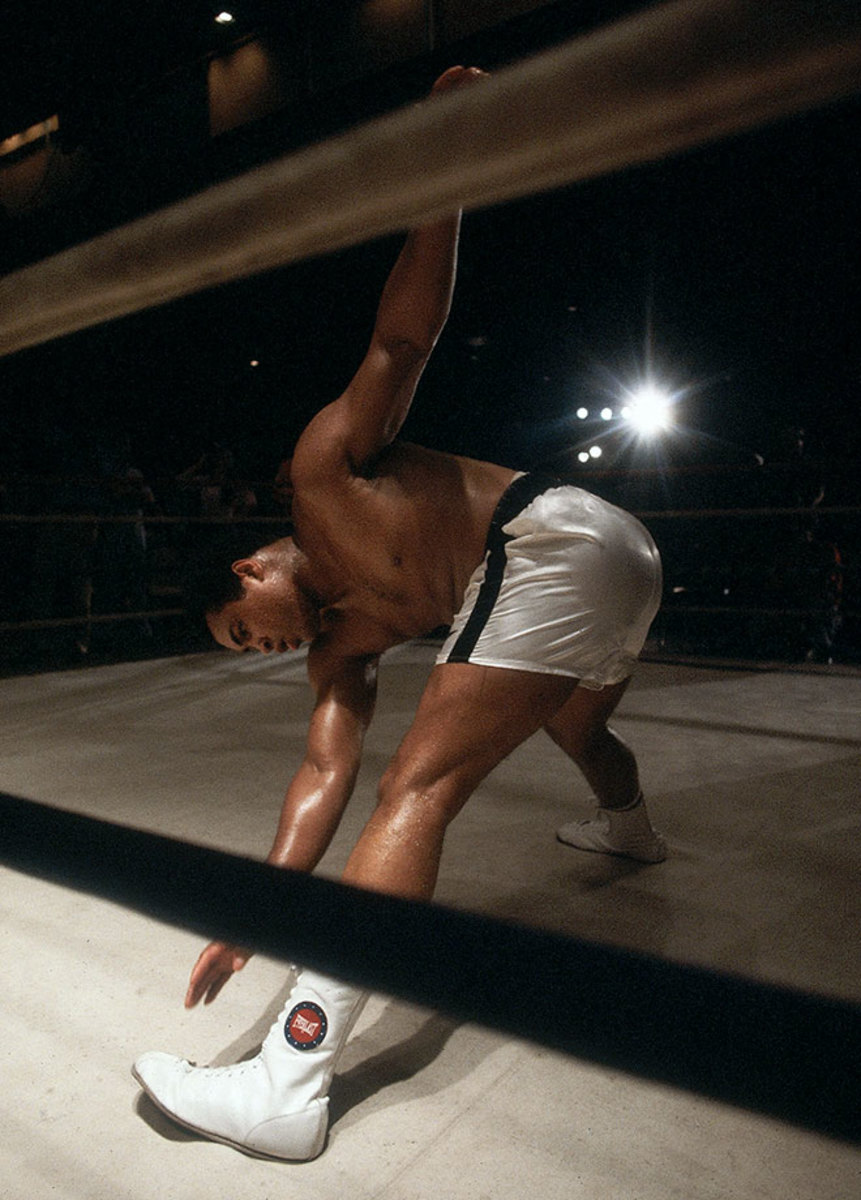
Ignoring pleas for his retirement, Ali stretches before a fight against Trevor Berbick in Nassau, Bahamas. Ali lost to Berbick in a unanimous decision and retired after the bout, the 61st of his career.
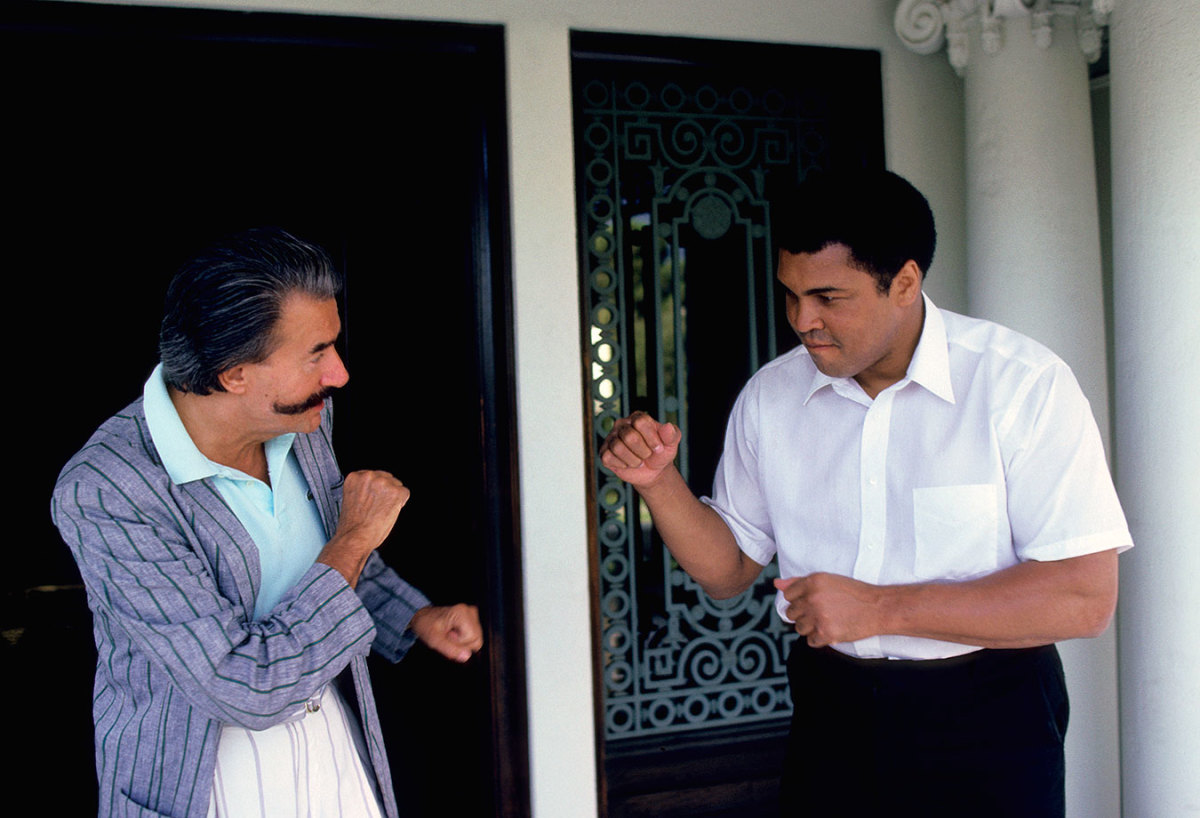
Ali pretends to spar with artist LeRoy Neiman at his home in Los Angeles. Neiman met Ali in 1962 and made many paintings and sketches from throughout Ali's life.
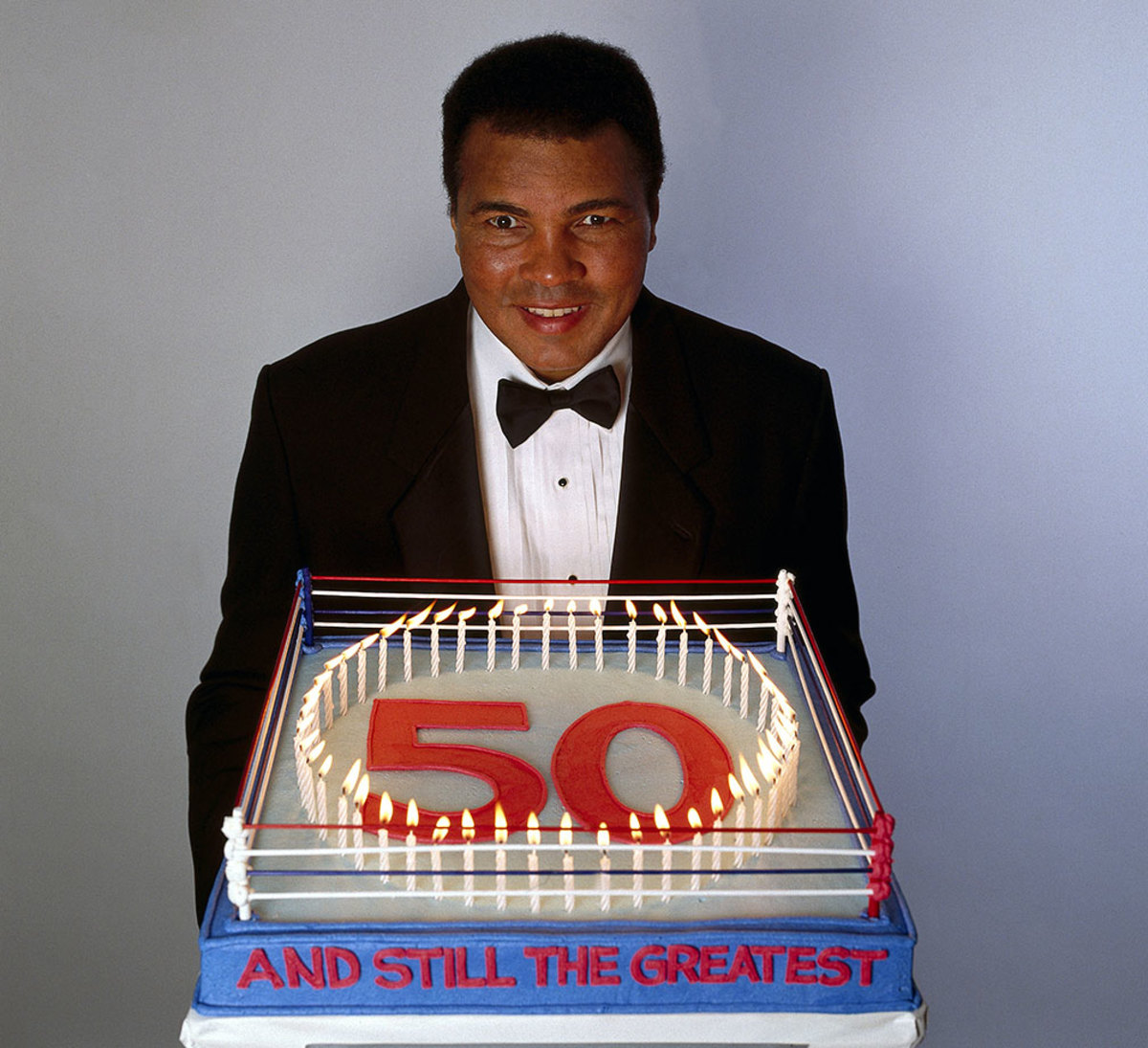
Cake in hand, Ali poses for a 50th birthday portrait in 1991. Although diagnosed with Parkinson's syndrome seven years earlier, Ali was still active, traveling to Iraq during the Gulf War to meet with Saddam Hussein in an attempt to negotiate the release of American hostages.
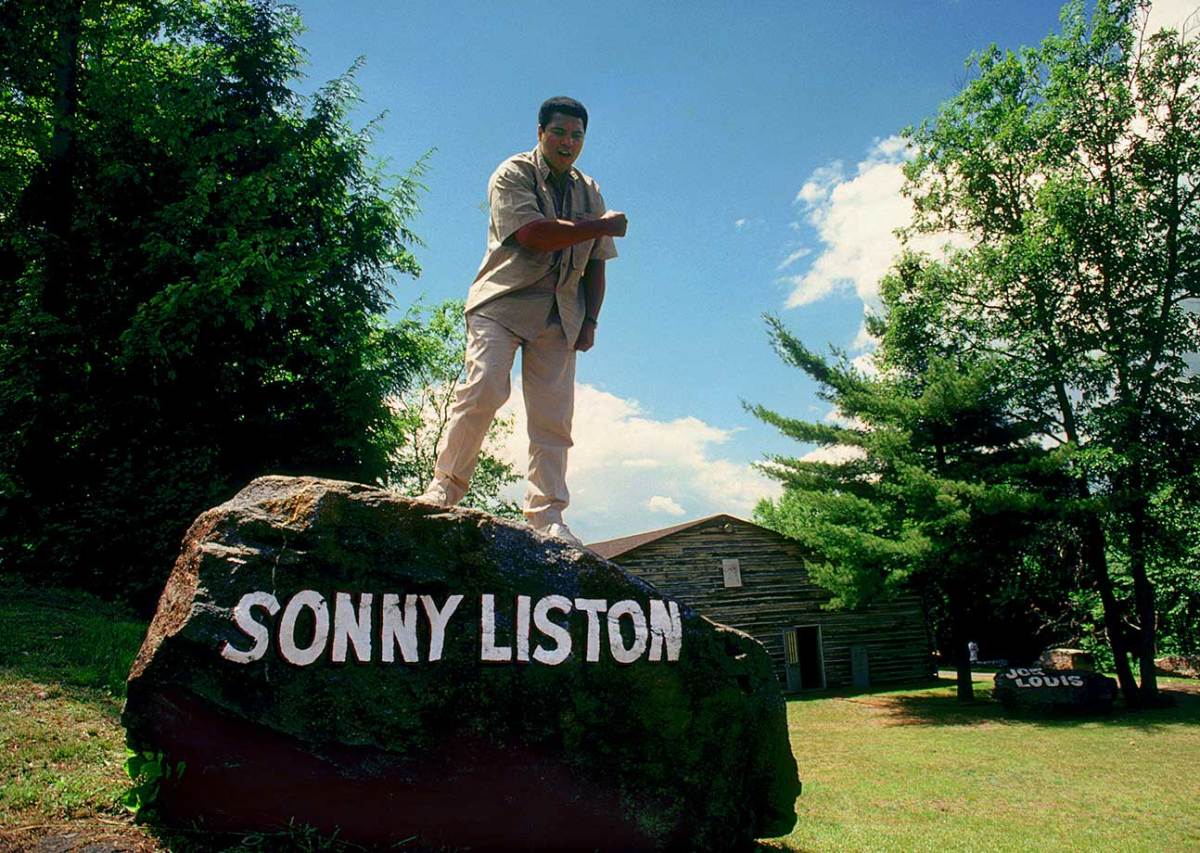
The same year, Ali stands atop of the Sonny Liston rock at his old training camp cabin. Ali and his father painted the names of famous boxers he admired on 18 boulders at the camp.
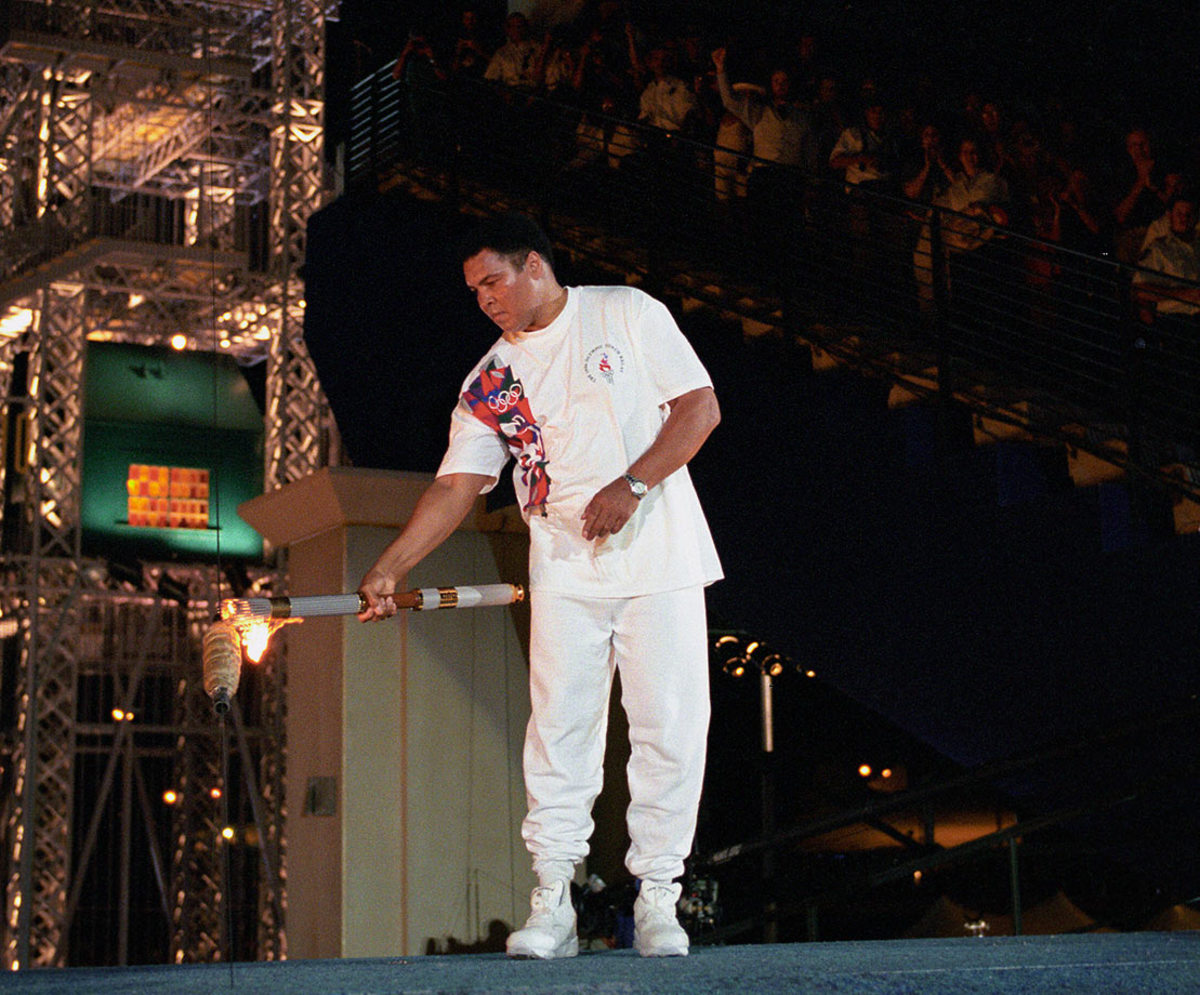
Ali carries the Olympic torch inside Centennial Olympic Stadium at the 1996 Atlanta Olympics. Despite trembling hands, Ali had the honor to light the Olympic flame in the stadium.
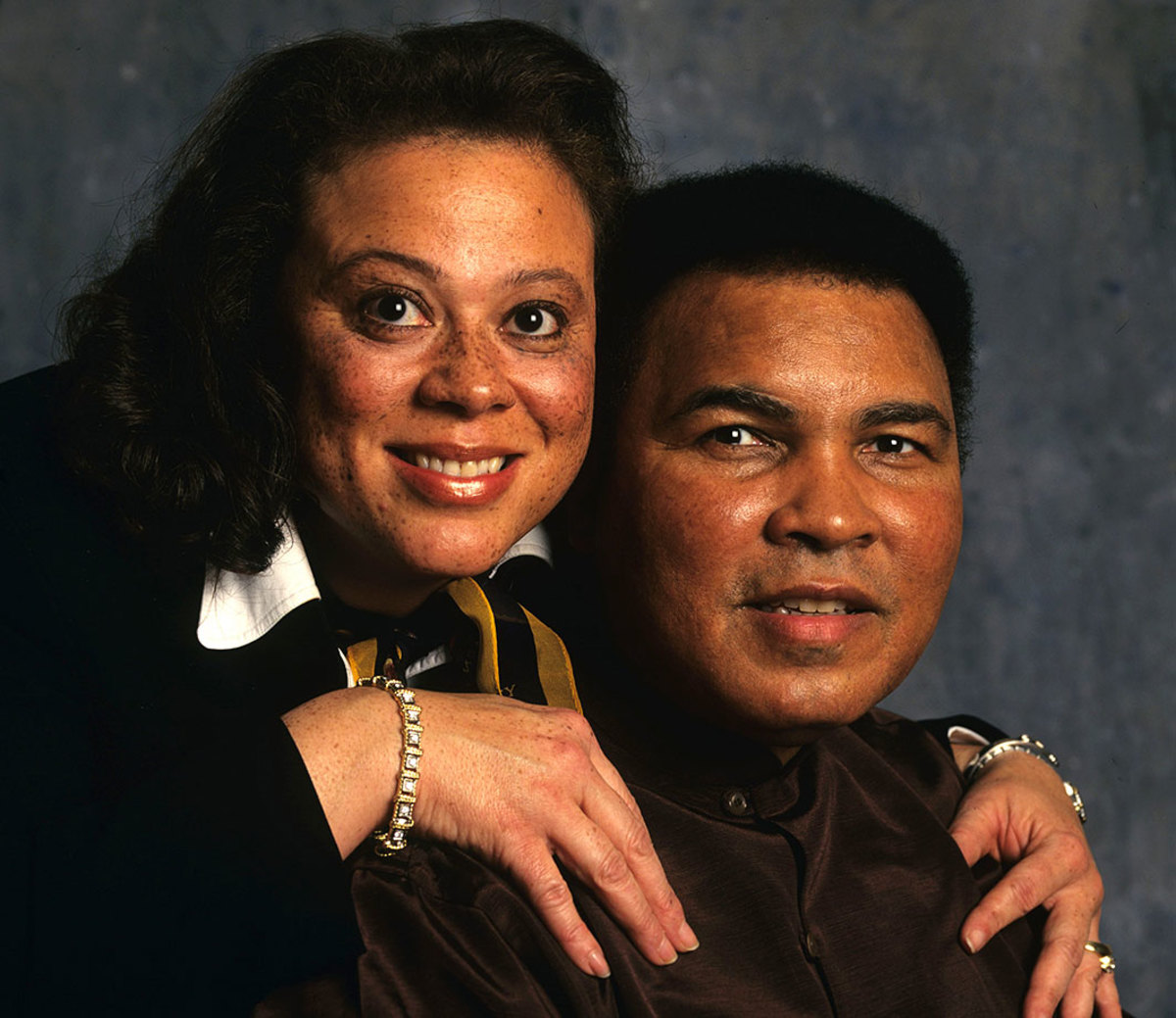
Husband and wife pose for a portrait during a photo shoot in 1997. Muhammad and Lonnie married in 1986 and have an adopted son together, Asaad Amin Ali.
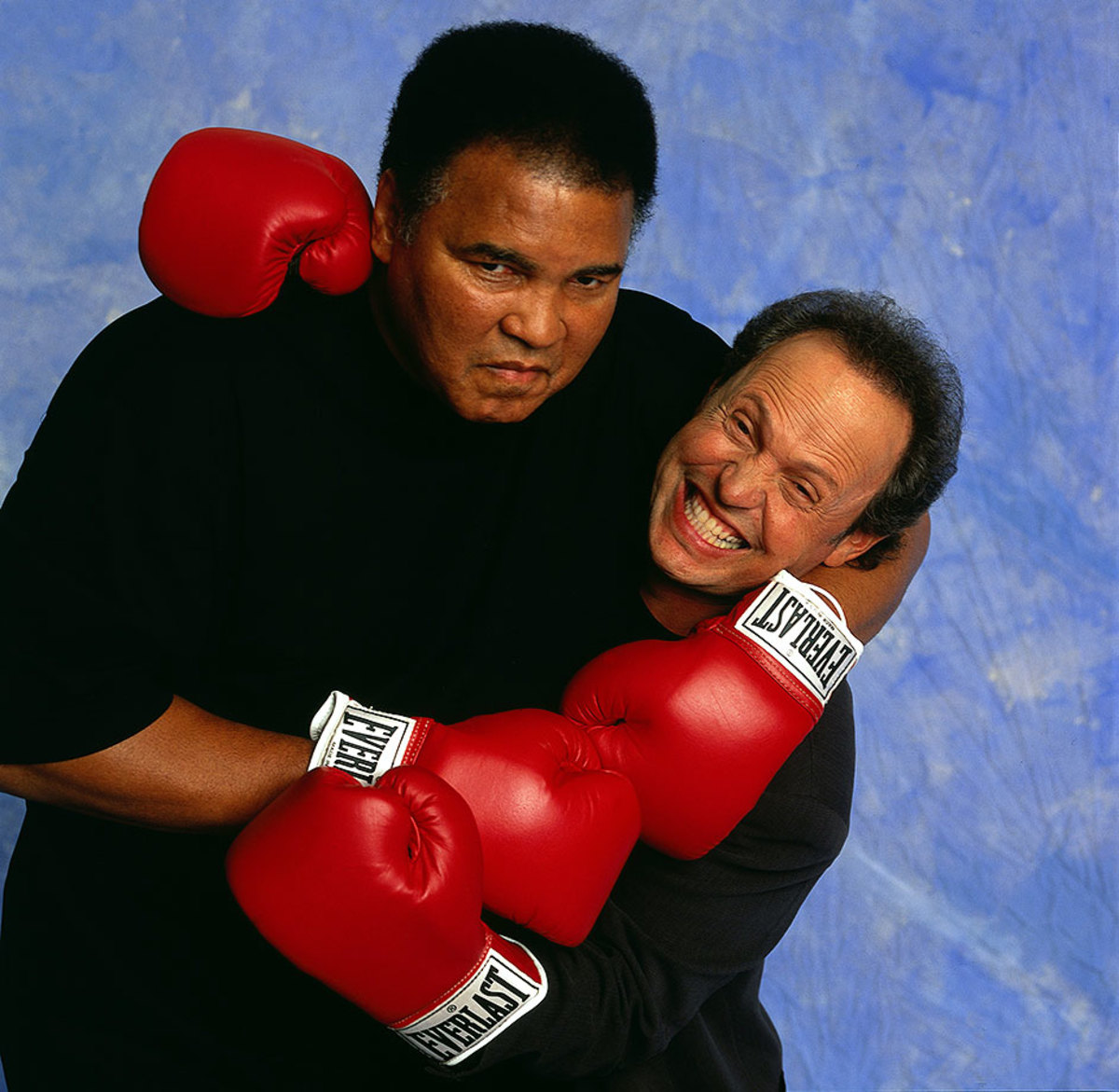
Ali messes around with actor Billy Crystal during a photo shoot in 2000. Crystal's impression of Ali was notorious, and he performed at a tribute to the boxer on his 50th birthday in December 1991.
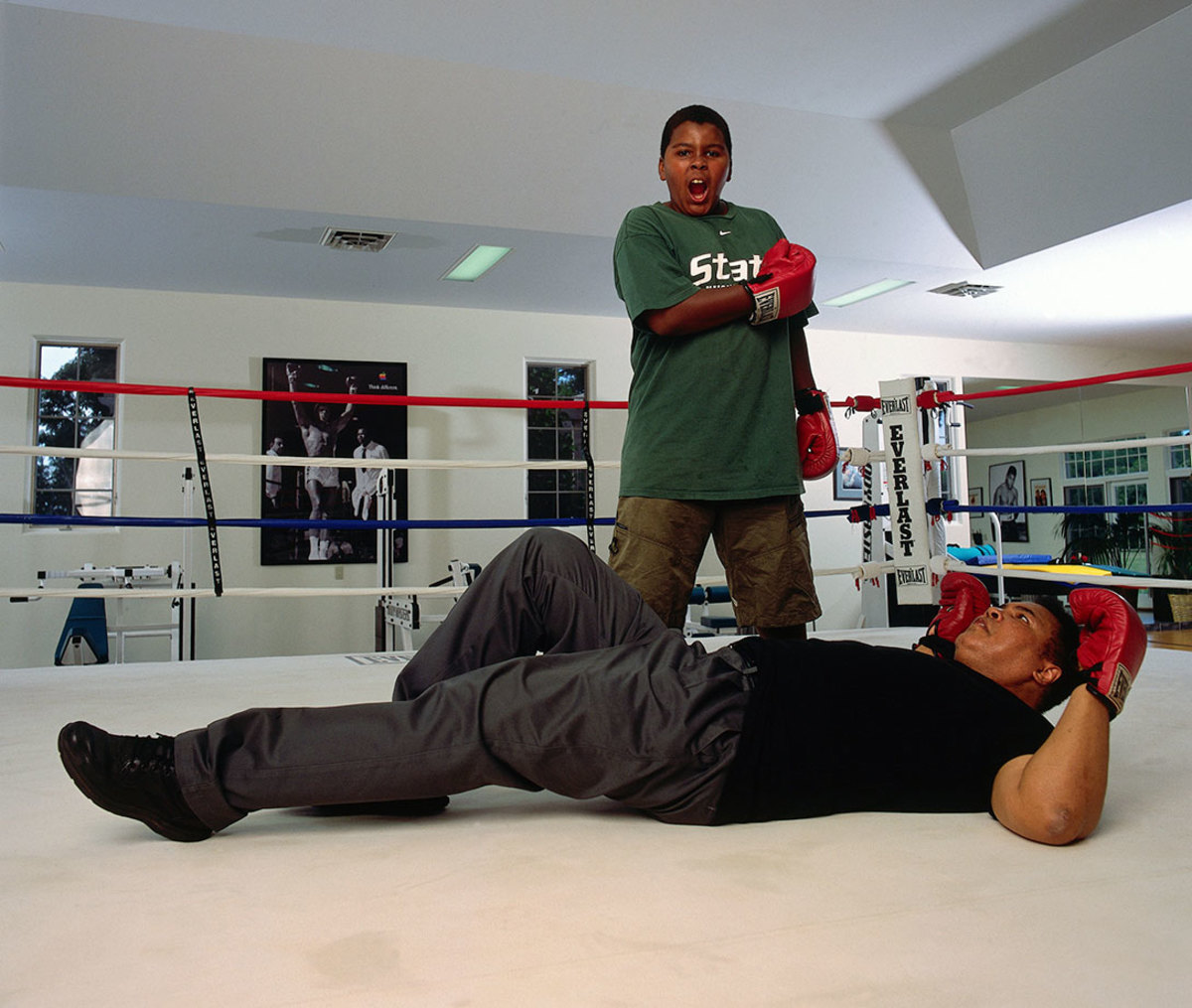
Ali lies on the canvas as his son, Assad Amin Ali, stands over him invoking memories of Ali's victory over Sonny Liston during a photo shoot in the gym at his farm on Kephart Road near Berrien Springs in 2001.
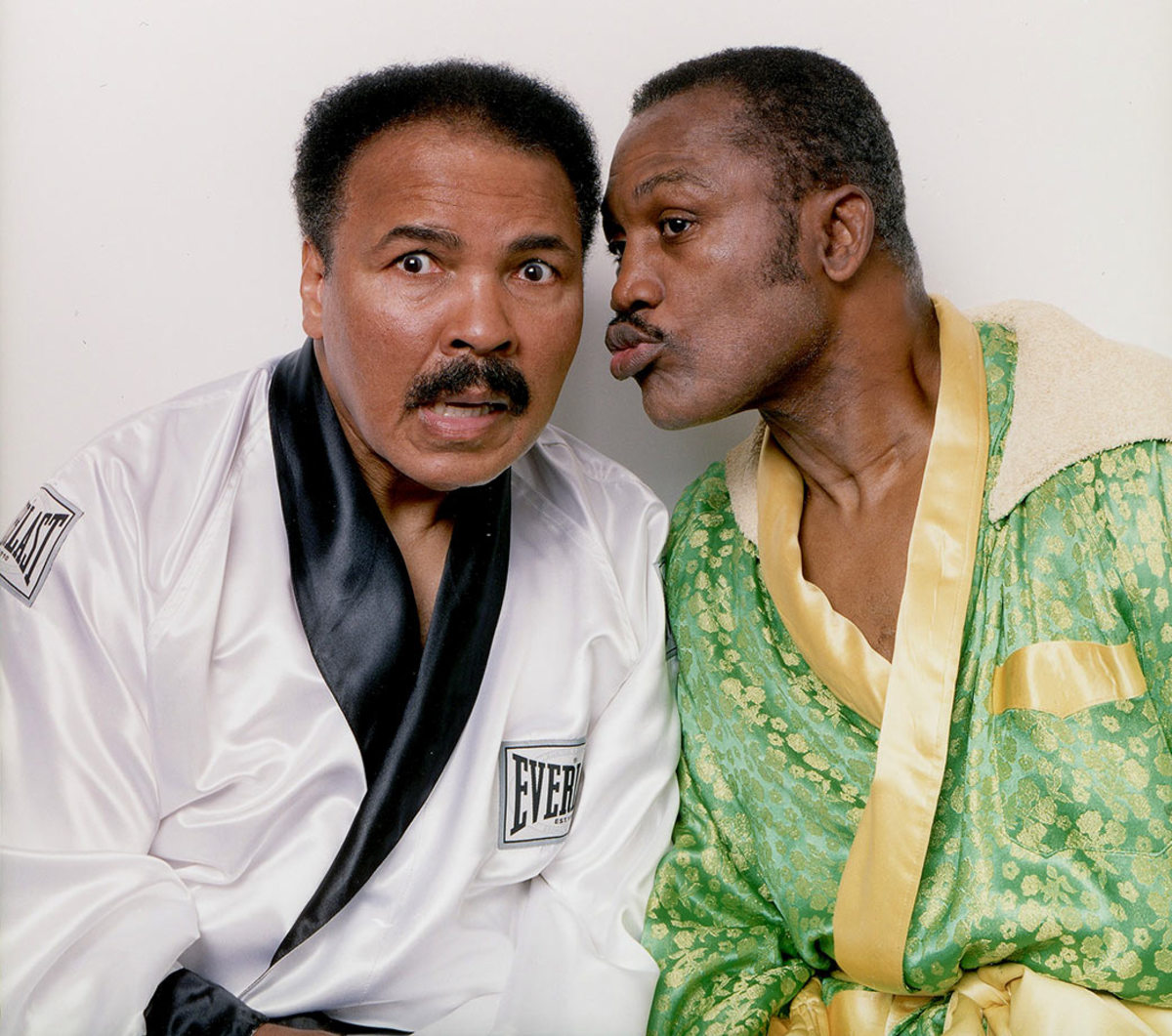
Fierce rivals in the ring, Ali and Joe Frazier pose for a portrait in the boxing robes they wore the night of their first bout at Frazier's Gym in 2003. Ali said after Frazier's death in 2011 that he was "a great champion."
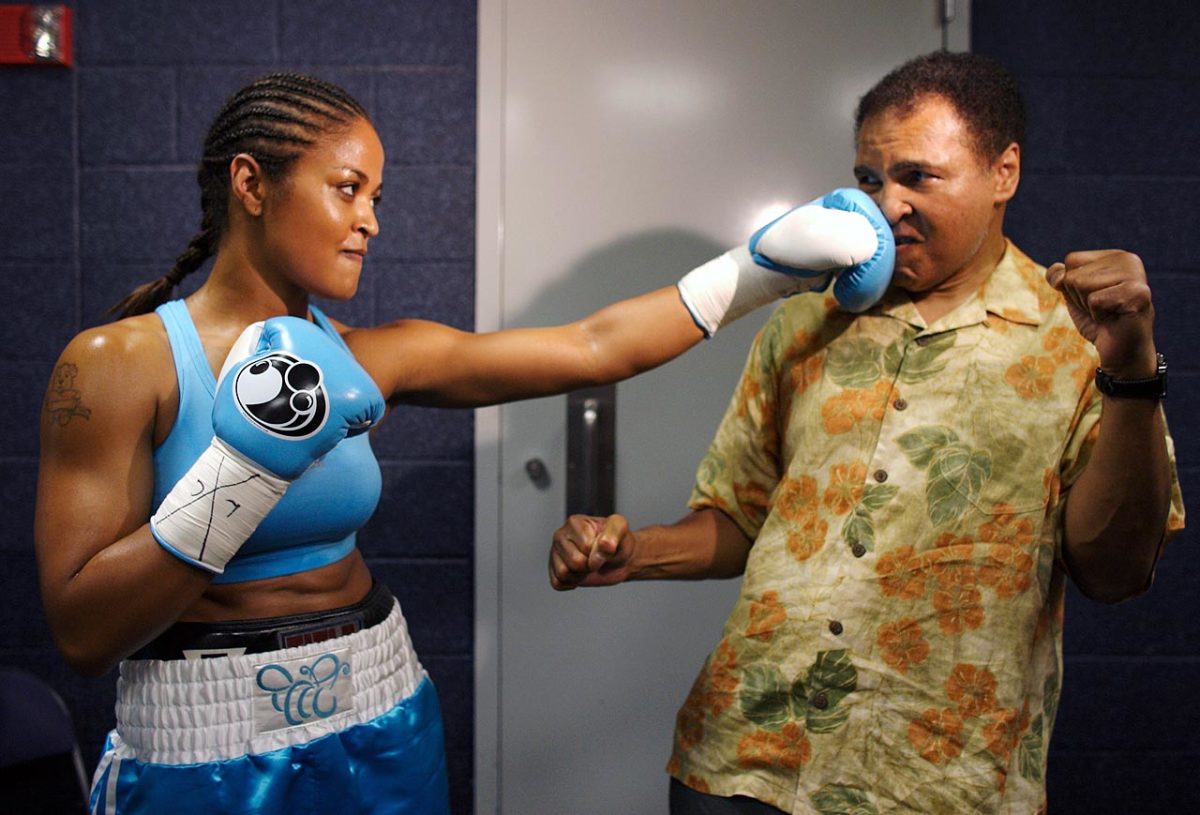
Ali takes a punch from his daughter Laila Ali while sparring before her fight against Erin Toughill in 2005. Laila retired from her own successful boxing career with a professional record of 24-0.
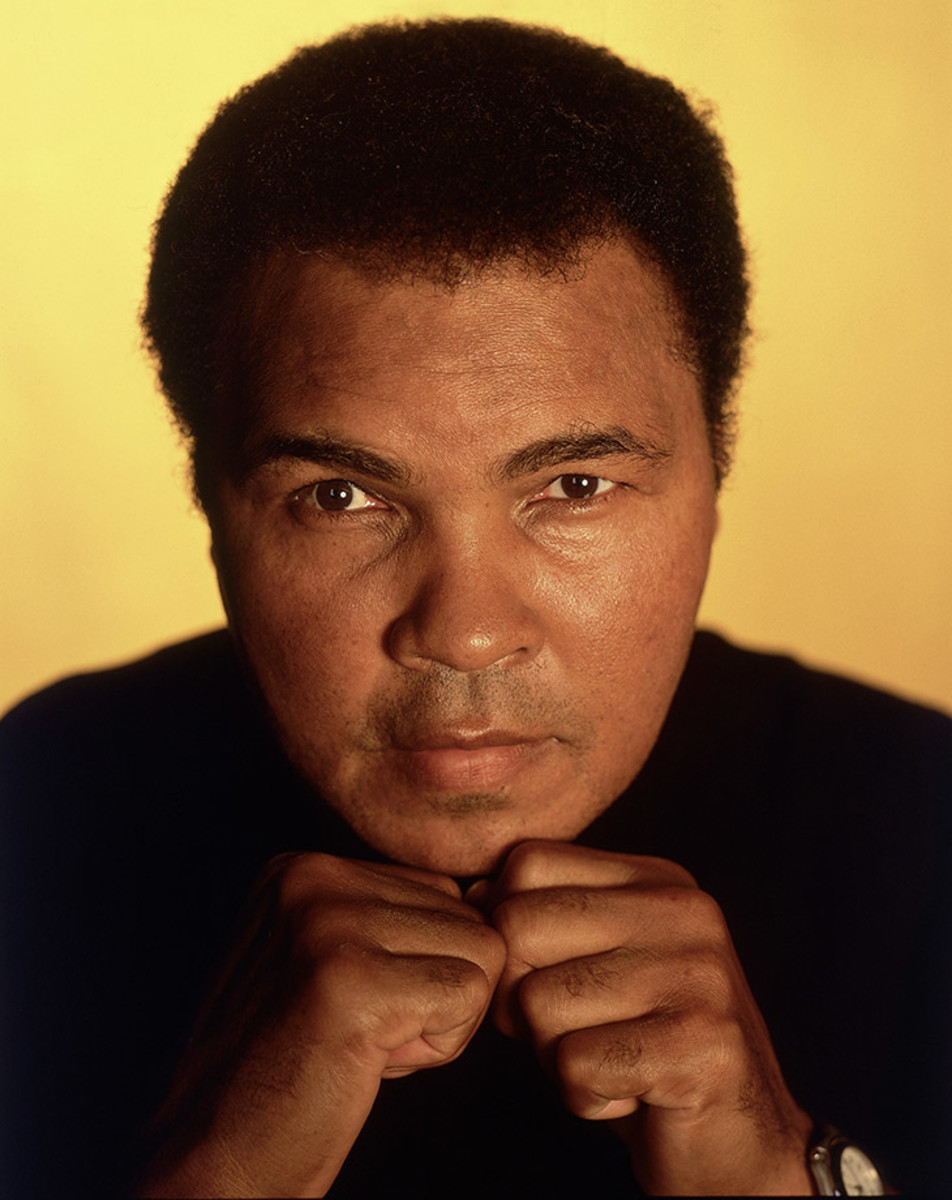
Ali poses with his fists up for a portrait in 2005.
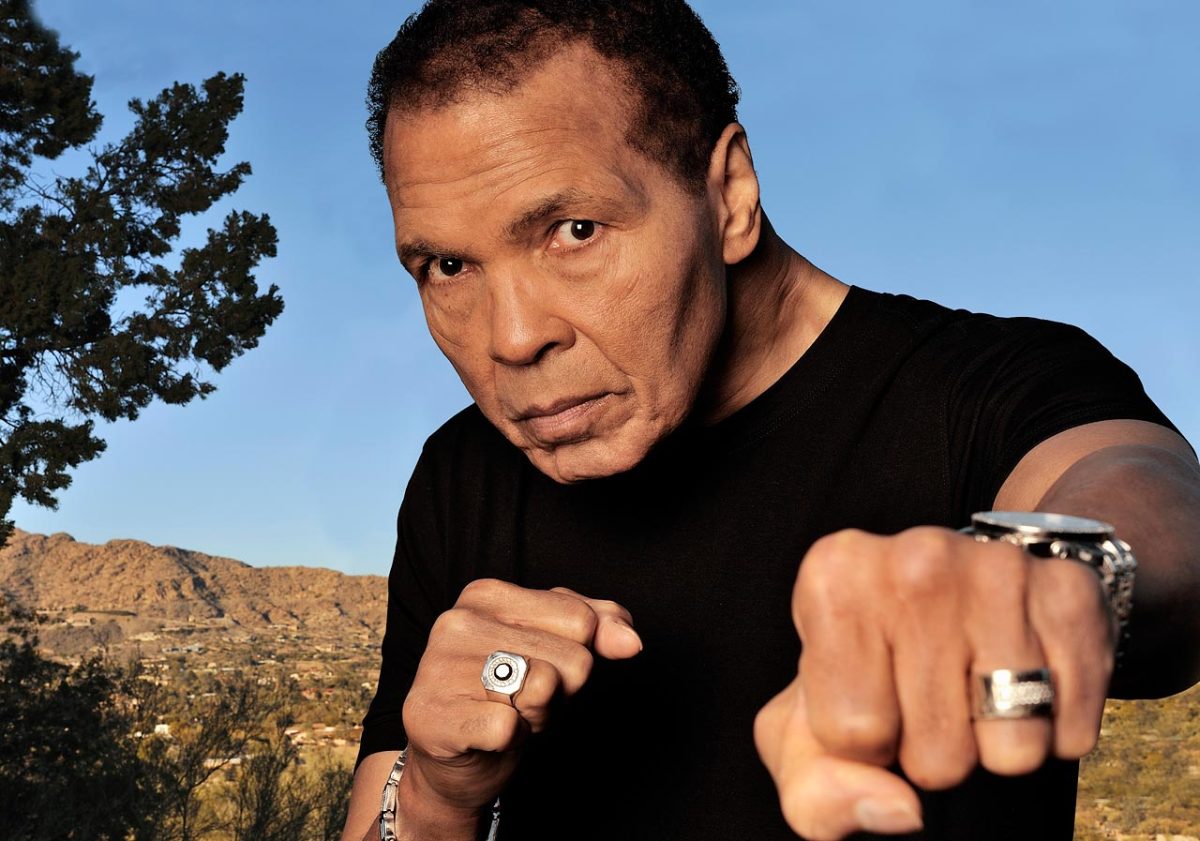
Ali poses with an extended punch in a 2012 photo shoot at his home in Paradise Valley, Ariz., to mark his 70th birthday.
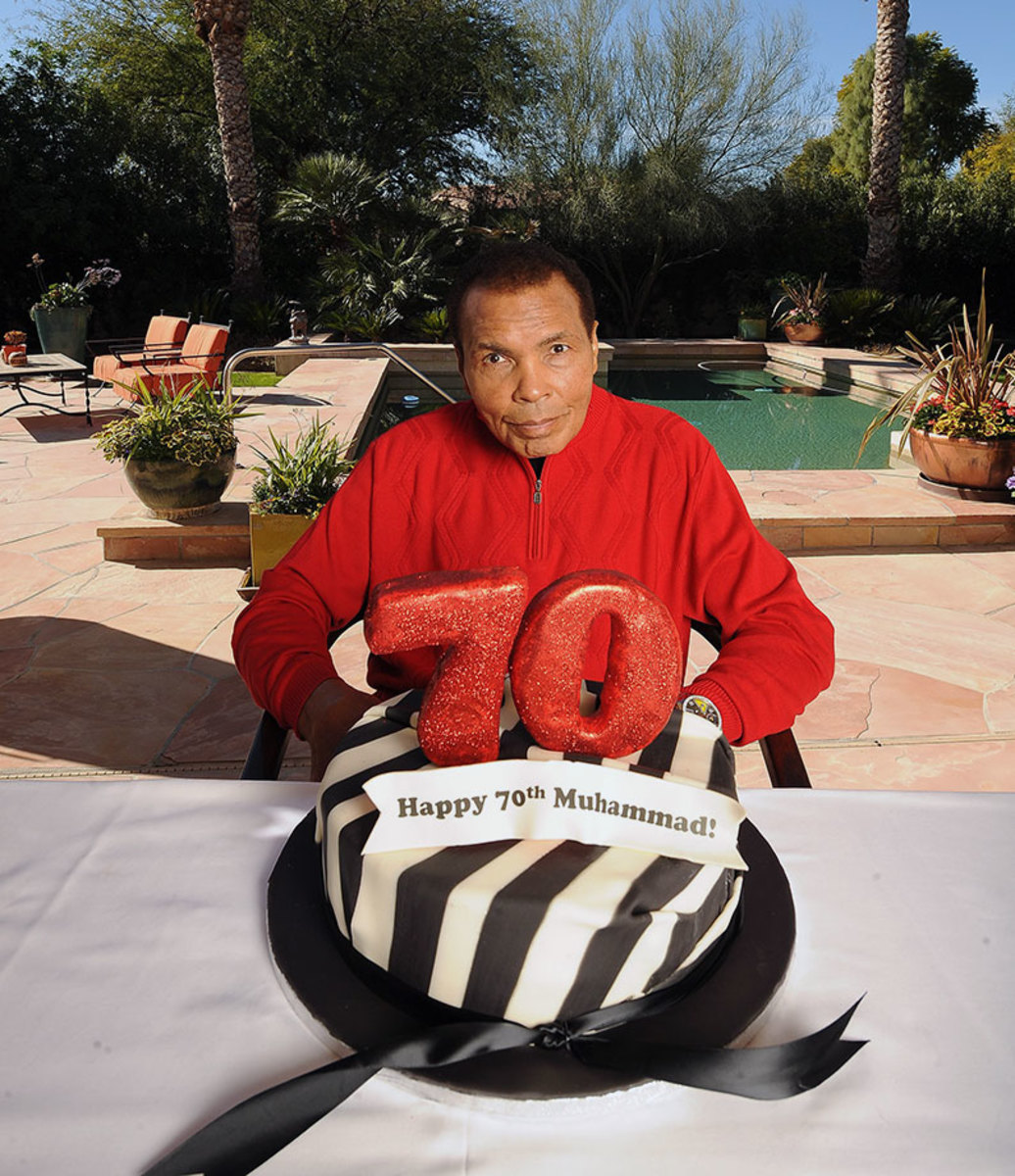
Ali sits in front of a 70th birthday cake in January 2012 at his Arizona home. Later that year he appeared at the opening ceremonies for the 2012 Olympics in London to escort the Olympic flag into the stadium, 52 years after he won gold in Rome.
